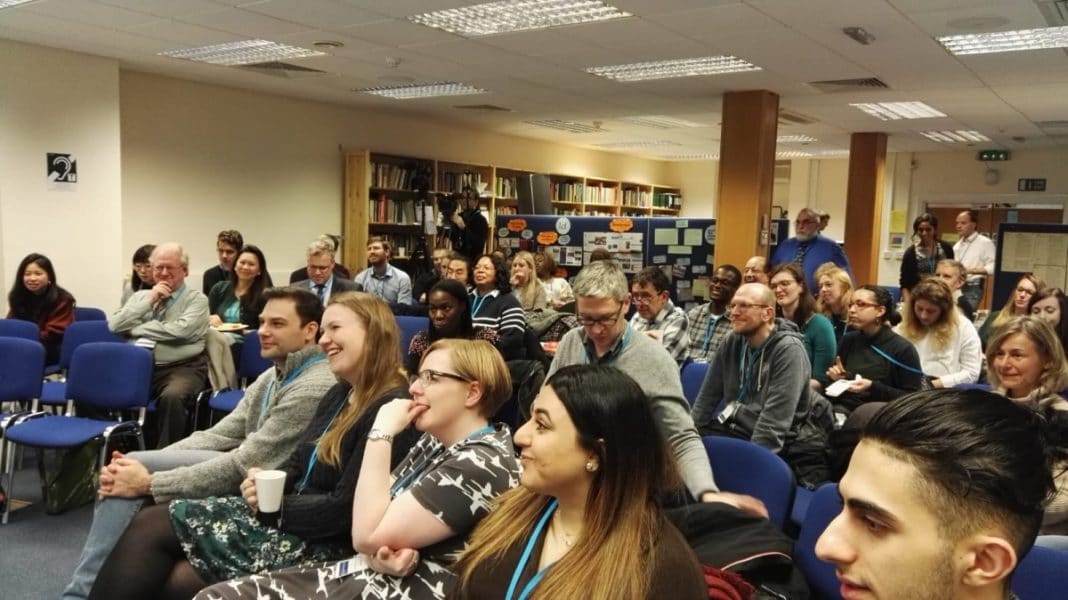
Dec 11, 2018 | Non categorizzato
Lawyers and legal students from different Christian churches meet to encourage each other to live out the Gospel in their professional life. “The gospel has profound implications for the legal world. The Lawyers’ Christian Fellowship exists to bring the whole Good News of Jesus Christ within the legal world” (LCF website). Founded in 1852, the LCF unites Christian lawyers from all around Britain, as well as forging international links among legal professionals. It promotes three main areas of action: to live according to the “law of the Gospel” in one’s daily life; to form young legal professionals; to be active on an international level. As part of this third aspect, the LCF held a conference in November entitled: “A lawyer after God’s own heart: Lessons from Psalm 119”, inviting representatives of the “Communion and Law” international network of legal professionals and students animated by the Focolare spirituality. Elisabetta Scomazzon and Pasquale De Rosa, consultants in the field of canon law, attended for “Communion and Law”. What was the main focus of this meeting of lawyers from different Christian Churches? Elisabetta Scomazzon – Faith was at the centre: the bond which links us together most strongly, even more than the legal profession itself. Meetings like this are particularly significant because starting from being united on a personal level, we move on to find ways ahead in the legal field, for example through a clear uncompromising commitment to defend the weakest in our societies. Through choices like this, those of us active in the legal system can contribute towards building relationships that are more constructive and “fraternal”.  During the conference, what points in common and what areas for future development in the legal field did you cover? Pasquale De Rosa –We have in common, above all, the shared commitment to witness to our Christian life in our profession. For example in the lawyer-client relationship and in the various environments a Christian lawyer works: to be authentic witnesses to the “good news” which every Christian carries within. Our work proceeds alongside that of our own Churches. What we have to do, is to collaborate together, starting from what Chiara Lubich called the “dialogue of life”, putting in common our experiences as legal professionals. For example, a pressing concern is that of human rights and how they are under threat in the current world situation. How can Christian lawyers and legal professionals contribute to peace and harmony within their own societies, in today’s climate characterized by divisive ideas and praxis? Elisabetta Scomazzon – Every nation and people has its own order and rules. The Law can actually be an instrument of communion which helps to find solutions to the urgent demands of our planet and to the cry of humanity subjected to injustice, exploitation and war. Christians of different churches finding solutions in the legal field does not need to be an utopian idea, but could be a great opportunity to give hope that unity is possible.
During the conference, what points in common and what areas for future development in the legal field did you cover? Pasquale De Rosa –We have in common, above all, the shared commitment to witness to our Christian life in our profession. For example in the lawyer-client relationship and in the various environments a Christian lawyer works: to be authentic witnesses to the “good news” which every Christian carries within. Our work proceeds alongside that of our own Churches. What we have to do, is to collaborate together, starting from what Chiara Lubich called the “dialogue of life”, putting in common our experiences as legal professionals. For example, a pressing concern is that of human rights and how they are under threat in the current world situation. How can Christian lawyers and legal professionals contribute to peace and harmony within their own societies, in today’s climate characterized by divisive ideas and praxis? Elisabetta Scomazzon – Every nation and people has its own order and rules. The Law can actually be an instrument of communion which helps to find solutions to the urgent demands of our planet and to the cry of humanity subjected to injustice, exploitation and war. Christians of different churches finding solutions in the legal field does not need to be an utopian idea, but could be a great opportunity to give hope that unity is possible.
Edited by the editorial team
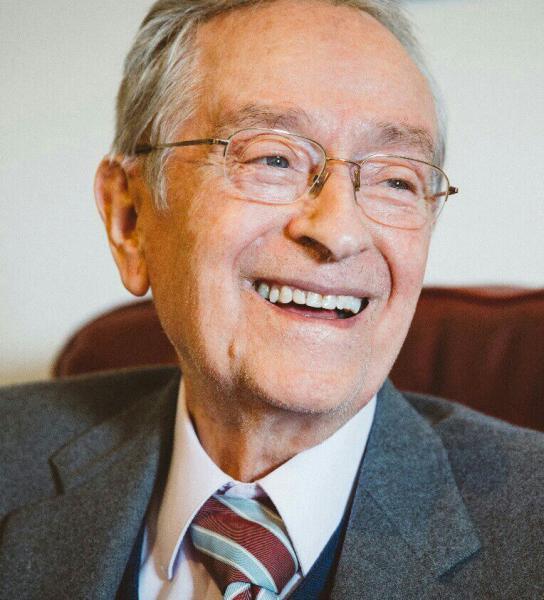
Dec 10, 2018 | Non categorizzato
During this time of political crisis, Igino Giordani and Tommaso Sorgi encourage us to work on all levels of society to bring democracy back to its very essence –that is to “we”. 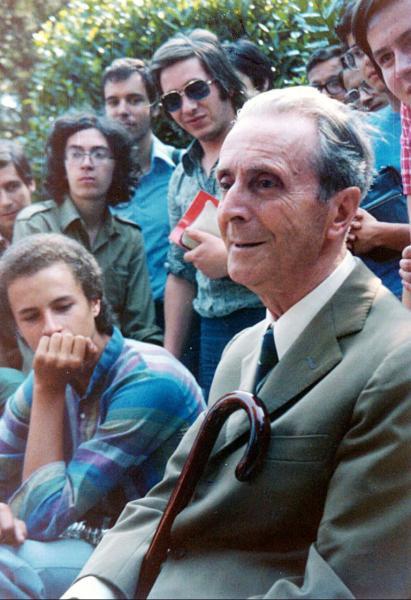 Two meetings about Igino Giordani and Tommaso Sorgi have taken place recently in Cremona and Teramo, Italy. At both gatherings, there was considerable focus upon the role of the politician as a person who values the common good – the good of humanity – over and above the well-being of his or her own community or nation. This idea and practice is not popular nowadays in this period of unbridled local and national demand. We asked Alberto Lo Presti and Letizia De Torre about the relevance of these two politicians today. Lo Presti is a lecturer in the Social Doctrine of the Church at LUMSA and president of the Igino Giordani Centre and De Torre is a member of the Italian parliament and international co ordinator for the Movement for Politics for unity. What relevance can Giordani and Sorgi have nowadays at a time when the common good seems to be understood only within the context of nationalism and the defence of regional identity? Alberto Lo Presti. There is a great need to tune into figures such as Igino Giordani and Tommaso Sorgi. They lived at a time marked by deep and apparently insurmountable periods of division. They believed in friendship among nations when the whole of history seemed to be taking a turn for the worse and they had a profoundly Christian view of the world. Giordani suffered personally in the two world wars and was regarded as a supporter of peace and justice. He paid the price for his choices of freedom and solidarity. Sorgi was one of the protagonists in the reconstruction of Italy after the second world war and greatly facilitated dialogue between opposing political forces during the time of the Cold War. These two figures teach us that every small action that favours peace and co-operation is a decisive step in the building of a civil order based upon the common good. They would be extremely surprised that in the twenty-first century there is growth in political ideas based upon national supremacy because they personally experienced the destruction brought by such political attitudes in the past. It is not our place to disregard their witness. Both regarded the relationship between the public and their political leaders as very important: Sorgi even formulated the so-called “political pact”. Is this relevant and practical nowadays?
Two meetings about Igino Giordani and Tommaso Sorgi have taken place recently in Cremona and Teramo, Italy. At both gatherings, there was considerable focus upon the role of the politician as a person who values the common good – the good of humanity – over and above the well-being of his or her own community or nation. This idea and practice is not popular nowadays in this period of unbridled local and national demand. We asked Alberto Lo Presti and Letizia De Torre about the relevance of these two politicians today. Lo Presti is a lecturer in the Social Doctrine of the Church at LUMSA and president of the Igino Giordani Centre and De Torre is a member of the Italian parliament and international co ordinator for the Movement for Politics for unity. What relevance can Giordani and Sorgi have nowadays at a time when the common good seems to be understood only within the context of nationalism and the defence of regional identity? Alberto Lo Presti. There is a great need to tune into figures such as Igino Giordani and Tommaso Sorgi. They lived at a time marked by deep and apparently insurmountable periods of division. They believed in friendship among nations when the whole of history seemed to be taking a turn for the worse and they had a profoundly Christian view of the world. Giordani suffered personally in the two world wars and was regarded as a supporter of peace and justice. He paid the price for his choices of freedom and solidarity. Sorgi was one of the protagonists in the reconstruction of Italy after the second world war and greatly facilitated dialogue between opposing political forces during the time of the Cold War. These two figures teach us that every small action that favours peace and co-operation is a decisive step in the building of a civil order based upon the common good. They would be extremely surprised that in the twenty-first century there is growth in political ideas based upon national supremacy because they personally experienced the destruction brought by such political attitudes in the past. It is not our place to disregard their witness. Both regarded the relationship between the public and their political leaders as very important: Sorgi even formulated the so-called “political pact”. Is this relevant and practical nowadays?  Letizia De Torre. Igino Giordani regarded politics as “charity in action – the servant and not the master”. He would never have been able to understand or practice politics based upon injustice and deception of the general public, aiming at power and personal gain. He thought of all citizens as the “masters” that he was called to serve. It was the same for the Honourable Tommaso Sorgi who witnessed first-hand the devastating effects of corruption which is still present in Italy. It was after many episodes of tension and conflict with politicians and public administrators that he drafted an agreement between the elected parliamentary representatives and the public. The agreement had an ethical basis and outlined policy involving everyone. It was a stroke of genius and is very relevant to our current crisis in democracy. We are living through a “post-representative” time; our politicians do not represent our highly complex societies and citizens know how to operate collectively, exerting direct influence. We need to overcome this continuous drift towards individualism and bring democracy back to its essential meaning – “we”. To this end, at our next international meeting “Co- governance and Co-responsibility in our Cities today” which will take place in Castel Gandolfo, Italy, 17 – 20 January 2019 we will work together to produce the outline for a “Pact for our Cities”. This will be the fulfilment of both Giordani’s understanding of politics as charity and the prophetic vision of Sorgi’s “agreement”.
Letizia De Torre. Igino Giordani regarded politics as “charity in action – the servant and not the master”. He would never have been able to understand or practice politics based upon injustice and deception of the general public, aiming at power and personal gain. He thought of all citizens as the “masters” that he was called to serve. It was the same for the Honourable Tommaso Sorgi who witnessed first-hand the devastating effects of corruption which is still present in Italy. It was after many episodes of tension and conflict with politicians and public administrators that he drafted an agreement between the elected parliamentary representatives and the public. The agreement had an ethical basis and outlined policy involving everyone. It was a stroke of genius and is very relevant to our current crisis in democracy. We are living through a “post-representative” time; our politicians do not represent our highly complex societies and citizens know how to operate collectively, exerting direct influence. We need to overcome this continuous drift towards individualism and bring democracy back to its essential meaning – “we”. To this end, at our next international meeting “Co- governance and Co-responsibility in our Cities today” which will take place in Castel Gandolfo, Italy, 17 – 20 January 2019 we will work together to produce the outline for a “Pact for our Cities”. This will be the fulfilment of both Giordani’s understanding of politics as charity and the prophetic vision of Sorgi’s “agreement”.
Stefania Tanesini
Dec 7, 2018 | Non categorizzato
In a letter to the whole Focolare Movement, dated 7th December 2018, the 75th anniversary of the day when Chiara Lubich consecrated her life to God, Maria Voce, Focolare President, has announced that during 2020 the centenary of Chiara Lubich’s birth will be celebrated. “We are getting closer to the year 2020 when we will celebrate the centenary of Chiara Lubich’s birth”, Maria Voce wrote. “This anniversary will of course be a unique opportunity; first of all to thank God for the gift that Chiara was for us and for many people across the world. In fact, all of us were won over by the charism God gave to her and that changed or is changing our lives in a deep way. It will be a favourable time in which many other people will be able to meet Chiara who is living today in her Work”. The President ended her letter saying, “From now on, let’s ask for the abundance of the Holy Spirit, for us and all that we want to achieve, but above all for all the people who will have the chance to get to know Chiara and her charism.” In the coming months, the Focolare communities around the world will be planning ways of celebrating this anniversary. A commission has been set up at the international centre of the Focolare Movement, which can be contacted (centenario.chiara (at) focolare.org) to share plans, ask for advice or receive information. Our website, too, will dedicate an area to Chiara’s centenary, where the various activities being held around the world during the anniversary year will be made known.

Dec 7, 2018 | Non categorizzato
With her unconditional “yes” to God, Chiara Lubich carried out a simple, transformative act that continues to generate life, organizations and culture. On December 7, 1943 Chiara gave her life to God for always. In 2002 she told some Focolare kids about that cold morning 75 years ago, when she had no intention at all of founding anything. “I had married God! I expected everything of him.” Today more than 2 million people have embraced her spirituality, which has gone beyond geographic and cultural borders worldwide. What happens when someone’s life path comes across Chiara Lubich’s spirituality? We asked Maria Celeste Mancuso and Arthur Ngoy – she’s from Argentina, he’s from the Democratic Republic of Congo. Maria Celeste (teacher): “I got to know about Focolare during the military dictatorship in my country. My 24-year-old brother had been taken and executed, and my family was destroyed by the pain. That was when I met a group of young people from the Focolare who spoke to me about Jesus’ cry of anguish on the cross, and how I could unite my own pain to his. I found the strength to forgive my brother’s killers, and I chose to respond to the  call to love everyone, just as Jesus had. Professionally I dedicated myself to teaching young people with disabilities, not just to offer them cultural foundations, but to restore their dignity and respect. Today I no longer feel Argentinian or even South American; I belong to a new culture that views someone else, someone different, as a sibling and that reads history as a journey towards fulfilling universal fraternity.” Arthur (doctor): “I had recently lost some friends in an accident that I had been in. I was at rock bottom, and it was during that time that I heard about Chiara, how she had discovered God’s love during the absurdity of World War II. I understood that my life could also be guided by the Gospel. So I decided to not give in to extortion and corruption, which is so common in my country, and to carry out my profession as a doctor, putting the good of patients above all else. One of the most difficult times of my life was in 2007: my oldest son was killed after an accident. It was an episode that, in African culture, was open to a number of interpretations. There were those who advised that I get a divorce, quit work or even leave my country. Only certainty in what Chiara had taught me – keep loving – helped me to overcome this ordeal and once again find peace at home. I want to thank Chiara for having brought the spirituality of unity to the African continent.”
call to love everyone, just as Jesus had. Professionally I dedicated myself to teaching young people with disabilities, not just to offer them cultural foundations, but to restore their dignity and respect. Today I no longer feel Argentinian or even South American; I belong to a new culture that views someone else, someone different, as a sibling and that reads history as a journey towards fulfilling universal fraternity.” Arthur (doctor): “I had recently lost some friends in an accident that I had been in. I was at rock bottom, and it was during that time that I heard about Chiara, how she had discovered God’s love during the absurdity of World War II. I understood that my life could also be guided by the Gospel. So I decided to not give in to extortion and corruption, which is so common in my country, and to carry out my profession as a doctor, putting the good of patients above all else. One of the most difficult times of my life was in 2007: my oldest son was killed after an accident. It was an episode that, in African culture, was open to a number of interpretations. There were those who advised that I get a divorce, quit work or even leave my country. Only certainty in what Chiara had taught me – keep loving – helped me to overcome this ordeal and once again find peace at home. I want to thank Chiara for having brought the spirituality of unity to the African continent.”
Stefania Tanesini

Dec 6, 2018 | Non categorizzato
An approach to dialogue amongst Churches that values reciprocity . 2017 marked the 500th anniversary of the Reformation. It was not just a time to recall what happened in the past but an opportunity to reflect upon the progress that has been made in the field of ecumenism. But what is going to happen now? This question was the starting point for the ninety participants at a seminar that took place in the Mariapolis Centre in Zwochau, Germany. It was entitled “Brennpunkt Okumene” (Focus on Ecumenism) and its starting point was “receptive ecumenism.” Paul D. Murray, a Catholic theologian from the University of Durham, England, outlined the ideas that lie at the heart of this approach. He said that it’s not a matter of “what the others can learn from us” but rather a question of “what we can learn from other people.” It is ecumenism based upon listening and reciprocity.  Dr. Callan Slipper, an Anglican theologian in London, explained that this approach enables people to learn from one another without hiding the wounds and hurt from the past. In fact, it creates awareness that other people help healing to take place. He and Peter Dettwiler, a theologian from the Reformed Church of Switzerland, gave a presentation that allowed listeners to penetrate the “inner life” of their respective Churches without avoiding the blows and suffering experienced. They then participated in a round table with the woman Pastor Seehafer from the community of the Free and Evangelical Church and Fr. Marcellus Klaus, a Catholic priest, offering those present the opportunity to practice “receptive ecumenism”. The day concluded with reflection upon an extract of a talk given by Chiara Lubich in the Memorial Church in Berlin which outlines the roots of the reciprocity proposed by “receptive ecumenism”. “Before being nailed to the cross, before suffering the abandonment of the Father, in a long prayer for unity, Jesus said, ‘May they all be one.’ (Jn.17:21) We could say that when we live in unity it makes an impact: it is a powerful element of living ecumenism. It is the presence of Jesus among the members of the community. Jesus said, ‘Where two or more are gathered in my name, there am I in the midst of them’ (Mt.18:20). In this magnificent church, why do we Christians not unite in this idea and so contribute to the fulfilment of Jesus’ words? Maybe we entered the church as individuals, distinct from one another but we can leave as one Christian body, ready to die for one another.”
Dr. Callan Slipper, an Anglican theologian in London, explained that this approach enables people to learn from one another without hiding the wounds and hurt from the past. In fact, it creates awareness that other people help healing to take place. He and Peter Dettwiler, a theologian from the Reformed Church of Switzerland, gave a presentation that allowed listeners to penetrate the “inner life” of their respective Churches without avoiding the blows and suffering experienced. They then participated in a round table with the woman Pastor Seehafer from the community of the Free and Evangelical Church and Fr. Marcellus Klaus, a Catholic priest, offering those present the opportunity to practice “receptive ecumenism”. The day concluded with reflection upon an extract of a talk given by Chiara Lubich in the Memorial Church in Berlin which outlines the roots of the reciprocity proposed by “receptive ecumenism”. “Before being nailed to the cross, before suffering the abandonment of the Father, in a long prayer for unity, Jesus said, ‘May they all be one.’ (Jn.17:21) We could say that when we live in unity it makes an impact: it is a powerful element of living ecumenism. It is the presence of Jesus among the members of the community. Jesus said, ‘Where two or more are gathered in my name, there am I in the midst of them’ (Mt.18:20). In this magnificent church, why do we Christians not unite in this idea and so contribute to the fulfilment of Jesus’ words? Maybe we entered the church as individuals, distinct from one another but we can leave as one Christian body, ready to die for one another.”

Dec 5, 2018 | Non categorizzato
There are many ways that each of us can make this choice our own, from changing our lifestyle to choosing ethical finance that avoids fossil fuels or weapons.  The Global Catholic Climate Movement contributes to the Catholic Church in order to take better care of our planet. Begun after the encyclical Laudato si: on the care of our common home was published, today the network includes close to 1,000 Catholic organizations, including parishes, schools, NGOs. Among these is the Focolare Movement. We spoke with Luca Fiorani, a physicist and coordinator for EcoOne. So Luca, what’s EcoOne? It’s the international network that started in the Focolare Movement that brings together people who are expressing their ecological awareness in a new way. What does the partnership with the Global Catholic Climate Movement mean for the Focolare Movement? It means that the Focolare becomes a part of this global initiative that is committed to fighting against climate change. In Italy, for example, it has checked its accounts and can say that it does not invest a single cent in funds that support the fossil fuel economy. Can you explain more about the link between climate change and fossil fuels? When we use coal, oil or natural gas, we produce carbon dioxide, a gas that contributes to the greenhouse effect and heats up the atmosphere. This brings a number of negative effects that we can observe, from desertification, which is one of the causes of migration, to extreme weather events, which cause flooding. What can people in the Focolare Movement do to participate in this partnership? We look at nature and humanity with new eyes: those of the heart. And then we use our heads and hands to act in favor of humanity today and future generations. We change our lifestyles: we don’t waste water, we use energy efficiently, we improve recycling, and we “vote” through the things we consume. For example, if we discover that our bank invests money in fossil fuels or weapons – all you need to do is go online and quickly search to see – we choose a more sustainable bank. The pope, and many with him, are concerned because the cry of the Earth is the cry of the poor – and we can’t just sit back and do nothing!
The Global Catholic Climate Movement contributes to the Catholic Church in order to take better care of our planet. Begun after the encyclical Laudato si: on the care of our common home was published, today the network includes close to 1,000 Catholic organizations, including parishes, schools, NGOs. Among these is the Focolare Movement. We spoke with Luca Fiorani, a physicist and coordinator for EcoOne. So Luca, what’s EcoOne? It’s the international network that started in the Focolare Movement that brings together people who are expressing their ecological awareness in a new way. What does the partnership with the Global Catholic Climate Movement mean for the Focolare Movement? It means that the Focolare becomes a part of this global initiative that is committed to fighting against climate change. In Italy, for example, it has checked its accounts and can say that it does not invest a single cent in funds that support the fossil fuel economy. Can you explain more about the link between climate change and fossil fuels? When we use coal, oil or natural gas, we produce carbon dioxide, a gas that contributes to the greenhouse effect and heats up the atmosphere. This brings a number of negative effects that we can observe, from desertification, which is one of the causes of migration, to extreme weather events, which cause flooding. What can people in the Focolare Movement do to participate in this partnership? We look at nature and humanity with new eyes: those of the heart. And then we use our heads and hands to act in favor of humanity today and future generations. We change our lifestyles: we don’t waste water, we use energy efficiently, we improve recycling, and we “vote” through the things we consume. For example, if we discover that our bank invests money in fossil fuels or weapons – all you need to do is go online and quickly search to see – we choose a more sustainable bank. The pope, and many with him, are concerned because the cry of the Earth is the cry of the poor – and we can’t just sit back and do nothing!
Lorenzo Russo
Nov 30, 2018 | Non categorizzato
The Focolare contributes in the complex path of integration and dialogue between Christians and Muslims in Belgium, a land that was also wounded in the 2016 terrorist attacks. “The time of the ‘we’ has arrived”, “we are a community, a ‘prophetic minority’”. This was what Maria Voce, President of the Focolare Movement, and Jesús Moràn, its Co-President, have expressed during their meeting in Brussels. An appointment that convened Christians and Muslims in the said country, who for years have been trying to live fraternity in diversity, as well as the respect for each one’s cultural and religious identity. Present were about 50 persons, half of whom were Muslims and the other half Christians, but all actors of dialogue. It has begun with festive greetings over a cup of Moroccan tea, creating a family atmosphere. “We experienced profound unity—said Jesús Moràn—because God is so great and is present everywhere in our life.” The story of Islam in Belgian land started fifty five years ago with the arrival of immigrants from Morocco and Turkey, followed later by those from other countries. Today, it is enriched by the new generations born in Belgium. After the Brussels attack on March 2016, dialogue with Muslims has become a political priority. There is a new awareness about the problems related to integration, or rather, of the non-integration of a minority of Muslims. Oftentimes, the accent is placed on diversity, on the “we” and the “you” that is fostered by the fundamentalist current. In the said country are living a minority of believing and practicing Muslims, who manifest their identity even in public spaces, and a majority of citizens who refuse their Christian heritage, most of whom are agnostics or are indifferent to the faith. This materialistic and strongly secular society often confuse fundamentalism with the essence and beauty of Islam. The friendship between the Focolare and the Muslims in Belgium started years ago when a focolarina came to teach in a predominantly Islamic district. A profound rapport was born with many of the inhabitants. Bit by bit, some of them wanted to know the inspiration behind this generous teacher’s life. Thus, a nucleus of persons desiring to walk along with the Focolare was born, and they also participated in the international meetings of interreligious character. The dialogue that begun is, and remains to be, a “dialogue of life”, weaving a network of fraternity that is lived, renewed, and appreciated, especially in this difficult time of widespread fear.
Chris Hoffmann
Nov 28, 2018 | Non categorizzato
We asked the President of the Focolare to tell us something about Eli Folonari and her specific contribution to the Movement, over the many years she spent alongside Chiara Lubich. “I got to know Eli better when I was asked to join Chiara’s Secretariat, which she was responsible for. I was struck by her serious and balanced approach and, I would say, by the tenderness that I discovered beneath what sometimes seemed a rather severe exterior. Eli did all that Chiara asked her to do with heroic faithfulness. Chiara had entrusted her with the aspect of fellowship and communion, which translates directly into communications. This meant ensuring that everyone could be informed of everything at any time. She did this to the utmost. I saw always near Chiara, supporting her, being her friend, her sister and an adviser too in the many things that needed to be done. At the same time, I never saw her taking over from Chiara. All she did was done so that Chiara and the charism she was conveying could reach everyone without any hindrance. This, I feel, was the full achievement of her ‘design’: she enabled all those who came to Chiara to become one heart and one soul”.
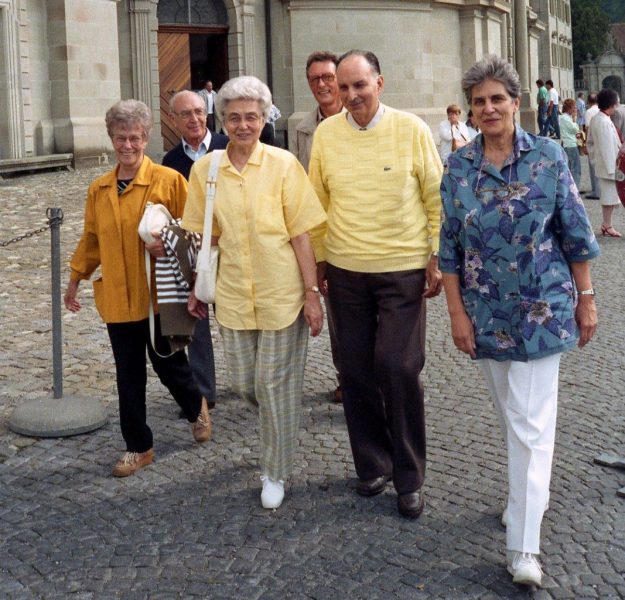
Nov 28, 2018 | Non categorizzato
Eli Folonari was Chiara Lubich’s personal secretary for over fifty years. In a series of interviews in 2012, she described many episodes of daily life with Chiara. These interviews were published in a book entitled “The Score Written in Heaven” edited by Oreste Paliotti and Michele Zanzucchi. From your perspective, what was it like to see the birth and development of a movement that is now in 180 countries? 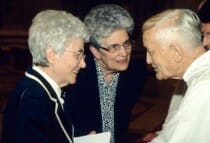 It felt like living in a divine adventure. At the beginning, Chiara always used to say that she never intended to found a movement: the last thing on her mind was to draw up a schedule or an action plan. So what was it like to live beside her? It was like one long race to catch up with her. With Chiara, there was one surprise after another – all the work of the Spirit whose actions are always unpredictable. I am not going to say that there was a surprise every day every day but they often happened. God led her to discover a new “reality” through circumstances, an act of love or a meeting (…) Every meeting had a meaning. She felt that the people she met were waiting for something and she used to tell us this. “Let’s begin to dialogue with these people, let’s do something for them.” Her ideal was ut omnes unum sint (Jn.17:21), the fulfilment of Jesus’ testament. The whole world, beginning with the people closest to us, was contained in that “may they all be one.” What is your life like now after Chiara’s death?
It felt like living in a divine adventure. At the beginning, Chiara always used to say that she never intended to found a movement: the last thing on her mind was to draw up a schedule or an action plan. So what was it like to live beside her? It was like one long race to catch up with her. With Chiara, there was one surprise after another – all the work of the Spirit whose actions are always unpredictable. I am not going to say that there was a surprise every day every day but they often happened. God led her to discover a new “reality” through circumstances, an act of love or a meeting (…) Every meeting had a meaning. She felt that the people she met were waiting for something and she used to tell us this. “Let’s begin to dialogue with these people, let’s do something for them.” Her ideal was ut omnes unum sint (Jn.17:21), the fulfilment of Jesus’ testament. The whole world, beginning with the people closest to us, was contained in that “may they all be one.” What is your life like now after Chiara’s death?  When she was alive, if we were dealing with rather complicated situations, just one word from her would help us understand what to do. Now we have to find the answer to these challenges ourselves, with the President, Co-president and the General Council. This encourages us to live so that we are aware of the presence of Jesus among us who enlightens us: we try to listen to one another carefully because what each person says is important and may be inspired. Now that Chiara is no longer here, there has to be an even deeper unity of thought at the heart of the Movement. If you could speak personally to Chiara now, what would you say? I would say, “Thank you Chiara for this divine life into which you drew me – this life of peaks and abysses! Thank you because not only have you satisfied my longing to give myself totally to God and to rebuild society but also because, through you, I have been surprised in ways I could never have imagined. I hope this experience will continue with others in paradise.” (da Giulia Eli Folonari, The Score Written in Heaven, Città Nuova, Roma, 2012, pp. 7-8; 167; 171-172)
When she was alive, if we were dealing with rather complicated situations, just one word from her would help us understand what to do. Now we have to find the answer to these challenges ourselves, with the President, Co-president and the General Council. This encourages us to live so that we are aware of the presence of Jesus among us who enlightens us: we try to listen to one another carefully because what each person says is important and may be inspired. Now that Chiara is no longer here, there has to be an even deeper unity of thought at the heart of the Movement. If you could speak personally to Chiara now, what would you say? I would say, “Thank you Chiara for this divine life into which you drew me – this life of peaks and abysses! Thank you because not only have you satisfied my longing to give myself totally to God and to rebuild society but also because, through you, I have been surprised in ways I could never have imagined. I hope this experience will continue with others in paradise.” (da Giulia Eli Folonari, The Score Written in Heaven, Città Nuova, Roma, 2012, pp. 7-8; 167; 171-172)
Nov 26, 2018 | Senza categoria
A new look and new capabilities for the Focolare Movement’s website It is eight years since this website was last restyled. The graphics have changed but so has the structure of the site, with shorter articles containing infographics and video-clips. The new structure allows greater integration with social media and is mobile-friendly, in view of the increasing use of mobile phones for information and communication. New features include diversified and personalised content that users can access The articles in the main pages of the former website can still be accessed. They are now grouped in a few e-books. Instead, the news can be found in the archive section. Updates on many aspects of the life of the Focolare Movement can now be found in the community area called “Mariapolis”, the name given to the summer meetings of the Focolare worldwide which was also used for the Newsletter published in hard copy [in Italian] until December 2018. From 2019, a pdf “Mariapolis Newsletter” will be prepared bi-monthly, containing the most important news items. In this area a notification system lets users choose when, on what topics and on which device (computer, tablet or mobile) they wish to receive information. The new site is the result of an on-going process over a two year period at the international centre of the Focolare Movement at Rocca di Papa (Rome). This has led to the creation of a single Communications Office, operational since 1st February 2018. It brings together the work done previously by four separate entities. The aims of this Office include: collecting news of the life of the Movement worldwide and communicating it via various media; promoting the Focolare’s activities and making the Movement itself better known through a variety of communications channels; to contribute to an ever growing sharing of life and news among the Movement’s many communities throughout the world. Enjoy surfing!
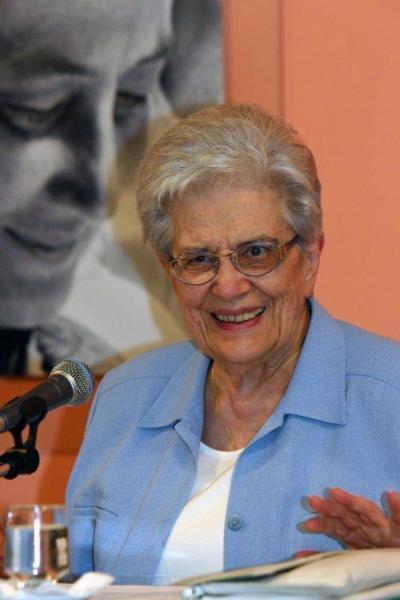
Nov 26, 2018 | Non categorizzato
At the age of 92 years, Giulia (Eli) Folonari passed away peacefully on november 26th 2018. She was one of the privileged witnesses of the public life, but above all of the ordinary, everyday life, of the founder of the Focolare Movement.

She was born in Milan, in Northern Italy, on 8 February 1926. She was the eldest of Luigi and Speranza Folonari’s eight children, a rich industrial family in Brescia. After graduating in Business & Economics at the Sacred Heart Catholic University of Milan, at the age of 25, Eli, for the first time, heard about the newly-born Focolare Movement from Valeria (Vale) Ronchetti. That same year, while spending her holidays not far from Tonadico (Trent), where one of the first Mariapolis gatherings was taking place, she decided to attend together with her siblings Vincenzo and Camilla. It was on that occasion that she met Chiara Lubich.
She moved to Rome in 1951, and she accompanied Chiara on all her trips around Italy, as well as South America, Asia, Australia, North America, Europe. “It was a divine adventure,” she said, “Keeping up with Chiara was no mean feat! We went from one surprise to another.” She was Chiara’s confidant and counsellor in the difficult years when the Focolare Movement (Work of Mary) was being studied by the Church. She also followed, in a particular way, all the media developments within the Movement: the birth of the St Claire Audiovisual Centre named after St Claire of Assisi, as well as the beginning, in Switzerland in 1980, of the “conference call” which soon extended to all the nations where the Focolare was present. Whilst it started off simply as a way of sharing the spiritual life, joys and sufferings among everyone, the conference call subsequently evolved, through technological advances, into that which today is a live streaming event via satellite! Still now it is referred to as CH (from the Latin
Confoederatio Helvetica) in order to be true to its Swiss origins.
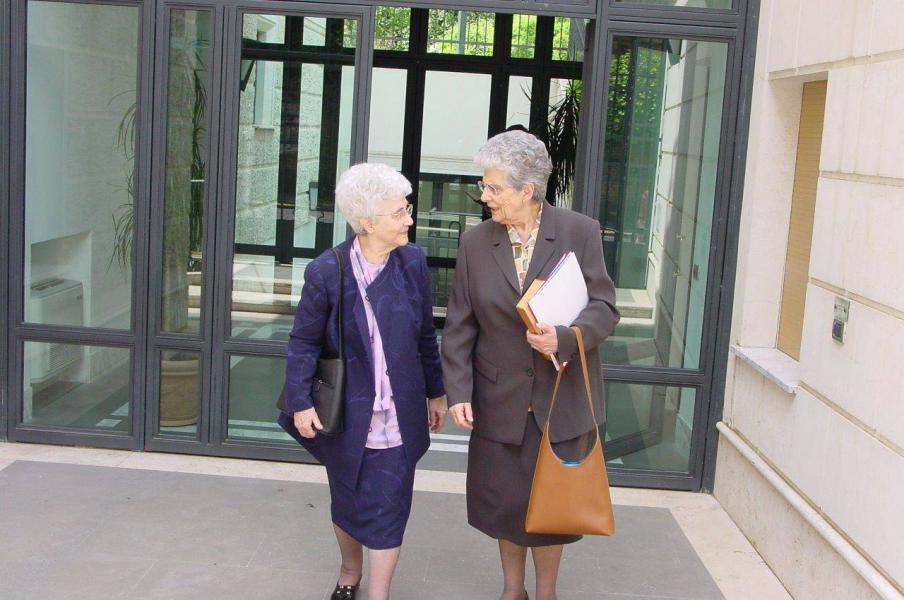
Eli always accompanied the founder of the Focolare Movement on important encounters with the great dignitaries of our time: from Pope Paul VI to John Paul II, from Mother Teresa of Calcutta to Vaclav Havel and the Ecumenical Patriarch of Constantinople, Athenagoras I. Her testimony as a direct witness to these events is contained in the book
Lo spartito scritto in Cielo. Cinquant’anni con Chiara Lubich (“The Score Written in Heaven. Fifty years with Chiara Lubich” (Città Nuova, 2012). Giulia Eli Folonari was the Director of the Chiara Lubich Centre since its foundation in July 2008, right up until 2014. This institute aims to be a custodian of the thought of Chiara Lubich, to assure its authenticity and to help spread her charism, as well as to preserve the history of the Focolare Movement through meetings, conferences and a dedicated website. The Centre ensures that the rich patrimony of paper-based archives and multimedia documents that the founder of the Opera di Maria left behind is made available to scholars and the public in general.
Nov 26, 2018 | Non categorizzato
The wave of violence in Southwest Cameroon shows no sign of stopping. The focolarini have had to flee the little city, although they remain in the country. “How long can we hold out? What will happen next? Will we be able to still live in Fontem? We’ve kept on, even in the most adverse conditions.” With these words the focolarini of Cameroon’s little city shared their difficult decision on November 16 to not go back to Fontem – although they still remain in the country. There are just not the “fundamental conditions to be able to continue living there.” “Many things have happened,” their message continues, “especially some serious incidents that made us reflect on the choices to make… It was with a heavy heart that we decided not to go back to Fontem for the moment, in order to rebuild our strength and try to understand what God wants.” The wave of violence in Southwest Cameroon, which is where Fontem is located, unfortunately shows no sign of stopping. In the last few months, the bishops of Cameroon have several times tried to get their voices heard, raising “a cry of anguish” at the deteriorating security conditions in the English-speaking regions and calling for political mediation to avoid “useless civil wars.” The Focolare’s little city is located in a zone of continuous armed conflict. It has had to close down its education complex for some time now, although the hospital continues to work and give aid to those in need.
Nov 26, 2018 | Non categorizzato
From 6th-10th November 2018, 40 bishops who are friends of the Focolare Movement, from 12 different Churches and five continents, met in Sigtuna, Sweden. They brought with them the challenges and joys of their life and work. What meaning do these meetings have? What outcomes are there? Susan Gately, a journalist from Ireland, found out. https://vimeo.com/301372728
Nov 24, 2018 | Non categorizzato
At a time when the Catholic Church is celebrating the Feast of Christ the King, the following text by Chiara Lubich explains the importance and meaning this feast day had in the story of the Focolare Movement right from its earliest days during the Second World War. You know the episode of those early days during the war, when we first focolarine found ourselves in a cellar where we had taken refuge from the bombs, and we opened the Gospel. Everything was dark and in the light of a candle we read the last will and testament of Jesus. We had opened the Gospel at random and read this passage from beginning to end. It was a difficult text for us because we were young and our education had reached only up to a certain point, but we had the impression that those words were illuminated for us, one by one. Now we can understand that it was the effect of the charism that had been given to us, a charism that gives a new light to the soul of the person who receives it, for the benefit, then, of all those who come in contact with it. What we understood, above all, was that Jesus had prayed for unity: “That they may all be one, Father, as you and I are one.” May they all be one. We understood very clearly that that page of the Gospel, Jesus’ testament, was the magna charta of the movement that was coming to life. Naturally, we immediately realized that it would not be easy to bring about unity; we didn’t know how to do it. One day we gathered around an altar – there were seven or eight of us first focolarine. I remember that it was the feast of Christ the King and we were struck by what was written in our missal for that feast day, which has now been changed a little in the liturgy. We told Jesus: “We feel called to fulfill what you prayed for – unity – but we don’t know how to bring it about. If you want, make us instruments of unity.” And then, knowing that it was the feast of Christ the King, we remembered that in the liturgy of the Mass on that day it said: “Ask of me, and I will make the nations your heritage and the ends of the earth your possession” (Ps 2:8). I remember that we, who were mere girls, but full of faith, believing that God could do anything, asked, if it were possible, that we could serve him to the very ends of the earth. Now after 58 years of life, we see that he answered our prayer, because as you know our movement is Catholic and ecumenical, and we are in contact with the faithful of 350 churches, with numerous Church leaders. … Now we see that the Lord answered the prayer of us young girls, leading us to develop this movement among the various churches, and also among other religions, and even among people without any religious affiliation, to the very ends of the earth; practically speaking to every nation of the world. Source: Centro Chiara Lubich
Nov 24, 2018 | Non categorizzato
“If one day all people, not as individuals but as nations, learn to put themselves aside, to put aside the idea they have about their own country, … and if they were to do this as the expression of the mutual love between States that God wants, just as he wants mutual love among individuals, that day will mark the beginning of a new era. For on that day, Jesus will be alive and present among peoples. … Now is the time for every people to go beyond its own borders, to look farther. Now is the time to love other countries as our own, to acquire a new purity of vision. To be Christians it is not enough to be detached from ourselves. The times we live in ask something more of the followers of Christ: the awareness of Christianity’s social dimension. … … We hope that the Lord may have mercy on this divided and confused world, on peoples closed within their own shells, contemplating their own beauty – so special to them – although it is limited and unsatisfying. With clenched teeth they hang on to their own treasures, those very treasures that could help other peoples, where many are dying of hunger. May the Lord cause the barriers to fall, and charity to flow unhindered between one land and another, in an endless stream of spiritual and material goods. Let us hope that the Lord brings about a new order in the world. Only he can make humanity one family and cultivate the distinctive characteristics of each people, so that the splendour of each, placed at the service of others, may shine with the one light of life. By making each earthly country beautiful, this light will make each one a foretaste of the eternal Country”. Chiara Lubich
Excerpt from “Mary, bond of unity among nations”, Summer 1959 – Published in “Essential Writings”, New City Press, New York, 2007. pp. 231-2
Nov 23, 2018 | Non categorizzato
A tri-monthly magazine for those who work in all levels in the ecclesial ambit, in synergy with between the Work of Mary and the Città Nuova Publishing Group. What is it about? «Pathways of communion and dialogue» is the subtitle that reveals the style that characterizes the contents. Their aim was bold and daring: to give life to a new magazine that would express and be at the service of an ecclesial commitment, not just of some branches but of the whole Movement. It will be Ekklesía. Sentieri di comunione e dialogo (Pathways of communion and dialogue) which will be out at the end of this year. This new magazine from the Città Nuova Publishing House is aimed at being a «source of inspiration, an instrument of formation and an aid to action» not only for those who know the Charism of Unity, but also for many people committed to a Church that is going out, in tune with the Second Vatican Council, with the guidelines of the pontificate of Pope Francis and with the ecumenical experience. Carlos García Andrade, Hubertus Blaumeiser
Nov 23, 2018 | Non categorizzato
The “International Day for the Elimination of Violence Against Women,” instituted by the UN in 1999, is celebrated each year on 25 November, as an invitation to the governments, international organisations and nonprofit Associations to undertake campaigns to raise public awareness and bring about change. Much has been done, but there is still a lot to do. There is no need to go to faraway countries to see cruel violence still practiced on women, even in our own environments and in the most sordid silence. The words of St. John Paul II still echo forcefully in the apostolic letter, Mulieris dignitatem (MD, 15/08/1988), which underlines that “God created man and woman to his image, not only as singles, but in their common humanity, as a “two-fold unit.” Woman and man therefore, are essentially equal, and are both persons, called as such to participate in the intimate life of God and live in mutual communion in love, based on the model of God who is Love, which is unity in the Trinity, and to reflect in the world the communion of love in God (MD 7).” It is a goal which we can refer to daily, as individuals and as a society.
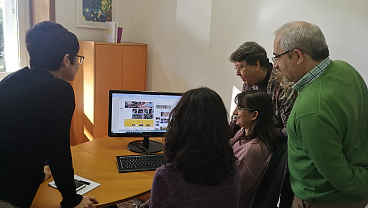
Nov 23, 2018 | Cultura, Focolari nel Mondo, Non categorizzato, Spiritualità
 Innovation is on the horizon for focolare.org users. The Focolare website will soon appear in a restyled format and with additional navigational features. This is a project which the International Centre of the Focolare Movement in Rocca di Papa (Rome) has been developing over the last two years. The project aims at integrating the communication networks, carried out up till now by four separate publishing sectors (Website, Information Service, Mariapolis Newsletter, and Collegamento CH Worldwide Linkup), thus creating a unified “Communications Office”. Already operating since last February, this Office gathers news about the life of the Movement worldwide and transmits them through various media. Among its main objectives is to promote activities of the Focolare Movement, to communicate its life to a broader audience, and to contribute to a greater sharing of news among the various Focolare communities worldwide. The development of new communication technologies and trends called for the restyling of the website which includes a new graphic layout, significantly more minimalist in structure, and an upgraded navigational logic. The use of new applications will also allow for greater integration with the social media, and will enable users to access content in different and personalized modes. The new structure will, in fact, be mobile-friendly and as such will take into account the use of smartphones and other mobile technology in our daily life. It will focus on content that is brief and varied, available in different formats (text messages, infographics, video clips, etc). The contents of the current site, however, will not be lost. The static content will be published as an e-Book and in the future the news articles will be accessible through searchable archives. Also envisaged is a space, entitled “Mariapolis”, dedicated to news regarding many aspects of the life of the Focolare Movement. It bears the same name given to the traditional summer gatherings of the Focolare held around the world. The current print edition of the journal “Mariapolis” will be discontinued after December 2018. The digital version aims to be a virtual “community” open to anyone who wants to visit. A system of notifications will allow the users to choose when, which themes and channels, and the preferred device (PC, tablet or smartphone) they would like to receive the information on. Every two months, a “Mariapolis” newsletter in pdf format will deliver a summary of the main highlights. Happy surfing! Joachim Schwind
Innovation is on the horizon for focolare.org users. The Focolare website will soon appear in a restyled format and with additional navigational features. This is a project which the International Centre of the Focolare Movement in Rocca di Papa (Rome) has been developing over the last two years. The project aims at integrating the communication networks, carried out up till now by four separate publishing sectors (Website, Information Service, Mariapolis Newsletter, and Collegamento CH Worldwide Linkup), thus creating a unified “Communications Office”. Already operating since last February, this Office gathers news about the life of the Movement worldwide and transmits them through various media. Among its main objectives is to promote activities of the Focolare Movement, to communicate its life to a broader audience, and to contribute to a greater sharing of news among the various Focolare communities worldwide. The development of new communication technologies and trends called for the restyling of the website which includes a new graphic layout, significantly more minimalist in structure, and an upgraded navigational logic. The use of new applications will also allow for greater integration with the social media, and will enable users to access content in different and personalized modes. The new structure will, in fact, be mobile-friendly and as such will take into account the use of smartphones and other mobile technology in our daily life. It will focus on content that is brief and varied, available in different formats (text messages, infographics, video clips, etc). The contents of the current site, however, will not be lost. The static content will be published as an e-Book and in the future the news articles will be accessible through searchable archives. Also envisaged is a space, entitled “Mariapolis”, dedicated to news regarding many aspects of the life of the Focolare Movement. It bears the same name given to the traditional summer gatherings of the Focolare held around the world. The current print edition of the journal “Mariapolis” will be discontinued after December 2018. The digital version aims to be a virtual “community” open to anyone who wants to visit. A system of notifications will allow the users to choose when, which themes and channels, and the preferred device (PC, tablet or smartphone) they would like to receive the information on. Every two months, a “Mariapolis” newsletter in pdf format will deliver a summary of the main highlights. Happy surfing! Joachim Schwind
![Home of the nations, family of peoples]()
Nov 22, 2018 | Non categorizzato
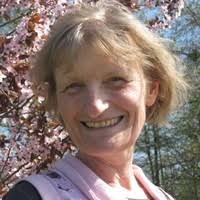
Beatriz Lauenroth
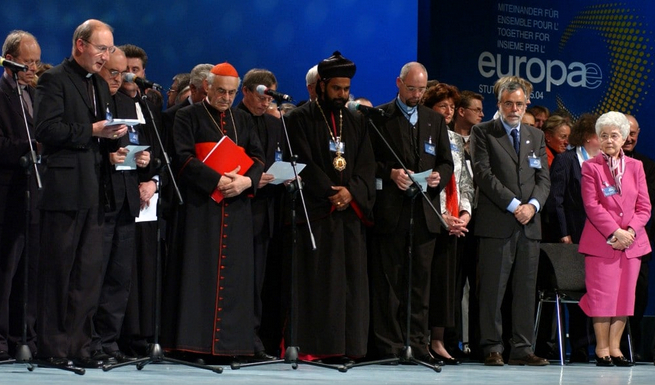 It was a historic event for the ecumenical path: “That same evening, many had gathered not far away in Ottmaring, seat of the ecumenical town of the Focolare. Chiara Lubich was there with other representatives of the movements, like Andrea Riccardi of Sant’Egidio, and also other Protestants like Helmut Nicklas, head of the YMCA of Munich (Ecumenical Association of Christian Youths). They said: let’s join up, get to know one another, and start working together!” That first tract of the journey lead subsequently to the big “Together for Europe” events of 2004 and 2007, held in Stuttgart, and later in 2012, contemporaneously in 152 cities with the fulcrum in Brussels, and in 2016, in a main square of Munich, Germany, with 36 round tables and forums to share experiences, good practices and perspectives regarding Europe. In November 2017, the meeting of the friends of “Together for Europe” reached Vienna, the city bridge between East and West. On those days, this free forum of Christian movements and communities got together in Prague, on the occasion of the anniversary of the start of the so-called Velvet Revolution, the nonviolent revolution which in 1989, toppled the Czech communist regime:
It was a historic event for the ecumenical path: “That same evening, many had gathered not far away in Ottmaring, seat of the ecumenical town of the Focolare. Chiara Lubich was there with other representatives of the movements, like Andrea Riccardi of Sant’Egidio, and also other Protestants like Helmut Nicklas, head of the YMCA of Munich (Ecumenical Association of Christian Youths). They said: let’s join up, get to know one another, and start working together!” That first tract of the journey lead subsequently to the big “Together for Europe” events of 2004 and 2007, held in Stuttgart, and later in 2012, contemporaneously in 152 cities with the fulcrum in Brussels, and in 2016, in a main square of Munich, Germany, with 36 round tables and forums to share experiences, good practices and perspectives regarding Europe. In November 2017, the meeting of the friends of “Together for Europe” reached Vienna, the city bridge between East and West. On those days, this free forum of Christian movements and communities got together in Prague, on the occasion of the anniversary of the start of the so-called Velvet Revolution, the nonviolent revolution which in 1989, toppled the Czech communist regime:  “It is a coincidence that strongly challenges the friends of ‘Together for Europe,’ to renew our common commitment of bringing the spirit of Christian humanism to post-century culture, thus offering our contribution in giving life and form to a more united Europe.” Beyond all the fears and prejudices, we wish to testify that the journey towards a Europe which is “home to the nations and family of peoples” is not a utopia. The Prague convention opened with the speech of the Czech theologian-philosopher, Tomáš Halík (Templeton-Prize 2014), a personal friend of Vaclav Havel, the first president of the newly constituted Czech Republic from 1993 to 2003, and then of Jaroslav Šebek, a member of the Historical Institute of the Science Academy of the Czech Republic, and of Pavel Fischer, Czech senator. The directors and representatives of the various Movements,
“It is a coincidence that strongly challenges the friends of ‘Together for Europe,’ to renew our common commitment of bringing the spirit of Christian humanism to post-century culture, thus offering our contribution in giving life and form to a more united Europe.” Beyond all the fears and prejudices, we wish to testify that the journey towards a Europe which is “home to the nations and family of peoples” is not a utopia. The Prague convention opened with the speech of the Czech theologian-philosopher, Tomáš Halík (Templeton-Prize 2014), a personal friend of Vaclav Havel, the first president of the newly constituted Czech Republic from 1993 to 2003, and then of Jaroslav Šebek, a member of the Historical Institute of the Science Academy of the Czech Republic, and of Pavel Fischer, Czech senator. The directors and representatives of the various Movements,  Communities and Associations intervened to recall together another Europe, that of the big hopes and promises that arise from the rich heritage of an ethnic, social and cultural multiplicity, and that tends toward communion and dialogue. The Prague event has thus become an important step in the history of Together for Europe that continues to commit itself to a more united and fraternal Europe. “Often we mention ˗ Beatriz concluded ˗ the Founding Fathers of Europe, Schuman, De Gasperi and Adenauer. The youths say to us: let us work with you, so that the Europe of the fathers can also become the Europe of the sons and daughters.” Source: UnitedWorldProject
Communities and Associations intervened to recall together another Europe, that of the big hopes and promises that arise from the rich heritage of an ethnic, social and cultural multiplicity, and that tends toward communion and dialogue. The Prague event has thus become an important step in the history of Together for Europe that continues to commit itself to a more united and fraternal Europe. “Often we mention ˗ Beatriz concluded ˗ the Founding Fathers of Europe, Schuman, De Gasperi and Adenauer. The youths say to us: let us work with you, so that the Europe of the fathers can also become the Europe of the sons and daughters.” Source: UnitedWorldProject
Nov 21, 2018 | Non categorizzato
A disabled daughter A parent never expects to have a disabled child. When this happened to us, my wife, already psychologically fragile, fell into a depression. I found myself taking care of the family in an unexpectedly new way. The first month, full of queries, I was isolating myself from friends and relatives. One day, at the staircase of the condominium, I met a couple who seemed to be very serene despite having a daughter with the Down syndrome. When I asked them how they managed to be so, their answer amazed me: “Our daughter is the biggest gift we could ever receive. She has brought us back to reality and the whole family benefited from it.” My wife and I went to visit them often. We learned about their faith, and day after day, thanks to them also we rediscovered the values we had neglected. (A. e G.F. – Italia) An unexpected gift Some relatives who had distanced themselves from us for inheritance reasons, accepted our invitation for them to stay with us for a few days. But when they told us the date of their arrival, it was not the best moment: we were having financial difficulties and I had no time to prepare the house as well as I would have wanted. Then I thought that the new found peace was the biggest gift and with the entire family we decided to do our best to make their stay a happy one. We would have liked also to give them a gift, but for want of anything better, our youngest son prepared a drawing and the oldest one, a welcome poem. The day before their arrival, in my husband’s company, the employees received a bonus package. When we opened it, there were two watches, a lady’s and a man’s watch: the unexpected gifts for our relatives. (R.H. – Germany) Another chance One of my sisters-in-law asked me the favour of taking her in our house for a period and to sign a bank loan she needed. Our house is small but we welcomed her sincerely. I saw that my husband however was very worried about the loan, considering that a few years back we had lent her a sum which she never returned. I told him that I would accept whatever decision he made, adding however that everyone should be given a chance to redeem himself. Doesn’t God himself do so with us? We signed the guarantee for the loan, which my sister-in-law is punctually paying back, even if at times not on time. As to me, I feel I have to continue helping her, and at times we have long talks during which she opens out to me as if I were a sister, overcoming the barriers that divide us. (M.D. – Paraguay) Totally at service After the death of our first girl, at only14 months, also the other two sons that arrived started to show the same symptoms. My wife and I were with bated breath, and the house became like a small hospital. However, trying to love one another, our children grew full of peace. How many times was I converted upon looking at them! Returning home after work, I tried to leave all my worries and problems behind, so as to be totally at their disposition. It could only work out this way, otherwise we would have been crushed by anguish and worries for the future. We concretely experienced that God is all powerful, and can give us a taste of paradise even in such a difficult situation. (G.M.B. – Italy)

Nov 20, 2018 | Focolare Worldwide
 With a simple language like that of Jesus who used common terms that anyone could understand, to explain his kingdom, Sándor began his account of how he tried to incarnate the Gospel in everything he did. A group of farmers was formed around him that met regularly to their each other’s joys, pains and progress… They felt they had a mission. Their relationship with nature, such a source of wisdom, was a gift they could share with people living in the city. This simple little spark led to meeting with city mayors. From the meetings between mayors and farmers the need arose for creating an alternative to the globalization that sanctions and extinguishes so many traditions and values. In September 2016, they held a meeting which included experiences and presentations by specialists, with the goal of finding a way to give a soul to the area, beginning from the countryside. Some 350 people took part in the gathering, including 20 mayors. The 2cnd meeting was held last September in the Hungarian Municipality of Újkígyós, in the South East of the country where, despite the freezing weather, 500 people attended. 27 stands were set up to sell cheese, handmade rugs, honey, small furniture and marmalade… With gratuitousness and much generosity the farmers from many communes, boroughs and villages, offered the best of their culinary and artisan products. They also brought horses and gave rides to the children. It was a real feast for the population.
With a simple language like that of Jesus who used common terms that anyone could understand, to explain his kingdom, Sándor began his account of how he tried to incarnate the Gospel in everything he did. A group of farmers was formed around him that met regularly to their each other’s joys, pains and progress… They felt they had a mission. Their relationship with nature, such a source of wisdom, was a gift they could share with people living in the city. This simple little spark led to meeting with city mayors. From the meetings between mayors and farmers the need arose for creating an alternative to the globalization that sanctions and extinguishes so many traditions and values. In September 2016, they held a meeting which included experiences and presentations by specialists, with the goal of finding a way to give a soul to the area, beginning from the countryside. Some 350 people took part in the gathering, including 20 mayors. The 2cnd meeting was held last September in the Hungarian Municipality of Újkígyós, in the South East of the country where, despite the freezing weather, 500 people attended. 27 stands were set up to sell cheese, handmade rugs, honey, small furniture and marmalade… With gratuitousness and much generosity the farmers from many communes, boroughs and villages, offered the best of their culinary and artisan products. They also brought horses and gave rides to the children. It was a real feast for the population.  The conference speakers included specialists in the fields of ecology, agriculture, noise pollution, farming, as well as researchers and university faculty who were all joined in strong and genuine friendship. This was not only the secret to the success of the project, but also the realizable path for making a contribution towards authentic fraternity. Even the local Mayor, who brought folkloristic groups, confided that he was seeing a “new soul” in the community. The parish priest underscored the efficacy of evangelizing in this way, which he experienced there. One of the organisers told me: “We didn’t have any political or institutional support: it was all a gift. The whole event didn’t cost a single penny: from the chairs, to the tents, to the tables. Here, as you can see, we’re all like brothers and sisters, because out in the villages, human relationships are the winning force.
The conference speakers included specialists in the fields of ecology, agriculture, noise pollution, farming, as well as researchers and university faculty who were all joined in strong and genuine friendship. This was not only the secret to the success of the project, but also the realizable path for making a contribution towards authentic fraternity. Even the local Mayor, who brought folkloristic groups, confided that he was seeing a “new soul” in the community. The parish priest underscored the efficacy of evangelizing in this way, which he experienced there. One of the organisers told me: “We didn’t have any political or institutional support: it was all a gift. The whole event didn’t cost a single penny: from the chairs, to the tents, to the tables. Here, as you can see, we’re all like brothers and sisters, because out in the villages, human relationships are the winning force.  There is another kind of relationship between people in the city. They form circles, common interest groups, entertainment spots…but the people are isolated. They don’t know the people in their own condominium building. The farmers, because of their contact with nature, nurture a religious soul that knows the value and the cost of everything around them, and they acknowledge the sacredness of every human being, which is what Pope Francis continually calls us to do. This meeting seems like a small step, not only for the Church itself, but also for the society.” Franciscan Friar, Csaba Böjte, OFM, from Transylvania, Romania, also spoke at the event. He is famous beyond his homeland in Hungary and Eastern Europe where he and his volunteers provide a home for 1992 children and teenagers in difficult family problems. Currently there are 82 homes, and they welcome 2500 children. Sándor’s work is a pebble dropped into the ocean, but the circle is widening. Tanino Minuta
There is another kind of relationship between people in the city. They form circles, common interest groups, entertainment spots…but the people are isolated. They don’t know the people in their own condominium building. The farmers, because of their contact with nature, nurture a religious soul that knows the value and the cost of everything around them, and they acknowledge the sacredness of every human being, which is what Pope Francis continually calls us to do. This meeting seems like a small step, not only for the Church itself, but also for the society.” Franciscan Friar, Csaba Böjte, OFM, from Transylvania, Romania, also spoke at the event. He is famous beyond his homeland in Hungary and Eastern Europe where he and his volunteers provide a home for 1992 children and teenagers in difficult family problems. Currently there are 82 homes, and they welcome 2500 children. Sándor’s work is a pebble dropped into the ocean, but the circle is widening. Tanino Minuta
Nov 19, 2018 | Focolare Worldwide
Nov 19, 2018 | Non categorizzato
On 20 November 1959 the UN General Assembly adopted the Declaration of the Rights of the Child and approved in 1989, the International Convention on the rights of infants and adolescents. Based on the harmonization of different cultural and juridical experiences, the Convention enunciated for the first time, and in a coherent way, the fundamental rights to be recognized and guaranteed for all the children of the world. The document stated the four key issues: the lack of denunciation, greater interest, life and survival and development, and lastly, listening in all the decision-making processes. The Convention also provides for a control mechanism on the work of the States that have to present a periodic report on its implementation in their territories. According to UNICEF, every year millions of children continue to be victims of violence, abuse, abandonment, exploitation, wars and discrimination. A lot has been done, but still more must be done to achieve a concrete application of these principles.
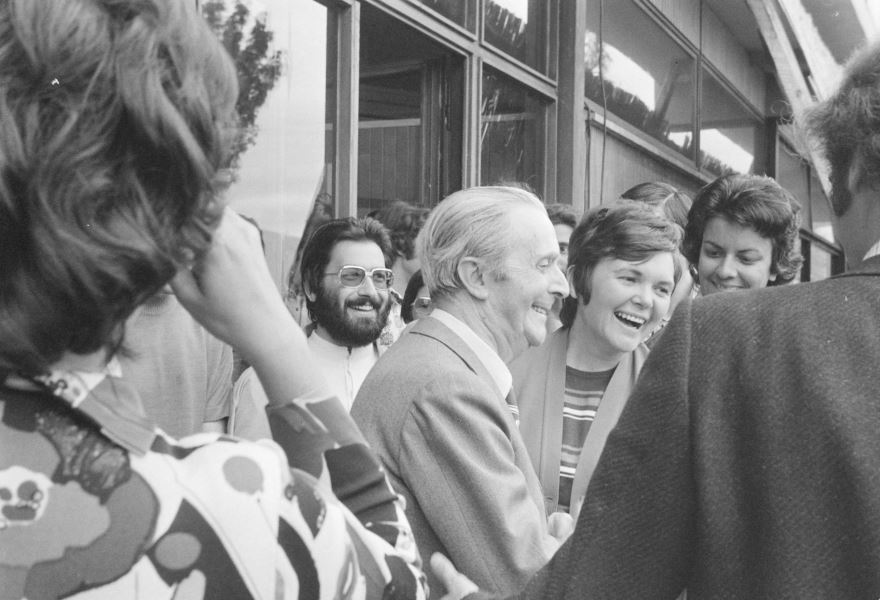
Nov 17, 2018 | Non categorizzato

Igino Giordani during a visit to Loppiano
Nov 16, 2018 | Non categorizzato
The World Day of the Poor will be celebrated on Sunday, 18 November. It was established by Pope Francis in 2016, at the end of the Jubilee of Mercy with the title “This poor man cried and the Lord heard him” (Ps 34.7). In his message for that occasion the Pope wrote: “This Psalm allows us today, to immerse ourselves in many forms of poverty, and understand who are the real poor towards whom we should direct our gaze. […] What does the poor man’s cry express if not his suffering and solitude, disappointment and hope? We may wonder: how come this cry, that rises up to God’s presence, is unable to reach our ears and leaves us indifferent and passive? On a Day like this, we are asked to seriously examine our conscience to understand if we are really capable of listening to the poor.” On the occasion of the 2nd World Day of the Poor, we are again invited to open our own homes, and share our meals in a simple and fraternal way, as a sign of solidarity and comfort to the many forms of poverty we can all see with our own eyes.
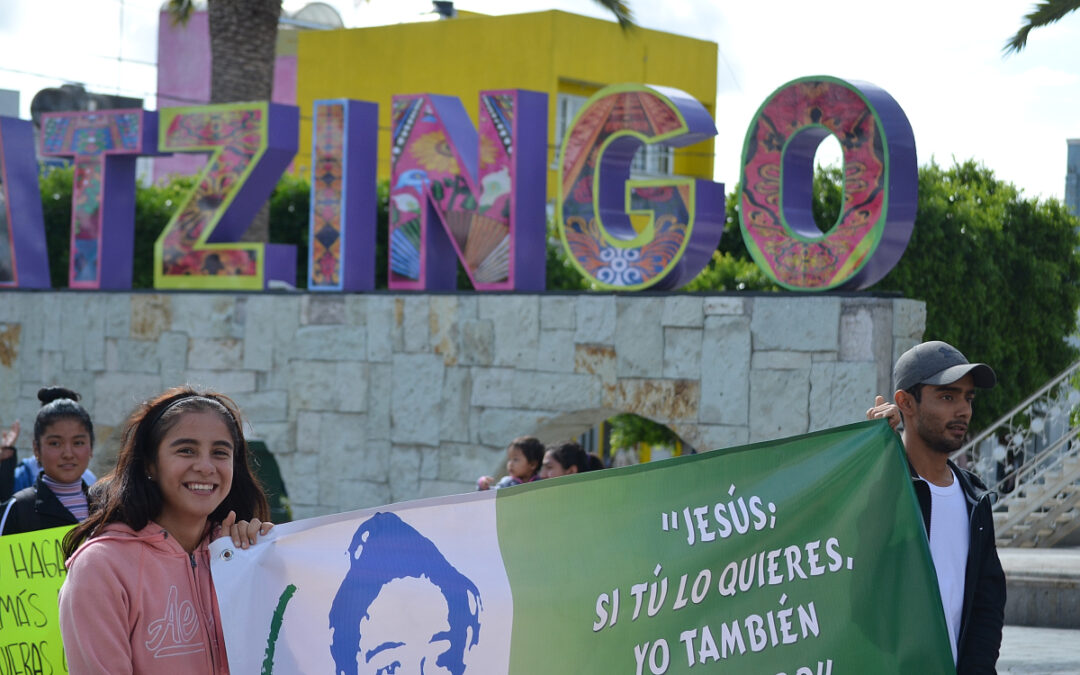
Nov 16, 2018 | Focolare Worldwide
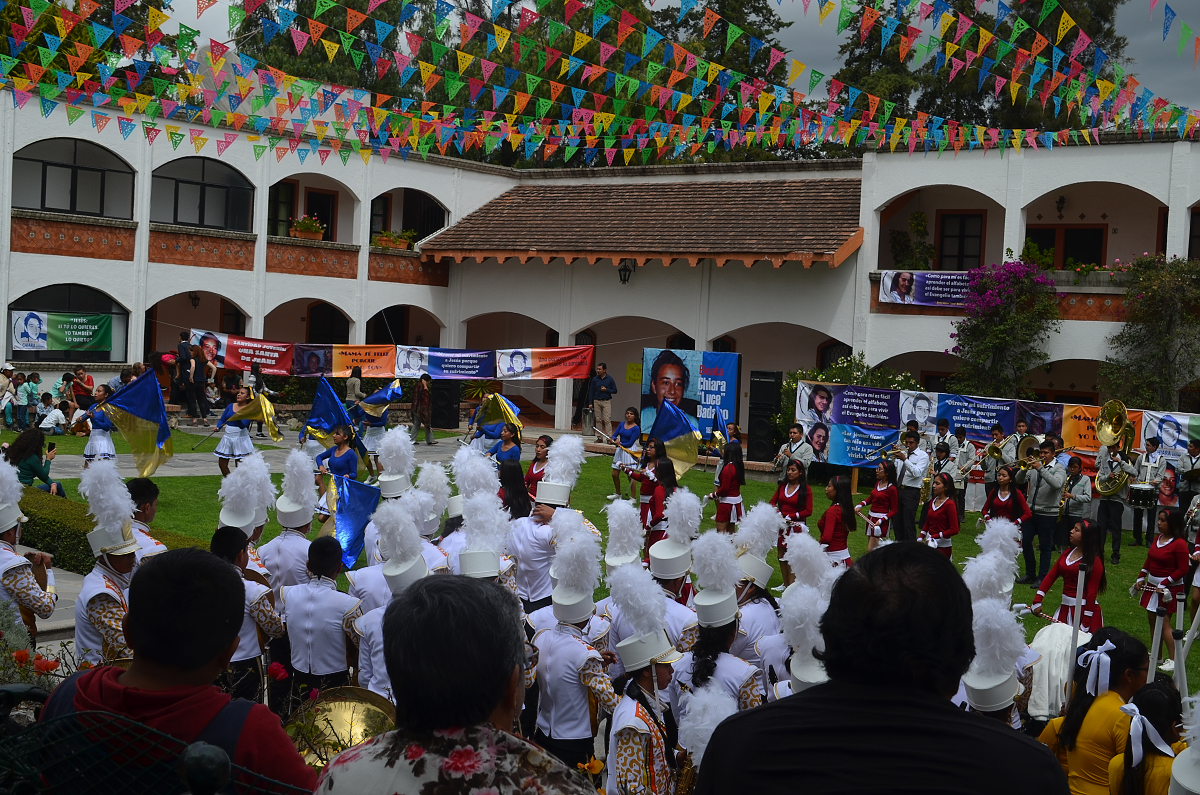 On October 20, just a few days before the date of Chiara Luce Badano’s feast day, which has now been set as October 29, there were 300 children and teens who lined the streets of Acatzingo, in the Mexican state of Puebla. They were there early in the morning to honor Chiara Luce, who they call “blessed for our times.” The celebration began with music and dance marked by joy and more than a few decibels, organized by the Focolare community and including five local school groups. In 2012 a chapel had been dedicated to the young Badano at “El Diamante”, the Focolare’s little town that is the beating heart of the community there. Since then there has been a contagious call to a full and joyful following of the will of God – “a splendid design that, little by little, reveals itself,” according to Chiara Luce’s words. It is a call that reaches many young people each year, engaging “heads, hearts, hands.” Inspired by the words of Pope Francis, who during the recent synod held up many young people as models of holiness, these children displayed thoughts and moments from Chiara Badano’s life in an atmosphere of friendship and celebration.
On October 20, just a few days before the date of Chiara Luce Badano’s feast day, which has now been set as October 29, there were 300 children and teens who lined the streets of Acatzingo, in the Mexican state of Puebla. They were there early in the morning to honor Chiara Luce, who they call “blessed for our times.” The celebration began with music and dance marked by joy and more than a few decibels, organized by the Focolare community and including five local school groups. In 2012 a chapel had been dedicated to the young Badano at “El Diamante”, the Focolare’s little town that is the beating heart of the community there. Since then there has been a contagious call to a full and joyful following of the will of God – “a splendid design that, little by little, reveals itself,” according to Chiara Luce’s words. It is a call that reaches many young people each year, engaging “heads, hearts, hands.” Inspired by the words of Pope Francis, who during the recent synod held up many young people as models of holiness, these children displayed thoughts and moments from Chiara Badano’s life in an atmosphere of friendship and celebration. 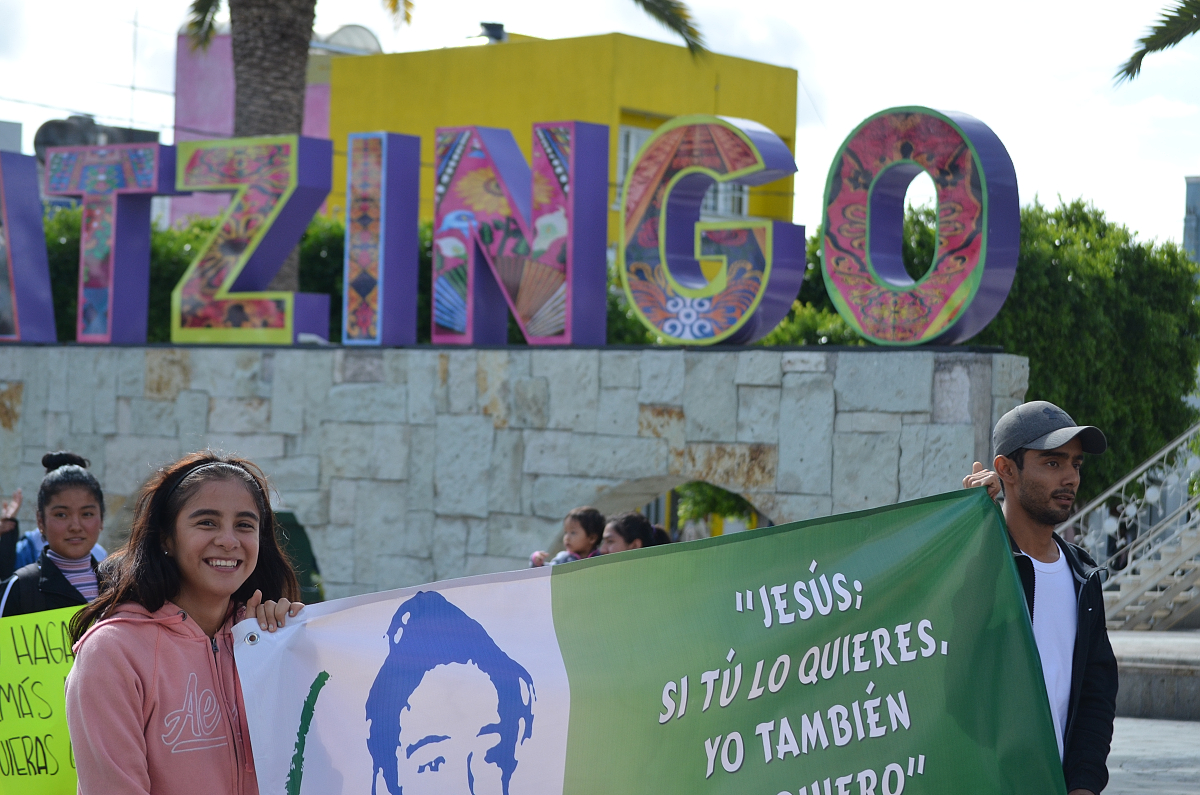 Just a few miles from El Diamante in the city of Acatzingo, which has suffered a wave of violence in past months, those watching were invited to roll the Cube of Love. Like in many countries of the world, this highly symbolic act is an invitation to individuals and society to take on initiatives of peace. The celebrations then continued at El Diamante, with dance, music, theatre, the sharing of experiences and games, with more than 500 attending. It had been put together by the young people from the school of formation there. “Chiara Luce is for us a beacon that urges us to live for a great ideal.” Other schools and colleges in Acatzingo have already signed up for future celebrations. Mariapoli El Diamante, 20 ottobre 2018
Just a few miles from El Diamante in the city of Acatzingo, which has suffered a wave of violence in past months, those watching were invited to roll the Cube of Love. Like in many countries of the world, this highly symbolic act is an invitation to individuals and society to take on initiatives of peace. The celebrations then continued at El Diamante, with dance, music, theatre, the sharing of experiences and games, with more than 500 attending. It had been put together by the young people from the school of formation there. “Chiara Luce is for us a beacon that urges us to live for a great ideal.” Other schools and colleges in Acatzingo have already signed up for future celebrations. Mariapoli El Diamante, 20 ottobre 2018
Nov 15, 2018 | Non categorizzato
Every year, since 2002, a World Day has been dedicated to philosophy. By proclaiming the Day, UNESCO has underscored the value of philosophy for the development of human thought. Ex-General Director Irina Bokova, went on to say: “Philosophical reflection is a calling back to humility, to reflection and reasonable dialogue, to build solutions together to the challenges that are beyond our control. […] The more the difficulties are large, the more philosophy is useful for giving sense to the questions of peace and sustainable development.” On this Day, all UNESCO partners – national governments, public organisations and institutions, NGOs, universities, schools, along with citizens and associations – are called to a free, collective, reasonable and informed reflection on the challenges of our times. “Philosophy’s genuine value,” said Moufida Goucha, ex-director of the ‘Human Safety, Democracy and Philosophy,’ Section, “is to establish a dialogue that should never interrupt over the essential,” along with the task of restoring, “a large portion of human dignity, whatever our conditions.”
Nov 15, 2018 | Focolare Worldwide
According to the latest estimates more than 440 thousand, of the more than 2 million and 300 thousand people, who fled Venezuela from 2014 until now, have crossed the Peru border. They arrive after a very exhausting journey, uncertain about their future and surrounded by many dangers, including the recent need to cross a river by boat. “If the water is too high, and they can’t manage it, they’re loaded onto the shoulders of a man who naturally wants to be paid.” Once again Silvano from the focolare community in Lima writes: “Right from the start of this forced exodus “we have been accompanying an ever increasing number of people. Up until now, there are sixty whom we follow closely, not only spiritually, but also professionally and on a purely human level.” The situation is extremely difficult for those who arrive: “They only have the clothes on their backs. They’re cold because spring has begun and the temperatures are falling. We see the emotion in their eyes when they see the clothing that has been collected for them through a communion of goods.” The Focolare has two welcome centers in Lima, along with the Centro Fiore at Magdalena del Mar in the province of the capital. “Three family units are being hosted here, including the family of Ofelia who many Venezuelans in Peru call “the mother.” In the first quarter of this year,” Silvan recounts, “we came into contact with a psychologist, Irene, who has already been here a few months. She was invited to our operating centre, which is the focolare house, along with her parents and a few friends. She got to know the spirit behind the Focolare and, aware of the needs of her many fellow-countrymen, offered her services as a professional psychologist. A small project was immediately begun in response to the Gospel promise: “Give, and it will be given to you.” After a workshop on the topic of feelings, which was given by Irene at the end of July and a second one a few weeks later, we opened a consultancy service at Centro Fiore of Magdalena del Mar. “The “Project of Emotional Growth for Vulnerable Populations” was begun, to respond to the massive migratory situation that we are facing. In the presentation of the project, which is geared towards the most fragile members of the group such as women, children, youth and elderly, it is written that ‘providing tools for facing the situation and integrating’ into the Peruvian community is imperative. Therefore, this Project enters into the objectives of the Focolare, to “collaborate in the building of a more united world under the guidance of Jesus’ prayer to the Father that all may be one (Jn17:21), respecting and appreciating diversity, using dialogue as the method, and the constant effort of building bridges and relationships of fraternity among individuals, peoples and cultural groups.” The most common cases that have already been treated include anxiety and depression over the precarious situations, the constant concern for survival, mistreatment and developmental problems. The project provides support, information, education, and training courses, workshops on feelings and emotions, self-esteem, love of others and of oneself.” Several of the people have found employment, others are still searching, and others are planning to return to their own or to another country. “Up until now 35 sessions of psychological care have been recorded. This service continues to be offered for free to Venezuelan immigrants.”
Nov 14, 2018 | Non categorizzato
Replay streaming: http://collegamentoch.focolare.org/
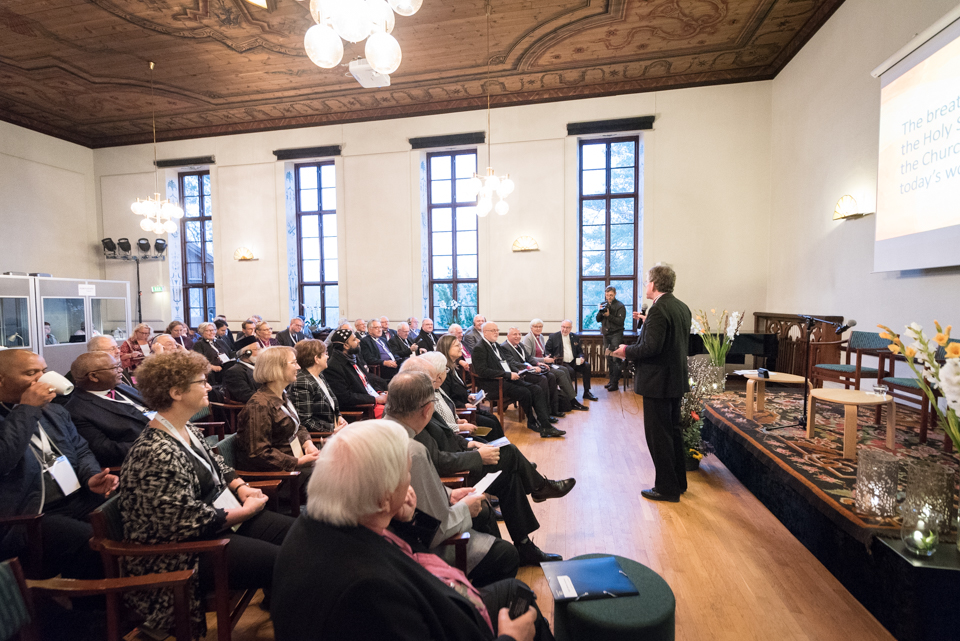
Nov 14, 2018 | Focolare Worldwide
 How does the Holy Spirit work in today’s Church? Does it still make sense to talk about an ecumenical journey at a time marked by fragmentation, complexity, scandals and humanitarian challenges even for Christians? Two years after the Lund event, that gave a new impetus to the ecumenical dialogue, 40 Bishops of various Churches, from 18 different countries, met in Sigtuna, Sweden. This conference, promoted by the Focolare Movement, was held from 6 to 9 November and its theme was “The Breath of the Spirit, the Church in today’s world”. Maria Voce, president of the Focolare Movement, Jesús Morán co-president and representatives of the Focolare Community in Sweden also attended this conference. Maria Voce spoke about “The Breath of the Spirit, soul of the Church, in the experience and thought of Chiara Lubich”, while Jesús Morán presented present-day challenges from the perspective of the spirituality of unity. This conference, which has come to its 37th edition, owes its origin to an experience of synodality and communion, which John Paul II had proposed to Klaus Hemmerle, Bishop of Aachen.
How does the Holy Spirit work in today’s Church? Does it still make sense to talk about an ecumenical journey at a time marked by fragmentation, complexity, scandals and humanitarian challenges even for Christians? Two years after the Lund event, that gave a new impetus to the ecumenical dialogue, 40 Bishops of various Churches, from 18 different countries, met in Sigtuna, Sweden. This conference, promoted by the Focolare Movement, was held from 6 to 9 November and its theme was “The Breath of the Spirit, the Church in today’s world”. Maria Voce, president of the Focolare Movement, Jesús Morán co-president and representatives of the Focolare Community in Sweden also attended this conference. Maria Voce spoke about “The Breath of the Spirit, soul of the Church, in the experience and thought of Chiara Lubich”, while Jesús Morán presented present-day challenges from the perspective of the spirituality of unity. This conference, which has come to its 37th edition, owes its origin to an experience of synodality and communion, which John Paul II had proposed to Klaus Hemmerle, Bishop of Aachen. 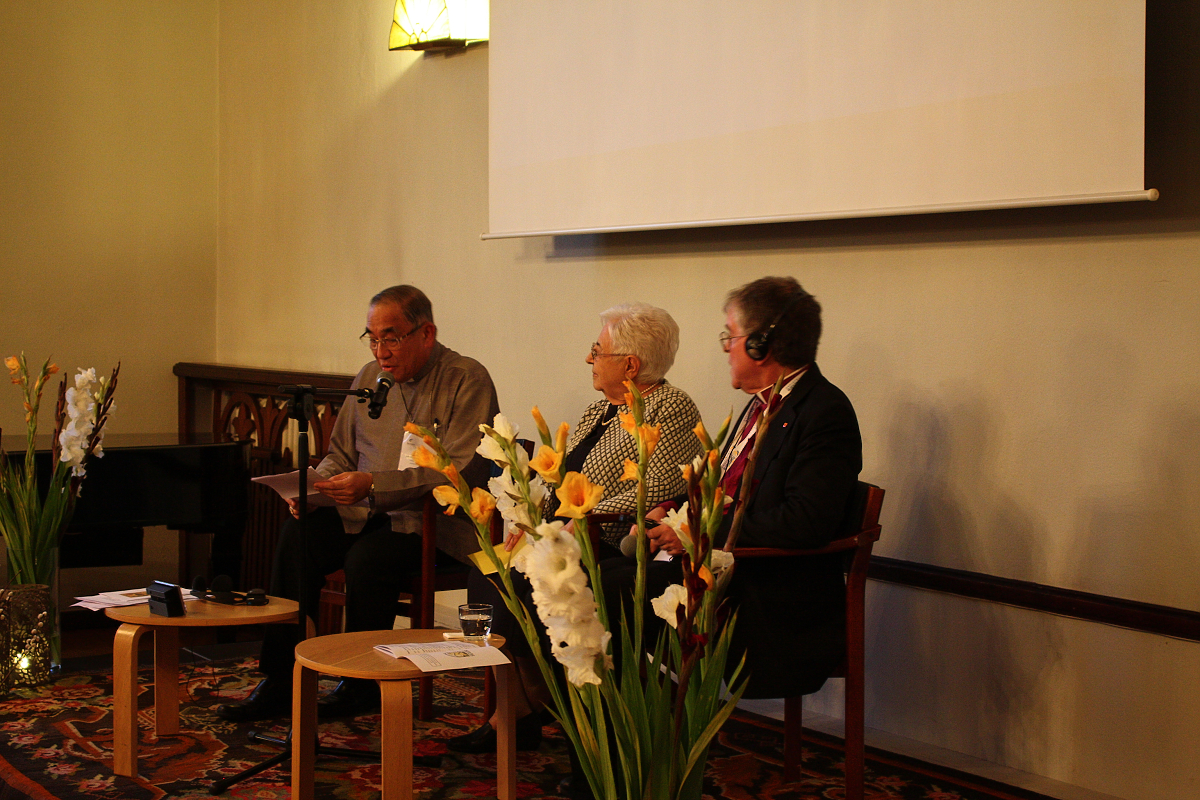 “In addition to our different recounts, we wanted to give ample space to dialogue and sharing about the ecumenical challenges we live in our countries and continents”, said Cardinal Francis Kriengsak Kovithavanij, Archbishop of Bangkok and moderator of the conference. Mons. Brendan Leahy, the Catholic Bishop of the diocese of Limerick, Ireland dealt with the important theme of reconciliation. While speaking about the power of forgiveness in the context of the scandals that hit the Irish Church, he said: “The Spirit urges us not to be robbed of hope (see Rom 8). Discouragement is a great temptations, but the Spirit keeps our hope alive and helps us restart to live a new committment in the Christian adventure of unity and reconciliation”. The Anglican Bishop Trevor Williams, an Irish man, spoke about his experience as a pastor. For several years he has been having under his care the ecumenical community of Corrymeela, in Northern Ireland, who has contributed much towards the path of reconciliation between the different factions in conflict. “Reconciliation is not an option; it is a necessity if we want peace to last. We live in a world of “they” and “we”. But in truth there is only “we”. Revealing this truth is work of reconciliation, work of the Holy Spirit”.
“In addition to our different recounts, we wanted to give ample space to dialogue and sharing about the ecumenical challenges we live in our countries and continents”, said Cardinal Francis Kriengsak Kovithavanij, Archbishop of Bangkok and moderator of the conference. Mons. Brendan Leahy, the Catholic Bishop of the diocese of Limerick, Ireland dealt with the important theme of reconciliation. While speaking about the power of forgiveness in the context of the scandals that hit the Irish Church, he said: “The Spirit urges us not to be robbed of hope (see Rom 8). Discouragement is a great temptations, but the Spirit keeps our hope alive and helps us restart to live a new committment in the Christian adventure of unity and reconciliation”. The Anglican Bishop Trevor Williams, an Irish man, spoke about his experience as a pastor. For several years he has been having under his care the ecumenical community of Corrymeela, in Northern Ireland, who has contributed much towards the path of reconciliation between the different factions in conflict. “Reconciliation is not an option; it is a necessity if we want peace to last. We live in a world of “they” and “we”. But in truth there is only “we”. Revealing this truth is work of reconciliation, work of the Holy Spirit”.  The German Evangelical-Lutheran pastor Jens-Martin Kruse shared his pastoral experience in Rome, an ecumenical laboratory that functions also thanks to Pope Francis. The Archbishop Antje Jackelén, Primate of the Church of Sweden, Cardinal Anders Arborelius, the Catholic Bishop of Stockholm, and Bishop Munib Younan, former president of the Lutheran World Federation, who presided over the historical ecumenical liturgy in Lund together with Pope Francis in 2016, spoke about the journey of common reflection that continues after the 500 years commemoration of the Reformation. “I assure you the Holy Spirit guided us and continues to guide us towards an ecumenical springtime. It is up to us now to reap the fruits of unity. Today we say: let us journey together as living witnesses in our fragmented world so that the world will believe.” One of the highlights of this conference was the ecumenical prayer in the ancient Church of Sigtuna and the signing of the “Pact of Unity”. With the signing of this Pact, the Bishops committed themselves to journey along the path of effective and affective communion, “to love the Church of the other as one’s own”. This commitment was sealed with one’s own signature and a fraternal embrace. Stefania Tanesini
The German Evangelical-Lutheran pastor Jens-Martin Kruse shared his pastoral experience in Rome, an ecumenical laboratory that functions also thanks to Pope Francis. The Archbishop Antje Jackelén, Primate of the Church of Sweden, Cardinal Anders Arborelius, the Catholic Bishop of Stockholm, and Bishop Munib Younan, former president of the Lutheran World Federation, who presided over the historical ecumenical liturgy in Lund together with Pope Francis in 2016, spoke about the journey of common reflection that continues after the 500 years commemoration of the Reformation. “I assure you the Holy Spirit guided us and continues to guide us towards an ecumenical springtime. It is up to us now to reap the fruits of unity. Today we say: let us journey together as living witnesses in our fragmented world so that the world will believe.” One of the highlights of this conference was the ecumenical prayer in the ancient Church of Sigtuna and the signing of the “Pact of Unity”. With the signing of this Pact, the Bishops committed themselves to journey along the path of effective and affective communion, “to love the Church of the other as one’s own”. This commitment was sealed with one’s own signature and a fraternal embrace. Stefania Tanesini
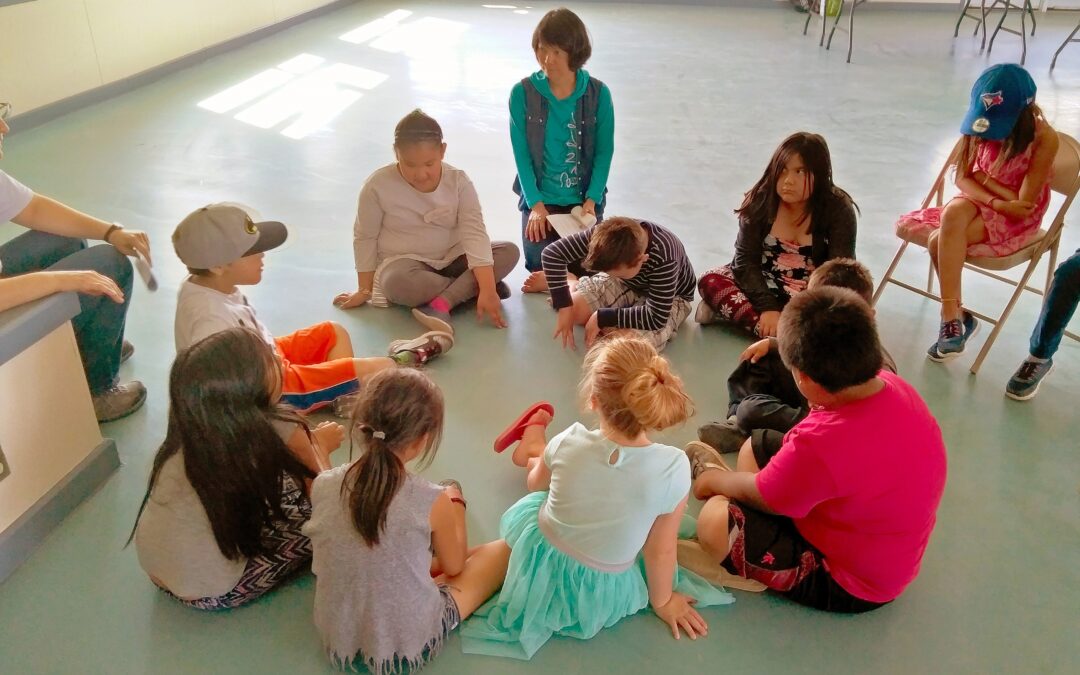
Nov 13, 2018 | Focolare Worldwide
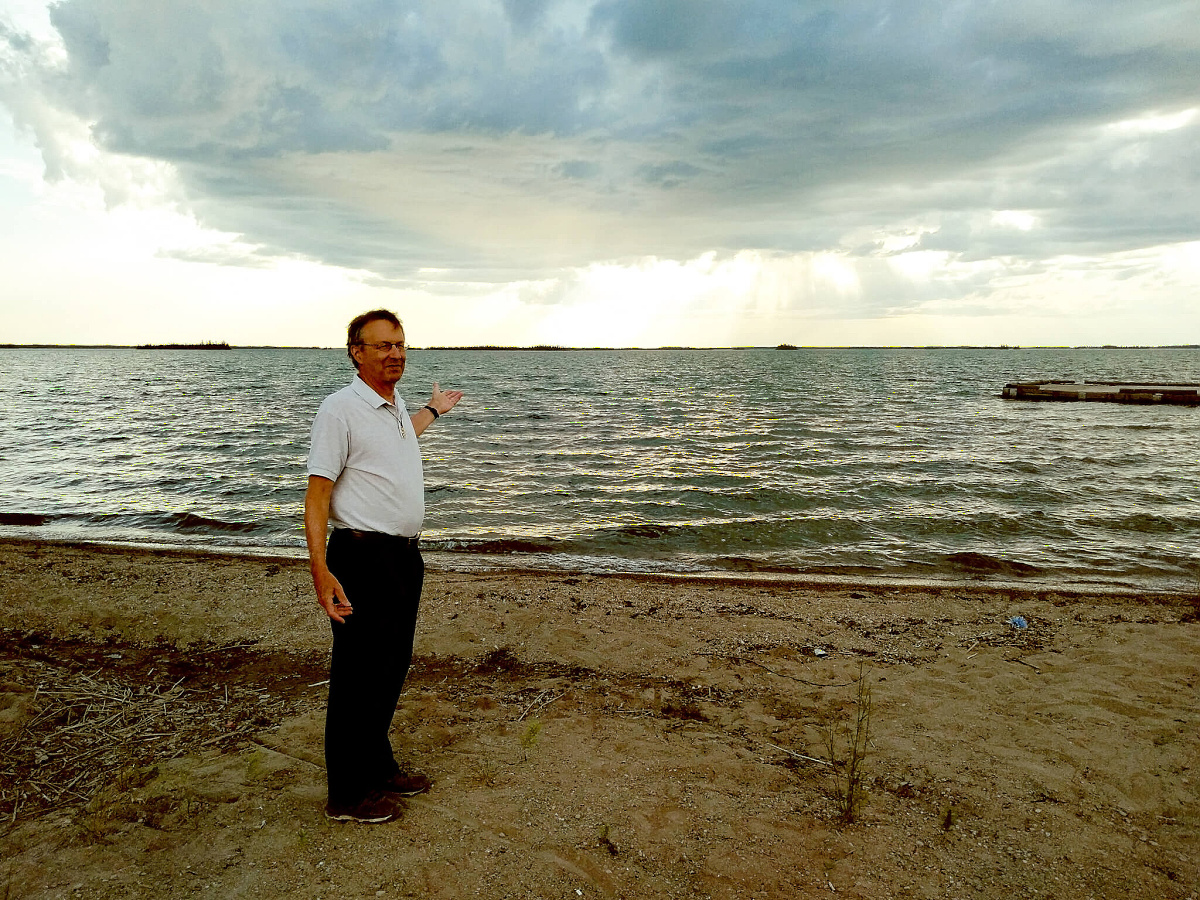 It was a lake so clear you could see the bottom and drink the water with your cupped hands from the canoe. It seemed the perfect world. Yet here and there a plastic bottle was stuck in the bank, held down by low roots. In that extraordinarily beautiful landscape, it was a punch in the eye. Alek’s story is rich with images such as this. He was among the four people who were part of a temporary Focolare at Whati, in Canada, from July 19 to August 20, 2018. “We’re talking about the Great North, almost at the Arctic Circle, a town with 800 inhabitants. It seemed even less, since the meeting of the Tlicho people (Tłı̨chǫ in their original language) had just ended, and many of the locals had left for vacation. “The Tlicho people are Native Americans (called “First Nations” in Canada), who can be found throughout North America. They are part of the Dene, an association of Native Americans in the Northwest Territories, and they live in an area called Tlicho Land, which has four towns with a total population of close to 2,000 people. Whati, which in its native language is Wha Ti, is one of these towns. It’s on beautiful Lac La Martre, which at its widest point is a good 70 km.”
It was a lake so clear you could see the bottom and drink the water with your cupped hands from the canoe. It seemed the perfect world. Yet here and there a plastic bottle was stuck in the bank, held down by low roots. In that extraordinarily beautiful landscape, it was a punch in the eye. Alek’s story is rich with images such as this. He was among the four people who were part of a temporary Focolare at Whati, in Canada, from July 19 to August 20, 2018. “We’re talking about the Great North, almost at the Arctic Circle, a town with 800 inhabitants. It seemed even less, since the meeting of the Tlicho people (Tłı̨chǫ in their original language) had just ended, and many of the locals had left for vacation. “The Tlicho people are Native Americans (called “First Nations” in Canada), who can be found throughout North America. They are part of the Dene, an association of Native Americans in the Northwest Territories, and they live in an area called Tlicho Land, which has four towns with a total population of close to 2,000 people. Whati, which in its native language is Wha Ti, is one of these towns. It’s on beautiful Lac La Martre, which at its widest point is a good 70 km.” 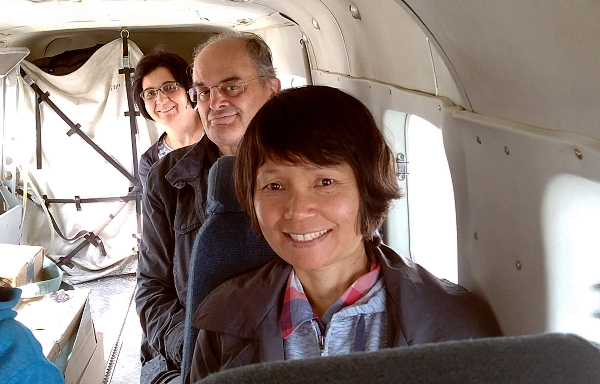 With the youth group, Alek and Fr. Alain organized the cleanup of a stretch of shoreline. “It was just a gesture,” he says, “yet afterwards we heard that one of the residents there brought this to the chief’s attention, and the cleanup has now become a regular activity throughout the year.” This too was a result of the temporary Focolare at Whati. Besides Alek (an Italian who lives in Birmingham, Alabama) and Fr. Alain (a priest from Montreal), the group was made up of Lioba from the Focolare of Vancouver and Ljubica from that of Toronto. The reason for their journey was a request from the bishop of Yellowknife, the capital of the Northwest Territories, to have a few people from the Focolare community come to the area (covering the costs) to give the residents, at least for one month of the year, the chance to come together spiritually and receive some training on Gospel living. At the same time, another group was having a similar experience at the village of Fort Resolution.
With the youth group, Alek and Fr. Alain organized the cleanup of a stretch of shoreline. “It was just a gesture,” he says, “yet afterwards we heard that one of the residents there brought this to the chief’s attention, and the cleanup has now become a regular activity throughout the year.” This too was a result of the temporary Focolare at Whati. Besides Alek (an Italian who lives in Birmingham, Alabama) and Fr. Alain (a priest from Montreal), the group was made up of Lioba from the Focolare of Vancouver and Ljubica from that of Toronto. The reason for their journey was a request from the bishop of Yellowknife, the capital of the Northwest Territories, to have a few people from the Focolare community come to the area (covering the costs) to give the residents, at least for one month of the year, the chance to come together spiritually and receive some training on Gospel living. At the same time, another group was having a similar experience at the village of Fort Resolution. 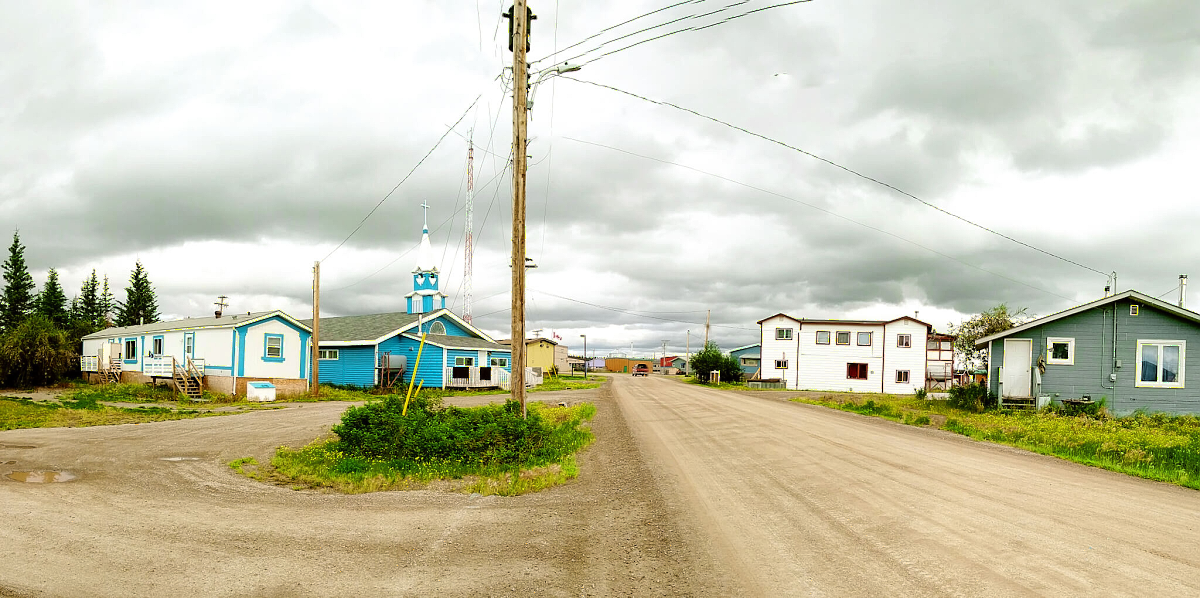 “We were at Yellowknife for a few days, having come from our cities, after trips that were pretty adventurous because of the weather. There we got the chance to know each other and receive the bishop’s blessing.” “Arriving together at Whati, we were there for a total of four weeks, to renew relationships that had begun the year before from another similar experience. We were there to get to know the local leaders and to contribute to a few projects started by the tribal leadership. The second week we organized a Bible camp for the kids, and the third week, at the request of the local leaders, we went to meet some of the elders of the village. It was moving to pray together with them. It seemed to us that there was communication that went beyond any difficulty to understand their language.”
“We were at Yellowknife for a few days, having come from our cities, after trips that were pretty adventurous because of the weather. There we got the chance to know each other and receive the bishop’s blessing.” “Arriving together at Whati, we were there for a total of four weeks, to renew relationships that had begun the year before from another similar experience. We were there to get to know the local leaders and to contribute to a few projects started by the tribal leadership. The second week we organized a Bible camp for the kids, and the third week, at the request of the local leaders, we went to meet some of the elders of the village. It was moving to pray together with them. It seemed to us that there was communication that went beyond any difficulty to understand their language.” 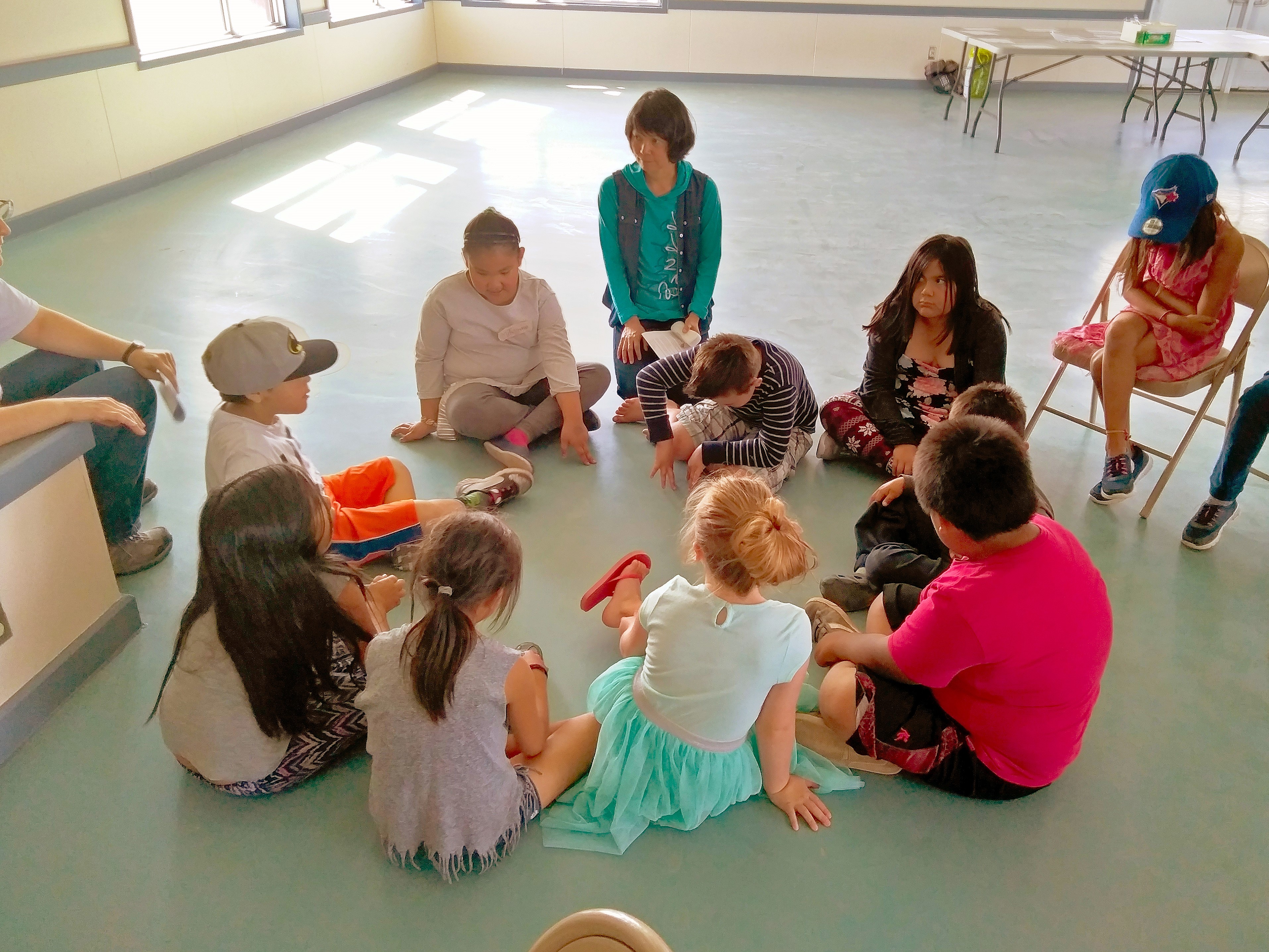 The people of that place are suffering from a difficult transition from tradition to modernity. “In the space of one generation,” Alek explains, “they found themselves entirely deprived of the roots that had been their deepest identity, perhaps for thousands of years. Those of my generation were born and lived in teepees, and speak Tlicho. Their grandchildren no longer speak the traditional language, use smartphones and are taken by consumerism and all its consequences, including alcohol and drugs. “Yet, the community is still driven by a simple, deep faith that is based on reading the Bible and the natural spirituality of its people, who are still sensitive to spiritual things. “For my part, it was a chance to meet face to face with some of these stories. With them I felt at home, perhaps as never before. I was also a way for them to be touched by God.”
The people of that place are suffering from a difficult transition from tradition to modernity. “In the space of one generation,” Alek explains, “they found themselves entirely deprived of the roots that had been their deepest identity, perhaps for thousands of years. Those of my generation were born and lived in teepees, and speak Tlicho. Their grandchildren no longer speak the traditional language, use smartphones and are taken by consumerism and all its consequences, including alcohol and drugs. “Yet, the community is still driven by a simple, deep faith that is based on reading the Bible and the natural spirituality of its people, who are still sensitive to spiritual things. “For my part, it was a chance to meet face to face with some of these stories. With them I felt at home, perhaps as never before. I was also a way for them to be touched by God.”
Nov 12, 2018 | Focolare Worldwide
With an estimated 31 victims thus far, the huge fire that developed in California has broken the record as the worst burning in the history of the Golden State. An additional 220 people are still missing. The main fire that developed north of the capital of Sacramento is still partially out of control. In this area of the Sierra Nevada there has been very severe devastation. The town of Paradise with 27 thousand inhabitants was completely swept away by the flames, with a high number of victims, at least 14. There are two other smaller fronts further south between Los Angeles County and Ventura County. In total, more than 300 thousand people have been displaced from north to the south of the State. In the most affected areas, the scene appears ghostly, with woods and villages reduced to ash heaps and a few areas completely deserted. The strong winds of up to over 110 kilometres an hour, caused a spectacular and devastating “fire tornado” that incinerated everything in its path. This is just one of the umpteenth environmental disasters that have been happening all over the world because of climate change, but also because of the lack of care for the environment.
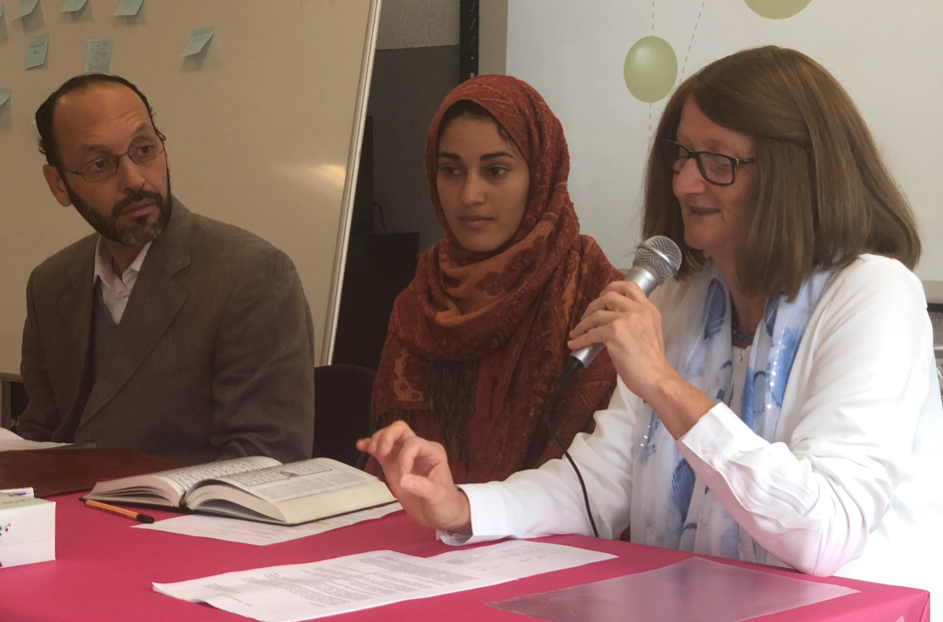
Nov 12, 2018 | Focolare Worldwide
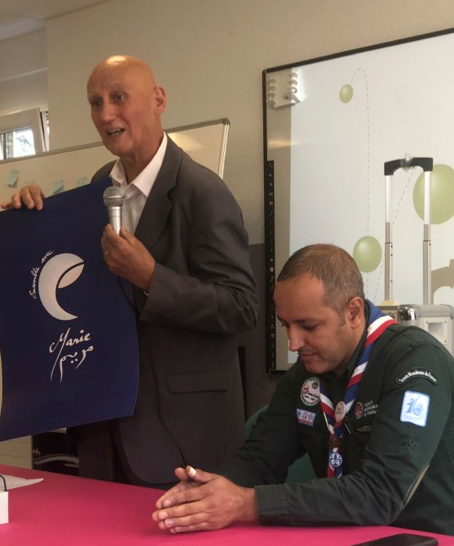 Indifference and mistrust are often born from fear and from a lack of knowledge about one another. In order to face the growing tensions of identity that undermine society, there are many very fruitful opportunities for dialogue and spiritual sharing created by religious institutions and associations. This is the case of Ensemble avec Marie (Together with Mary www.ensembleavecmarie.org) that grew from an experience in Lebanon and has spread through France, Belgium and several African nations, with the goal of promoting and facilitating a more fraternal society, through a more widespread and spiritual approach.” It is open to everyone who is seeking ways of peaceful togetherness while respecting freedom of worship and the right to be different. “Together with Mary” begins from the only woman who is mentioned by name 43 times in the Koran (an entire sura, one of the 114 divisions of the sacred writing is devoted to her) and from the account of the Annunciation, recognized as a true moment of encounter between the Koran and the Gospel. Both traditions, Christian and Muslim acknowledge the virginal conception of Jesus in the womb of Mary (Mariam), following the annunciation by the angel Gabriel (Jibril). The day in Lausanne opened with a reading of this sura on Mary in Arabic and French, followed by the Biblical account. “We are collaborating together for the building of a civilisation of love and peace, respecting the identity of each one,” said the president of the Association, Gérard Testard. The Focolare Movement, which is active in ecumenical and interreligious dialogue on a local and international level, is participating in this initiative. “The words dialogue, encounter and communion are essential for me. Both in a vertical and a horizontal direction. This is the reason why I’m committed to everything that helps to contribute to the unity and renewal of the Church,” says Martin Hoegger, member of the focolare community and pastor of the Reformed Evangelical Church in the Swiss Canton of Vaud, who attended the gathering.
Indifference and mistrust are often born from fear and from a lack of knowledge about one another. In order to face the growing tensions of identity that undermine society, there are many very fruitful opportunities for dialogue and spiritual sharing created by religious institutions and associations. This is the case of Ensemble avec Marie (Together with Mary www.ensembleavecmarie.org) that grew from an experience in Lebanon and has spread through France, Belgium and several African nations, with the goal of promoting and facilitating a more fraternal society, through a more widespread and spiritual approach.” It is open to everyone who is seeking ways of peaceful togetherness while respecting freedom of worship and the right to be different. “Together with Mary” begins from the only woman who is mentioned by name 43 times in the Koran (an entire sura, one of the 114 divisions of the sacred writing is devoted to her) and from the account of the Annunciation, recognized as a true moment of encounter between the Koran and the Gospel. Both traditions, Christian and Muslim acknowledge the virginal conception of Jesus in the womb of Mary (Mariam), following the annunciation by the angel Gabriel (Jibril). The day in Lausanne opened with a reading of this sura on Mary in Arabic and French, followed by the Biblical account. “We are collaborating together for the building of a civilisation of love and peace, respecting the identity of each one,” said the president of the Association, Gérard Testard. The Focolare Movement, which is active in ecumenical and interreligious dialogue on a local and international level, is participating in this initiative. “The words dialogue, encounter and communion are essential for me. Both in a vertical and a horizontal direction. This is the reason why I’m committed to everything that helps to contribute to the unity and renewal of the Church,” says Martin Hoegger, member of the focolare community and pastor of the Reformed Evangelical Church in the Swiss Canton of Vaud, who attended the gathering.  And Gwenaelle Dalalande, who is involved in interreligious dialogue, commented: “Talking about Mary as a model was a very vast topic. I made a choice and wanted to emphasise just a few aspects. Some moments of her life are able to enrich some of the moments in our lives. Regarding the Annunciation, I asked: ‘Are there perhaps moments of our lives that are annunciations?’ They are the moments when God manifests himself and we are called to respond to him. Chiara Lubich emphasises the connection between the Word of God and Mary, presenting her as the one who is “completely clothed with the Word.” In the end, I also shared a personal experience. Mary’s example and her perseverance through suffering helped me to overcome a very difficult period in my life. Renewing my yes to God as she had done, I rediscovered a new life.” Naceur Ghomraci, Imam and spiritual assistant at the jail in the Canton of Vaud: “The strength and commitment of Chiara Lubich are a great discovery for all the faithful. Her invitation to place at the basis of our actions the Golden Rule (Do to others as you would have them do to you, which is present in all religions) struck me very much. This is a project of God that all have to contribute to.” In his community they are in the process of building a new mosque. “I’d like it to be dedicated to Mary,” said the Imam who had attended the international congress of Muslims and Christians, organized by the Focolare Movement last April. Imam Abdel Ahid Kort, who runs the centre that hosted the gathering, described Mary as “a mystery, a fathomless ocean,” expressing the opinion of many Muslim exegetes: “A prophetess and a fulfilled woman, who brings us from an individual spirituality, her communion with God, to an active spirituality, the encounter with others; always animated by love. How did she overcome her trials? She did it in silence, in prayer and in altruism. She lived the real fasting: that of the heart, of words and of worldly vanities.” Who is her son, Jesus, for the Imam? “He is the smile and humility of my Christian brothers and sisters. He teaches me forgiveness and love for my enemy.
And Gwenaelle Dalalande, who is involved in interreligious dialogue, commented: “Talking about Mary as a model was a very vast topic. I made a choice and wanted to emphasise just a few aspects. Some moments of her life are able to enrich some of the moments in our lives. Regarding the Annunciation, I asked: ‘Are there perhaps moments of our lives that are annunciations?’ They are the moments when God manifests himself and we are called to respond to him. Chiara Lubich emphasises the connection between the Word of God and Mary, presenting her as the one who is “completely clothed with the Word.” In the end, I also shared a personal experience. Mary’s example and her perseverance through suffering helped me to overcome a very difficult period in my life. Renewing my yes to God as she had done, I rediscovered a new life.” Naceur Ghomraci, Imam and spiritual assistant at the jail in the Canton of Vaud: “The strength and commitment of Chiara Lubich are a great discovery for all the faithful. Her invitation to place at the basis of our actions the Golden Rule (Do to others as you would have them do to you, which is present in all religions) struck me very much. This is a project of God that all have to contribute to.” In his community they are in the process of building a new mosque. “I’d like it to be dedicated to Mary,” said the Imam who had attended the international congress of Muslims and Christians, organized by the Focolare Movement last April. Imam Abdel Ahid Kort, who runs the centre that hosted the gathering, described Mary as “a mystery, a fathomless ocean,” expressing the opinion of many Muslim exegetes: “A prophetess and a fulfilled woman, who brings us from an individual spirituality, her communion with God, to an active spirituality, the encounter with others; always animated by love. How did she overcome her trials? She did it in silence, in prayer and in altruism. She lived the real fasting: that of the heart, of words and of worldly vanities.” Who is her son, Jesus, for the Imam? “He is the smile and humility of my Christian brothers and sisters. He teaches me forgiveness and love for my enemy.
Nov 11, 2018 | Non categorizzato
11 November commemorates the centennial of the end of the First World War, which was followed by the Peace Conference in Paris (18 January 1919 – 21 January 1920). But for at least another 5 years all of Europe was beset by continual revolutions and violence of all kinds. From Finland to Anatolia, from the Caucasus to Ireland, from Germany to Greece. “Wars are always tragic, affirmed the President of the Italian Republic, Sergio Materella, last 4 November. And citing the words of the writer, Claudio Magris, “Every country thought of teaching a good lesson to the nearest enemy, benefitting in territorial and other advantages. Nobody could have imagined that war would have been so tremendous, and would have lasted so long.” In our time, still marked by winds of war, may the recurrence of the centennial be a warning to persevere in the process of European integration and unification, the only guarantees for an enduring peace.”
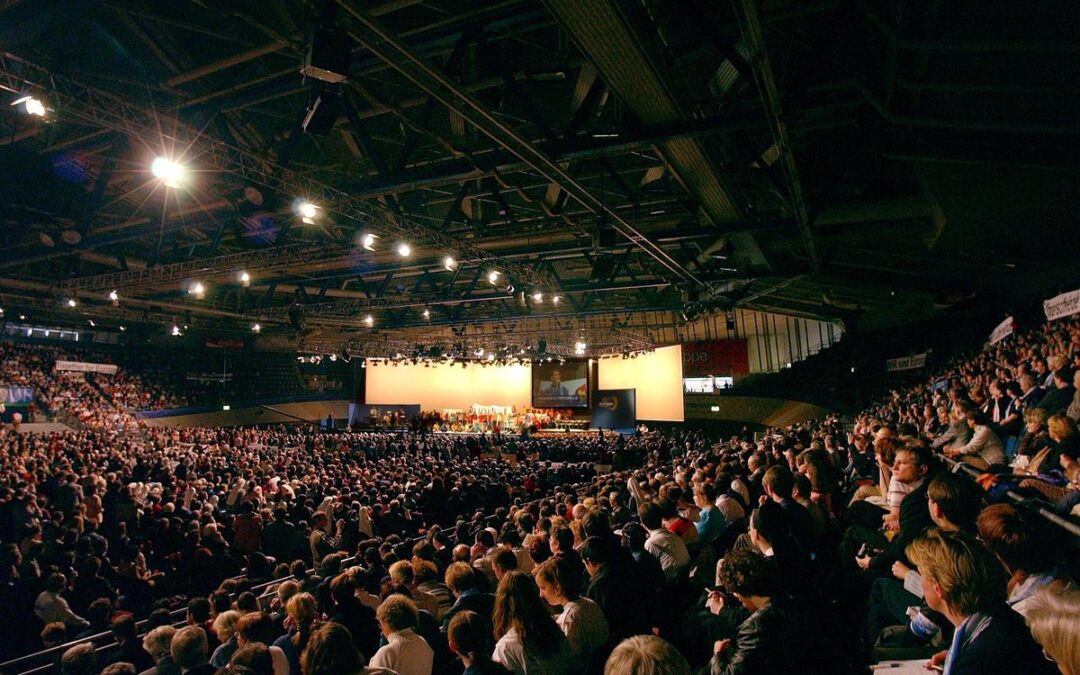
Nov 10, 2018 | Focolare Worldwide
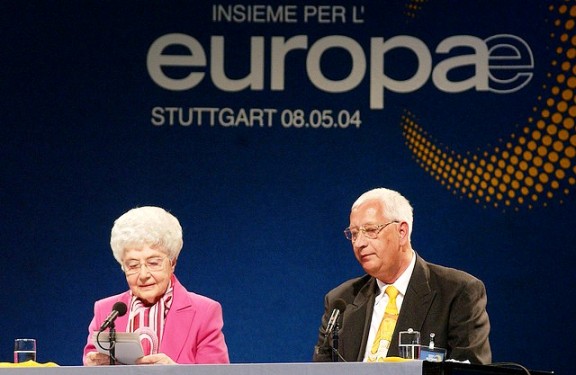 «Universal brotherhood was also the project of people who were not motivated by religious motives, but simply by the desire to benefit humanity. The French Revolution’s motto: “liberty, equality, fraternity”, summarizes the great political project of modernity, a project which, in part, has been disregarded. While numerous countries have built democratic systems of government and have succeeded in achieving some degree of liberty and equality, the same cannot be said of fraternity which has been proclaimed more than it has been lived. But the one who brought fraternity as the essential gift to humanity was above all Jesus. In revealing the fatherhood of God, He broke down the walls which separate those who are “the same” from those who are “different”, friends from enemies. He loosened all people from the bonds that imprison them, from all forms of slavery and subordination, from every unjust relationship, thus carrying out an authentic existential, cultural and political revolution. (…) The instrument that Jesus offered to us in order to accomplish this universal fraternity was love, a great love, a new love, different from the one we usually know. In fact, He transplanted the way of loving of heaven here on earth. This love requires first of all that we love everyone, therefore, not only relatives and friends. It asks that we love the pleasant and the unpleasant, our fellow-countryman and the stranger, the European and the immigrant, those of our Church and of another, of our religion and of another. Today it asks the countries of Western Europe to love those of Central and Eastern Europe – and vice versa – and it asks everyone to be open to those of other continents. In the vision of its founders, in fact, Europe is a family of sister nations, not closed in itself, but open to a universal mission: Europe wants its unity to contribute, then, to the unity of the human family. This love asks that we love our enemies as well and that we forgive them if they have offended us. After the wars which stained our continent with blood, many Europeans were exemplary in loving their enemies and promoting reconciliation.
«Universal brotherhood was also the project of people who were not motivated by religious motives, but simply by the desire to benefit humanity. The French Revolution’s motto: “liberty, equality, fraternity”, summarizes the great political project of modernity, a project which, in part, has been disregarded. While numerous countries have built democratic systems of government and have succeeded in achieving some degree of liberty and equality, the same cannot be said of fraternity which has been proclaimed more than it has been lived. But the one who brought fraternity as the essential gift to humanity was above all Jesus. In revealing the fatherhood of God, He broke down the walls which separate those who are “the same” from those who are “different”, friends from enemies. He loosened all people from the bonds that imprison them, from all forms of slavery and subordination, from every unjust relationship, thus carrying out an authentic existential, cultural and political revolution. (…) The instrument that Jesus offered to us in order to accomplish this universal fraternity was love, a great love, a new love, different from the one we usually know. In fact, He transplanted the way of loving of heaven here on earth. This love requires first of all that we love everyone, therefore, not only relatives and friends. It asks that we love the pleasant and the unpleasant, our fellow-countryman and the stranger, the European and the immigrant, those of our Church and of another, of our religion and of another. Today it asks the countries of Western Europe to love those of Central and Eastern Europe – and vice versa – and it asks everyone to be open to those of other continents. In the vision of its founders, in fact, Europe is a family of sister nations, not closed in itself, but open to a universal mission: Europe wants its unity to contribute, then, to the unity of the human family. This love asks that we love our enemies as well and that we forgive them if they have offended us. After the wars which stained our continent with blood, many Europeans were exemplary in loving their enemies and promoting reconciliation. 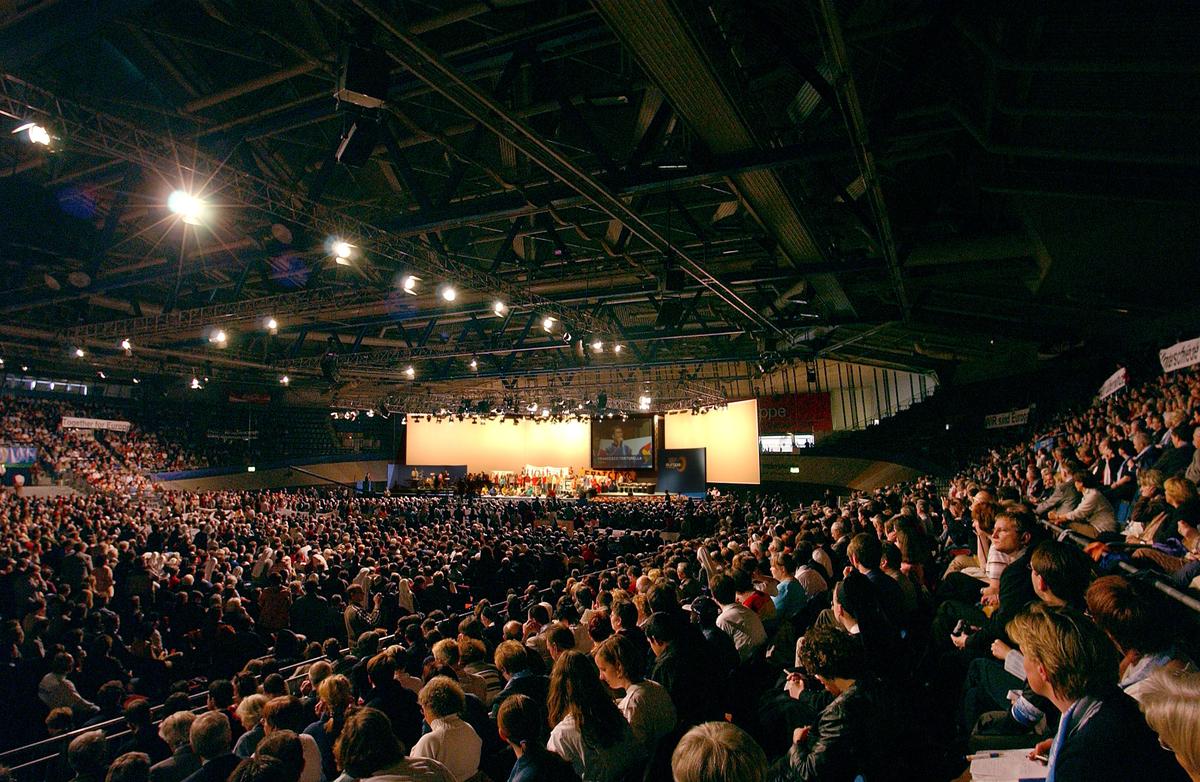 Therefore, the love I am speaking of makes no distinctions and takes into consideration all those we meet in any moment, directly or indirectly: those who are next to us physically, but also those about whom we or others are speaking; those who will receive the work we do day by day, those we come to know about through the newspapers or television…. Because this is the way God our Father loves, making the sun rise on the bad and the good, and causing the rain to fall on the just and the unjust alike (cf Mt 5:45). (…) Furthermore, the love that Jesus brought is not an idealistic, sentimental love, made up of words. It is a concrete love. It needs to be expressed with deeds. And this is possible if we make ourselves all things to all people: sick with those who are sick; joyful with those who are joyful; worried, insecure, hungry, poor with others, feeling in ourselves what they feel and acting accordingly». Chiara Lubich, Stuttgart 8th May 2004
Therefore, the love I am speaking of makes no distinctions and takes into consideration all those we meet in any moment, directly or indirectly: those who are next to us physically, but also those about whom we or others are speaking; those who will receive the work we do day by day, those we come to know about through the newspapers or television…. Because this is the way God our Father loves, making the sun rise on the bad and the good, and causing the rain to fall on the just and the unjust alike (cf Mt 5:45). (…) Furthermore, the love that Jesus brought is not an idealistic, sentimental love, made up of words. It is a concrete love. It needs to be expressed with deeds. And this is possible if we make ourselves all things to all people: sick with those who are sick; joyful with those who are joyful; worried, insecure, hungry, poor with others, feeling in ourselves what they feel and acting accordingly». Chiara Lubich, Stuttgart 8th May 2004
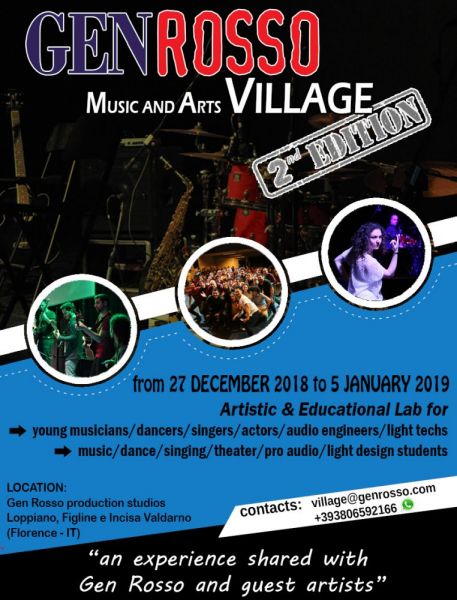
Nov 9, 2018 | Non categorizzato
 After the success of the 1st edition, Gen Rosso (International Performing Arts Group) presents the 2nd edition of “Gen Rosso Music and Arts Village“, a depeening artistic experience and a sharing of values in the light of the charism of unity. The Village, which will take place at Gen Rosso production studios in Loppiano from 27 December 2018 to 5 January 2019, intends to involve young professionals and students of various disciplines such as music, dance, vocals, theater, sound and light engineering, from 18 years old and up.A certificate of participation will be issued at the end of the program. The teaching methodology is designed and managed by Gen Rosso tutors in collaboration with teachers with recognized skills and artistic experience. The program includes the study of specific themes in the arts world, the exchange of experiences, creative spaces and practical workshops that will converge in a final performance. Contributions by professional artists are scheduled for some evenings. The Gen Rosso Village secretary is available to provide further information and all the necessary documentation for registration (limited number). Contacts Secretary VILLAGE: tel +390558339821 (9 am to 1 pm) mobile Franco Gallelli +393806592166 (24h) e-mail village@genrosso.com https://www.youtube.com/watch?v=G9eF6q1PYO4
After the success of the 1st edition, Gen Rosso (International Performing Arts Group) presents the 2nd edition of “Gen Rosso Music and Arts Village“, a depeening artistic experience and a sharing of values in the light of the charism of unity. The Village, which will take place at Gen Rosso production studios in Loppiano from 27 December 2018 to 5 January 2019, intends to involve young professionals and students of various disciplines such as music, dance, vocals, theater, sound and light engineering, from 18 years old and up.A certificate of participation will be issued at the end of the program. The teaching methodology is designed and managed by Gen Rosso tutors in collaboration with teachers with recognized skills and artistic experience. The program includes the study of specific themes in the arts world, the exchange of experiences, creative spaces and practical workshops that will converge in a final performance. Contributions by professional artists are scheduled for some evenings. The Gen Rosso Village secretary is available to provide further information and all the necessary documentation for registration (limited number). Contacts Secretary VILLAGE: tel +390558339821 (9 am to 1 pm) mobile Franco Gallelli +393806592166 (24h) e-mail village@genrosso.com https://www.youtube.com/watch?v=G9eF6q1PYO4
Nov 9, 2018 | Non categorizzato
One unforgettable night, 29 years ago, the citizens of East Berlin started to hammer down the wall that had divided them from the Western side of the city, since 13 August 1961. The Berlin wall was just a tract along the border line that divided all of Europe into two parts during the cold war: the zone under US surveillance to the west and the Soviet zone to the east Today, other walls still remain, like that between North and South Korea, and new ones have been built. These walls violate the people’s fundamental rights to health, education, employment, water and food. And which, at times separate communities and families, like those between Israel and Palestine, between Egypt and Israel, between the USA and Mexico, between India and Bangladesh, between Morocco, Algiers and Mauritius. Also in Europe new walls divide, like those between Ceuta and Mellila, or, or between Greece and Turkey. Lastly, a wall of water, is the Mediterranean sea, which continues to swallow up victims. The unexpected fall of the Berlin wall however, had triggered a hope which is still actual today: that all the walls, thanks to the commitment of man men and women of good will, may one day collapse.
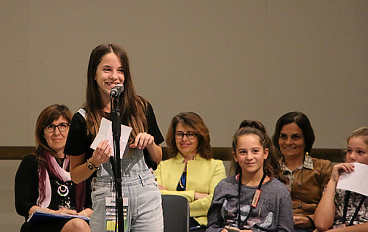
Nov 9, 2018 | Non categorizzato
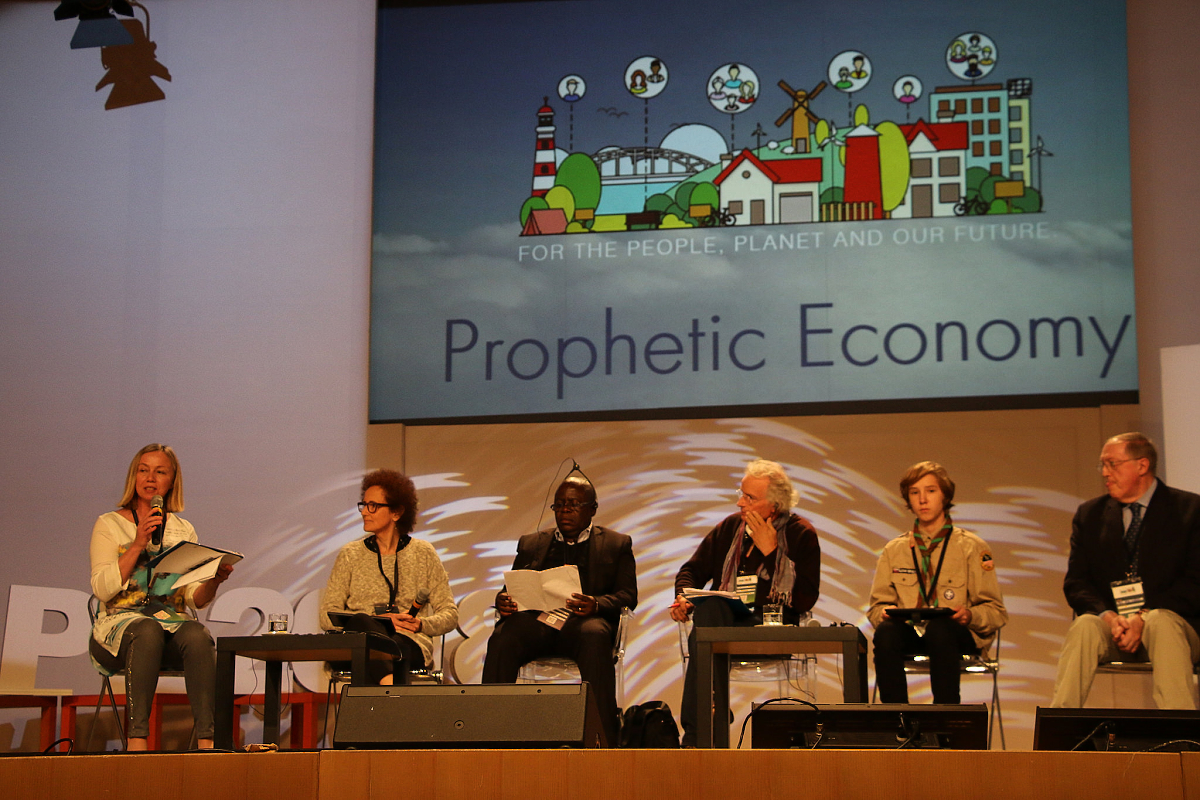 500 “Prophetic Economy” participants from 40 countries and all five continents were gathered from 2 to 4 November at the International Mariapolis Centre, CastelGandolfo, near Rome, Italy. The event facilitated interactive and intergenerational exchange through a program of inspiring contributions, work groups and creative workshops. What began as an international platform of encounter, exchange and encouragement, the event went far beyond the limits of mere networking, to become a driving force of energy and commitment for initiatives and actions at local, regional and international levels. Internationally-renowned economist Jeffrey Sachs, a key speaker at the event, affirmed, “Prophetic economy means an economy that operates in the vision of the prophets, of justice, of peace, a vision of meeting the needs of the poorest people, a vision of protecting creation.”.
500 “Prophetic Economy” participants from 40 countries and all five continents were gathered from 2 to 4 November at the International Mariapolis Centre, CastelGandolfo, near Rome, Italy. The event facilitated interactive and intergenerational exchange through a program of inspiring contributions, work groups and creative workshops. What began as an international platform of encounter, exchange and encouragement, the event went far beyond the limits of mere networking, to become a driving force of energy and commitment for initiatives and actions at local, regional and international levels. Internationally-renowned economist Jeffrey Sachs, a key speaker at the event, affirmed, “Prophetic economy means an economy that operates in the vision of the prophets, of justice, of peace, a vision of meeting the needs of the poorest people, a vision of protecting creation.”. 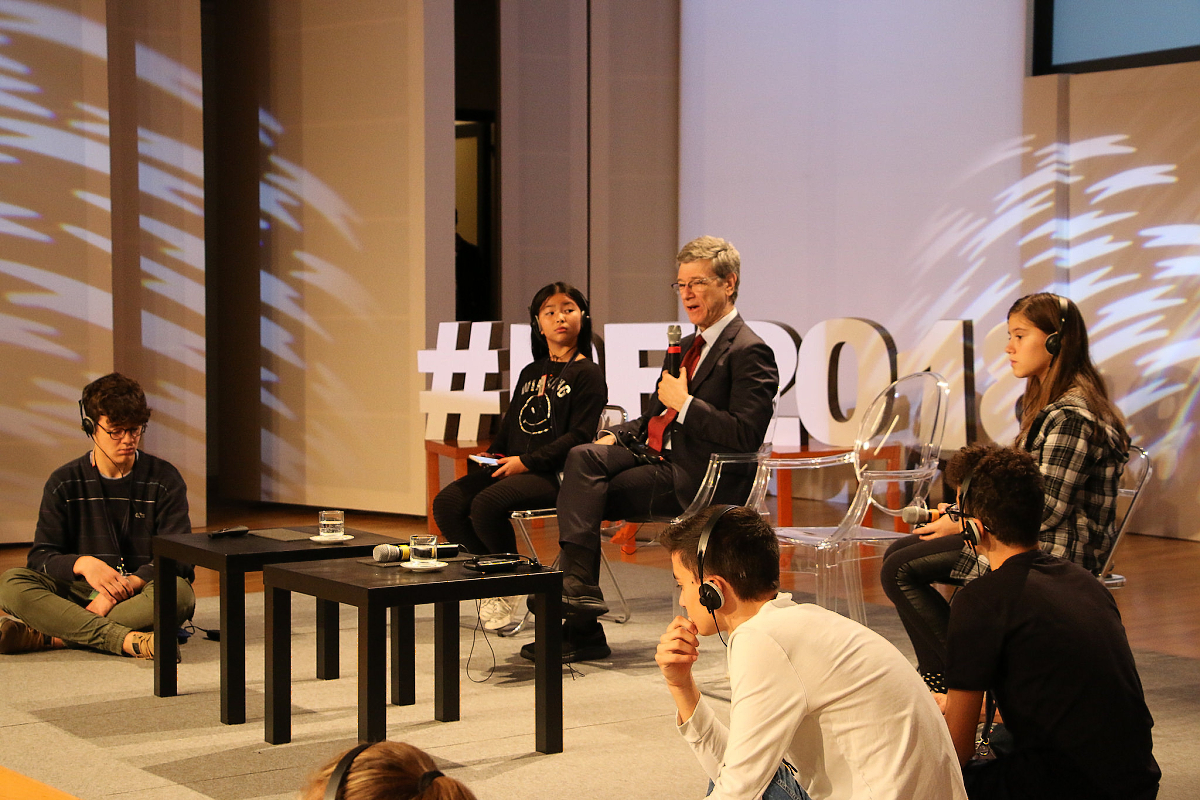 Diversity characterized the participants: economists, ecological activists, experts from the financial sector, students, entrepreneurs, people from a variety of different cultural and religious backgrounds, with a wide age range – the youngest being only 9 years old! The younger attendees were protagonists both in age-specific sessions involving interaction with experts in the fields of economy and ecology, and in cross-generational panels, contributing their own distinctive questions, proposals and life experiences. “How good it has been to have the children and young people with us” said Josiane Gauthier, Secretary General of Catholic Development Alliance CIDSE. Inspiring us with their profound intelligence and grace and truth”. The event highlighted examples of good economic practices. As Italian economist Stefano Zamagni explained, “It‘s those who look ahead and dare to gaze beyond the obstacles. The current economic and social models no longer work”. “These kind of economic practices already exist”, observed Lorna Gold, economist with Trocair, the Irish development agency, “but all too often they’re invisible in the media and our culture.”
Diversity characterized the participants: economists, ecological activists, experts from the financial sector, students, entrepreneurs, people from a variety of different cultural and religious backgrounds, with a wide age range – the youngest being only 9 years old! The younger attendees were protagonists both in age-specific sessions involving interaction with experts in the fields of economy and ecology, and in cross-generational panels, contributing their own distinctive questions, proposals and life experiences. “How good it has been to have the children and young people with us” said Josiane Gauthier, Secretary General of Catholic Development Alliance CIDSE. Inspiring us with their profound intelligence and grace and truth”. The event highlighted examples of good economic practices. As Italian economist Stefano Zamagni explained, “It‘s those who look ahead and dare to gaze beyond the obstacles. The current economic and social models no longer work”. “These kind of economic practices already exist”, observed Lorna Gold, economist with Trocair, the Irish development agency, “but all too often they’re invisible in the media and our culture.” 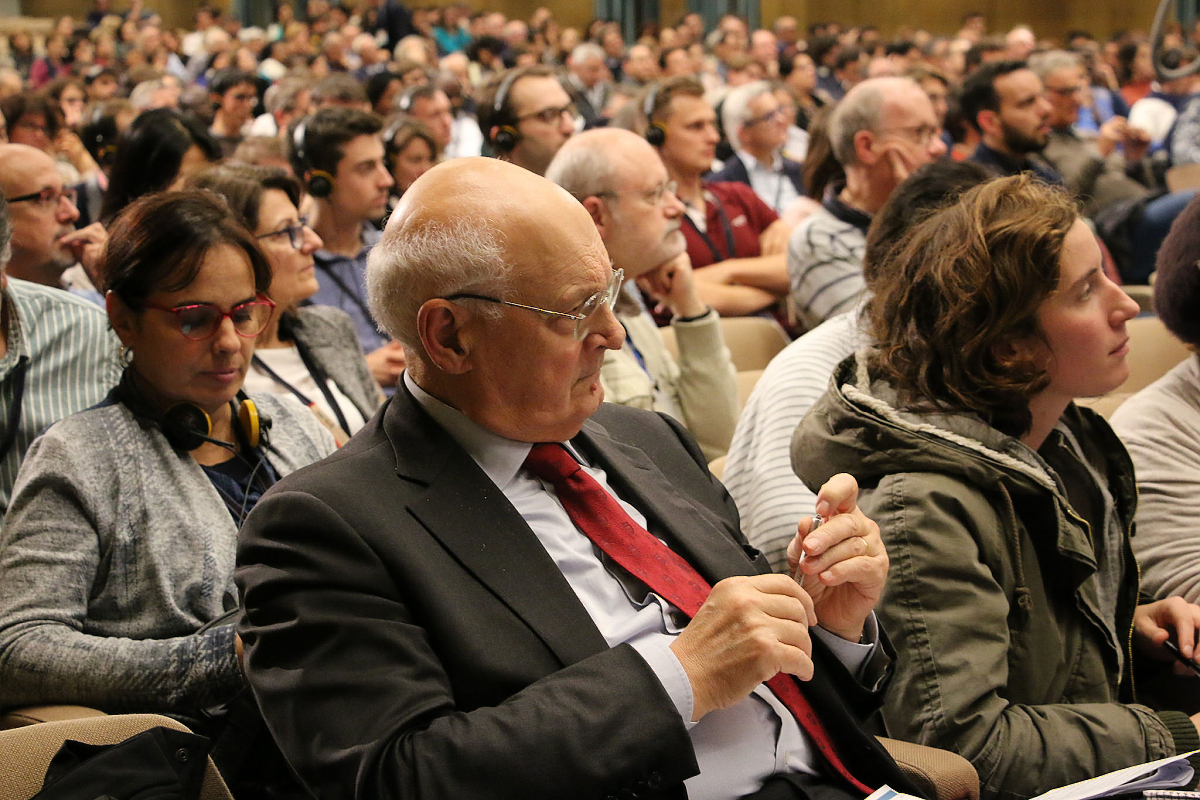 The “Prophetic Economy Award” was launched to promote good practice through examples of the prophetic economy in action. Carlo Petrini, founder of the Slow Food Movement, acknowledged the award winners. “They practice a form of economic reality different from the norm, they see beyond the pervasive economic modes. They are not so much prophetic in vision, as in their daily practice.” “This is not about utopias or ‘small islands’ within an unjust and unchanging system. Here, we’re looking at signals of tangible change,” observed Argentinean economist Cristina Calvo. “In the face of massive global financial mechanisms, we run the risk of feeling powerless. The antidote to being static is to widen the spectrum of action on all levels: micro, medium and macro.” A significant element within this event was the space given to those living in situations of poverty or social exclusion to make their own voice heard. “The time has come to rethink our economy and rethink our world, not ‘for’ the poor, not even with their participation, but starting from them,” concluded Jean Tonglet of ATD Fourth World. “Our knowledge is incomplete until it includes the knowledge of those we want to liberate from poverty, who struggle with its effects on a daily basis.” The challenge launched by this event is to invent new ways of collaboration, in order to be stronger and more creative in efforts to change to lifestyles based on a more sharing, more just and more sustainable economy. “The new idea at the basis of this event,” explained Italian economist Luigino Bruni, “was to bring ecology and economy together. In today’s world, we cannot speak of poverty without mentioning climate. One of the great messages of Pope Francis’ pontificate is the invitation to activate processes, not occupy spaces, because time is superior to space. Here, we can say that a process has been started”.
The “Prophetic Economy Award” was launched to promote good practice through examples of the prophetic economy in action. Carlo Petrini, founder of the Slow Food Movement, acknowledged the award winners. “They practice a form of economic reality different from the norm, they see beyond the pervasive economic modes. They are not so much prophetic in vision, as in their daily practice.” “This is not about utopias or ‘small islands’ within an unjust and unchanging system. Here, we’re looking at signals of tangible change,” observed Argentinean economist Cristina Calvo. “In the face of massive global financial mechanisms, we run the risk of feeling powerless. The antidote to being static is to widen the spectrum of action on all levels: micro, medium and macro.” A significant element within this event was the space given to those living in situations of poverty or social exclusion to make their own voice heard. “The time has come to rethink our economy and rethink our world, not ‘for’ the poor, not even with their participation, but starting from them,” concluded Jean Tonglet of ATD Fourth World. “Our knowledge is incomplete until it includes the knowledge of those we want to liberate from poverty, who struggle with its effects on a daily basis.” The challenge launched by this event is to invent new ways of collaboration, in order to be stronger and more creative in efforts to change to lifestyles based on a more sharing, more just and more sustainable economy. “The new idea at the basis of this event,” explained Italian economist Luigino Bruni, “was to bring ecology and economy together. In today’s world, we cannot speak of poverty without mentioning climate. One of the great messages of Pope Francis’ pontificate is the invitation to activate processes, not occupy spaces, because time is superior to space. Here, we can say that a process has been started”.  The younger participants spent time considering and embracing the challenge launched by the World Food Organization to work to eradicate hunger in the world by 2030 (#zerohunger),formulating their own proposals: – to promote the idea of a “deferred meal”, asking restaurants and bars to encourage their clients to buy an extra meal for someone in need, and issuing a #zerohunger sticker to participating businesses; – to campaign for a new subject in the school curriculum teaching the Sustainable Development Goals promoted by the United Nations. Prophetic Economy is an international project jointly run by seven organizations: Pope John XXIII Community Association, Nomadelfia, The Global Catholic Climate Movement, ATD Fourth World, Associazione Mondo di Comunità e Famiglia (World of Community and Family Association), SlotMob initiative and the international Focolare Movement represented by its Economy of Communion project and ‘Teens for Unity’ youth section.
The younger participants spent time considering and embracing the challenge launched by the World Food Organization to work to eradicate hunger in the world by 2030 (#zerohunger),formulating their own proposals: – to promote the idea of a “deferred meal”, asking restaurants and bars to encourage their clients to buy an extra meal for someone in need, and issuing a #zerohunger sticker to participating businesses; – to campaign for a new subject in the school curriculum teaching the Sustainable Development Goals promoted by the United Nations. Prophetic Economy is an international project jointly run by seven organizations: Pope John XXIII Community Association, Nomadelfia, The Global Catholic Climate Movement, ATD Fourth World, Associazione Mondo di Comunità e Famiglia (World of Community and Family Association), SlotMob initiative and the international Focolare Movement represented by its Economy of Communion project and ‘Teens for Unity’ youth section.
Photo album on Flickr 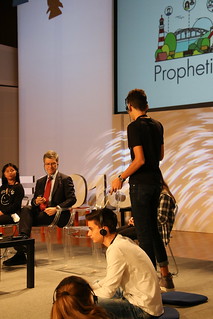
Nov 8, 2018 | Non categorizzato
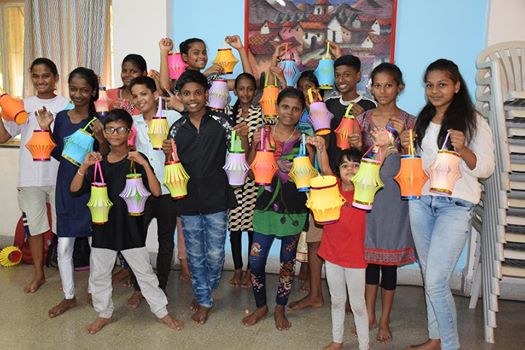
Nov 7, 2018 | Focolare Worldwide
 In India, in these days is the Festival of Light, the most important celebration of the year: Diwali. It commerates the victorious return of Rama, the manifestation of the Divinity Vishnu, in his capital, Ayodhya, after 14 years of exile and wandering. Therefore, today is a sybolic celebration of the return of the Light to its original home: the victory of good over evil. It is customary to light lamps and candles during the feast, which are traditionally called diya. In many areas of India there are light shows. Project Udisha in Mubai has invited everyone to “light a lamp on the front porch to remind us of the victory of Love, which is in our hearts and which we want to make grwo towards all, beginning with our own family.” See the Facebook page UDISHA PROGETTO MUMBAI INDIA
In India, in these days is the Festival of Light, the most important celebration of the year: Diwali. It commerates the victorious return of Rama, the manifestation of the Divinity Vishnu, in his capital, Ayodhya, after 14 years of exile and wandering. Therefore, today is a sybolic celebration of the return of the Light to its original home: the victory of good over evil. It is customary to light lamps and candles during the feast, which are traditionally called diya. In many areas of India there are light shows. Project Udisha in Mubai has invited everyone to “light a lamp on the front porch to remind us of the victory of Love, which is in our hearts and which we want to make grwo towards all, beginning with our own family.” See the Facebook page UDISHA PROGETTO MUMBAI INDIA
Nov 7, 2018 | Non categorizzato
A learning community I’m the headteacher of a school in an impoverished and isolated town with high rates of both unemployment and school absenteeism. Over the years, I have tried to create strong and deep relationships with my pupils, their families, my colleagues and all school empoyees. And I’ve had the joy of seeing a real “learning community” spring up, joined together to promote the dignity of each person, in a spirit of openness towards others. In our attempts to help our pupils not to abandon school, we have welcomed the “adoption at a distance” of pupils with their families, but we’ve also made our own contribution: setting up a traditional handcrafts workshop. This project actually attracted presidential acknowledgement. Recently ill health has forced me to limit my activities, but as long as I have breath in my body I will fight for education to help people discover their own value and the love of God. (I. – Argentina) Take on another’s pain Our family was shaken to the core by the suicide of my brother. Life was never the same again for us. I myself began to doubt my faith. My days became emptier and lost their meaning, until one day I realised that my attitude was not helping my parents at all. I gathered up all my strength in order to take on their terrible pain, so that by sharing it with them, their tragic burden might be lightened. Gradually, in this way, I found that my own wounds began to heal. It was not easy, but it’s helping me too, now that I have myself become a mother. (O.M. – Germany) Making space for others I married Marcello when I was 24 years old. We had so much in common, including our faith and we dreamed of the beautiful family we would have together. 15 years later, Marcello was taken from me in an accident. For six years I remained trapped within the unanswerable “why me”? Until the day I accepted an invitation to a meeting, where they spoke of God Love. This disturbed me but gradually the words sank in and began to change something within me. When I heard how, out of love for us, Jesus on the cross experienced abandonment from the Father, crying out “My God, why have you forsaken me?”, my own forsaken cry began to make sense. My situation did not change, I was still a widow, but within me I was able to begin to love once more. Looking around, I noticed how many people were experiencing a void as great as my own. The more I was able to make space for them, the more God filled me with His peace. (A. – Italy) Thinking of those who come after me I’m a teacher. At the end of each lesson, I try to leave the classroom in good order for those who will use the room after me. I leave the desk tidy, the teaching board clean, the windows open to let in the fresh air. Each room has two baskets for waste: one for paper and one for all other discarded items. Often, when I find them mixed up, I try to sort the rubbish so it is all in the correct basket. This means I often lose a few minutes of my break time, which should be to regain strength for my next lessons, but I believe it is definitely time “lost” well! (A. – Switzerland) Keep the conversation going When our children entered adolescence, we found it harder and harder to understand one other. This led to tensions between me and my husband because we had very different approaches to their behaviour. When we realised that our relationships with our children were under threat, with one son in particular, we understood that we had to go beyond the limits of our own ideas and set ourselves to be the first to love, constantly keeping a conversation going between us and with our children. Now they have all grown up, but we know that our role in educating our children is far from over! (Mariolina – Italy)
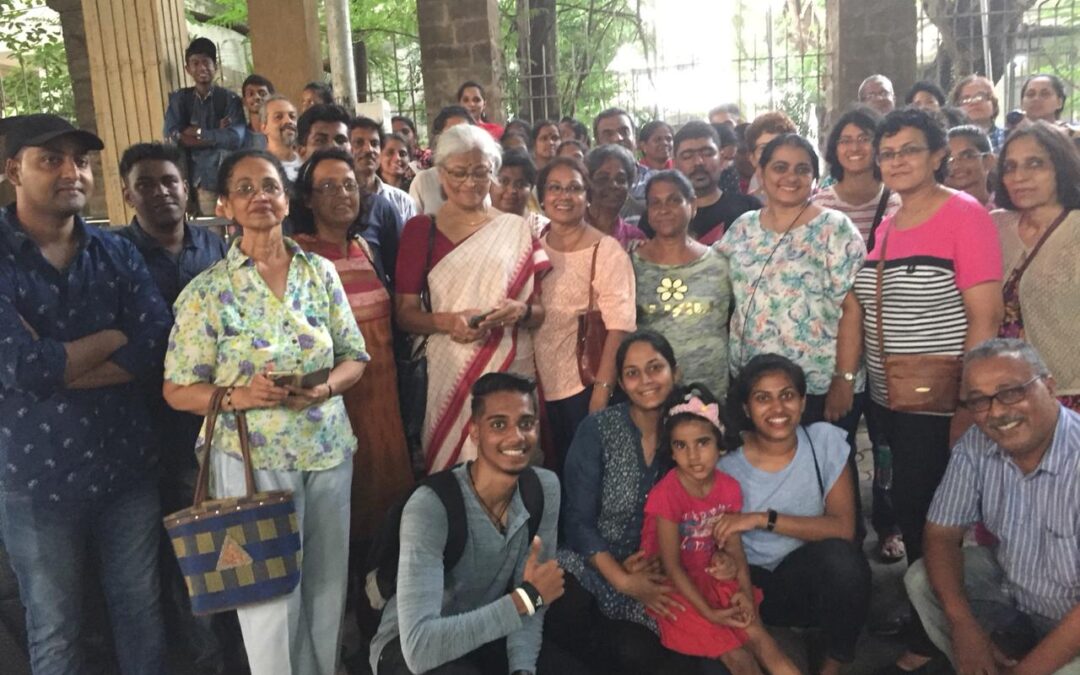
Nov 6, 2018 | Focolare Worldwide
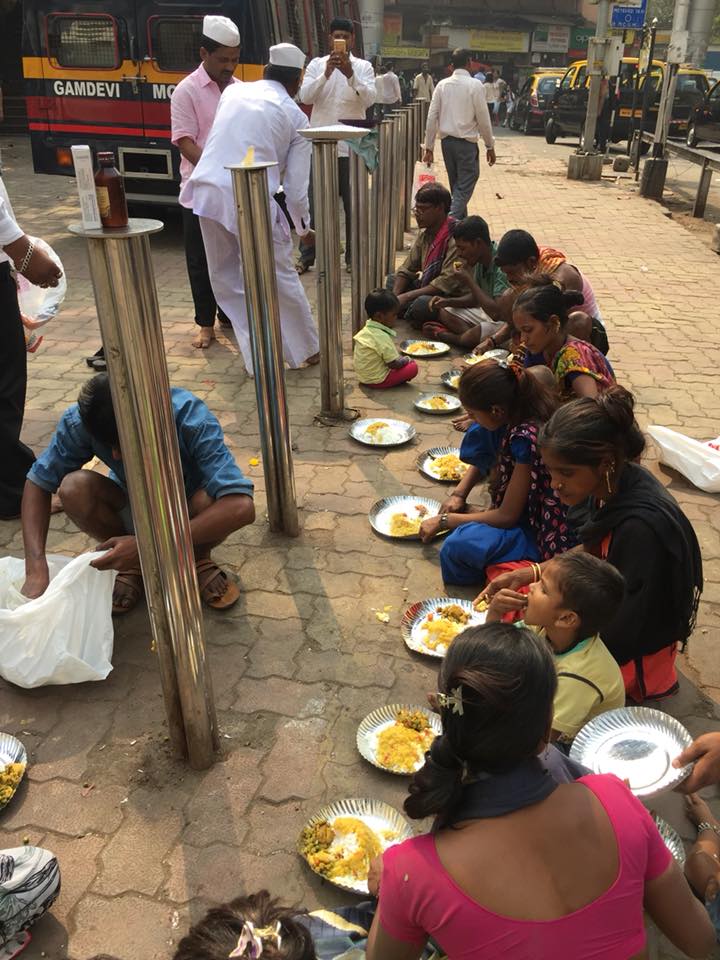 With one of the fastest growing economies, India is a country which is racing toward constant improvement in life expectancy, literacy rates and health conditions. However, of the 1.2 billion inhabitants of the country, the conditions of those living in the poorest regions are still difficult. Despite its status as an economic power, mortal malnutrition persists. Every evening in India, 200 million people try to fall asleep despite the gnawing hunger. And every day, 3,000 children die of hunger. In Mumbai, where thousands of people go for cancer treatments, Sunny of the Focolare community, wrote: “During the treatments, the families sleep on the road or around the hospital, in the lack of all necessities.” This is an alarming situation of poverty, especially if compared with the data related to the growing waste of perfectly whole foodstuffs, thrown away at the end of wedding banquets, rites, and family parties. The country is one of the world’s main producers of foodstuff, but is likewise one in which a good part of these goods are wasted. Among the causes are also the shortage of transport and warehousing systems especially the “cold chain” system: according to estimates in 2017 of the Indian Ministry of Agriculture, the value of the losses connected to foodstuff wastes (not only in terms of farming goods and foodstuffs, but also in the use of water and energy) could range between 8 and 15 billion dollars yearly.
With one of the fastest growing economies, India is a country which is racing toward constant improvement in life expectancy, literacy rates and health conditions. However, of the 1.2 billion inhabitants of the country, the conditions of those living in the poorest regions are still difficult. Despite its status as an economic power, mortal malnutrition persists. Every evening in India, 200 million people try to fall asleep despite the gnawing hunger. And every day, 3,000 children die of hunger. In Mumbai, where thousands of people go for cancer treatments, Sunny of the Focolare community, wrote: “During the treatments, the families sleep on the road or around the hospital, in the lack of all necessities.” This is an alarming situation of poverty, especially if compared with the data related to the growing waste of perfectly whole foodstuffs, thrown away at the end of wedding banquets, rites, and family parties. The country is one of the world’s main producers of foodstuff, but is likewise one in which a good part of these goods are wasted. Among the causes are also the shortage of transport and warehousing systems especially the “cold chain” system: according to estimates in 2017 of the Indian Ministry of Agriculture, the value of the losses connected to foodstuff wastes (not only in terms of farming goods and foodstuffs, but also in the use of water and energy) could range between 8 and 15 billion dollars yearly. 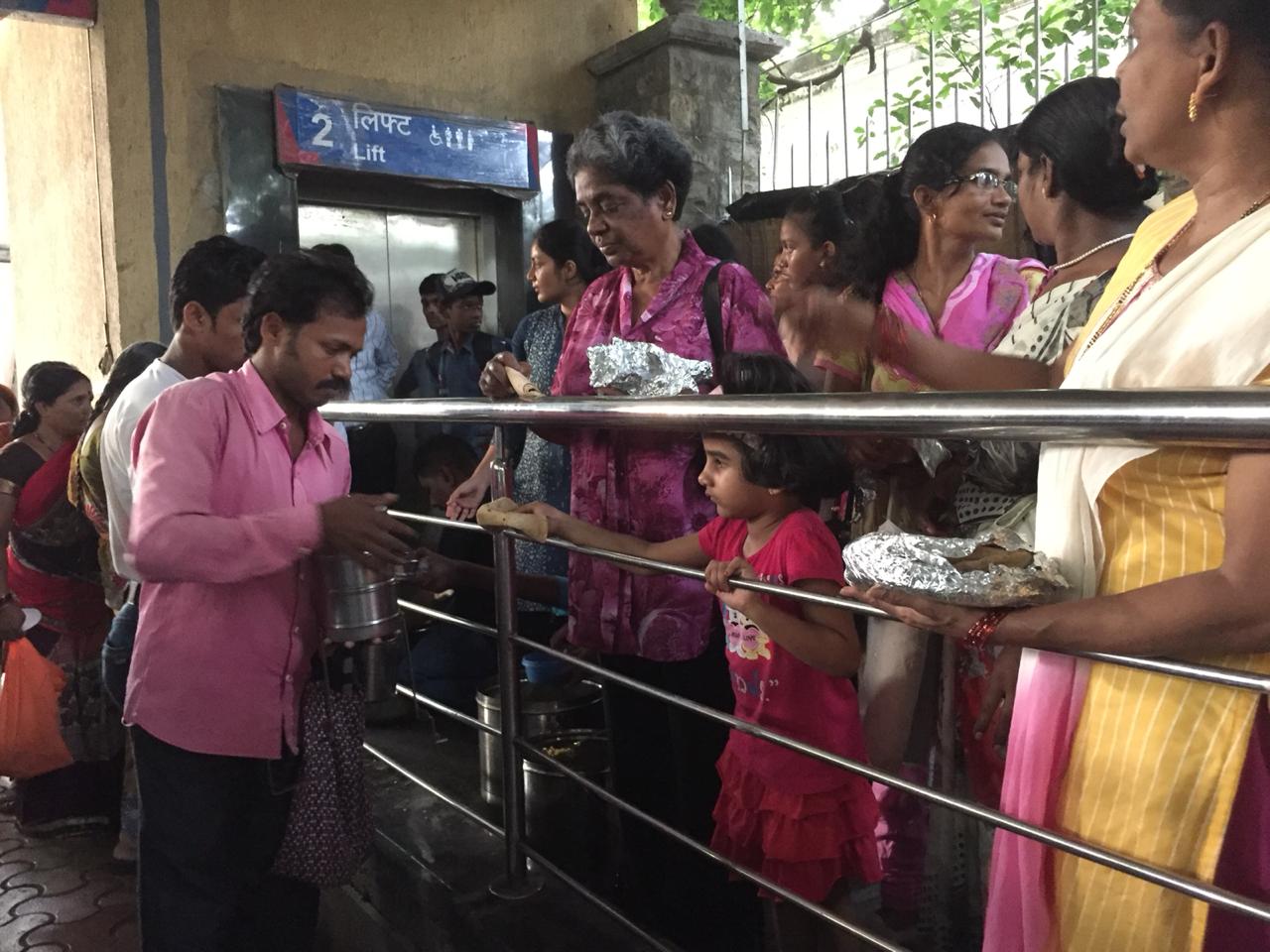 From 2017 onward the nonprofit RotiBank has been working to gather food rejects or those freshly prepared from food companies, like hotels or cafeterias, and involving them in a safe way in the slums or for homeless people. “Roti” is a typical, round Indian bread, from a dough of whole-bran flour and water, baked also on stones. After having received a van as a gift, RotiBank is now working to increase the number of vehicles and staff. Many of the people benefited are children or labourers who do not get a minimum salary to be able to survive. The non-profit initiative avails of a chain of volunteers who, after their normal work hours, participate in the collection and distribution of leftover food. “It is essential – the presentation of the initiative says – to redistribute the leftovers, and perfectly edible food intended for the dumpsite, to people who are really in need.”
From 2017 onward the nonprofit RotiBank has been working to gather food rejects or those freshly prepared from food companies, like hotels or cafeterias, and involving them in a safe way in the slums or for homeless people. “Roti” is a typical, round Indian bread, from a dough of whole-bran flour and water, baked also on stones. After having received a van as a gift, RotiBank is now working to increase the number of vehicles and staff. Many of the people benefited are children or labourers who do not get a minimum salary to be able to survive. The non-profit initiative avails of a chain of volunteers who, after their normal work hours, participate in the collection and distribution of leftover food. “It is essential – the presentation of the initiative says – to redistribute the leftovers, and perfectly edible food intended for the dumpsite, to people who are really in need.” 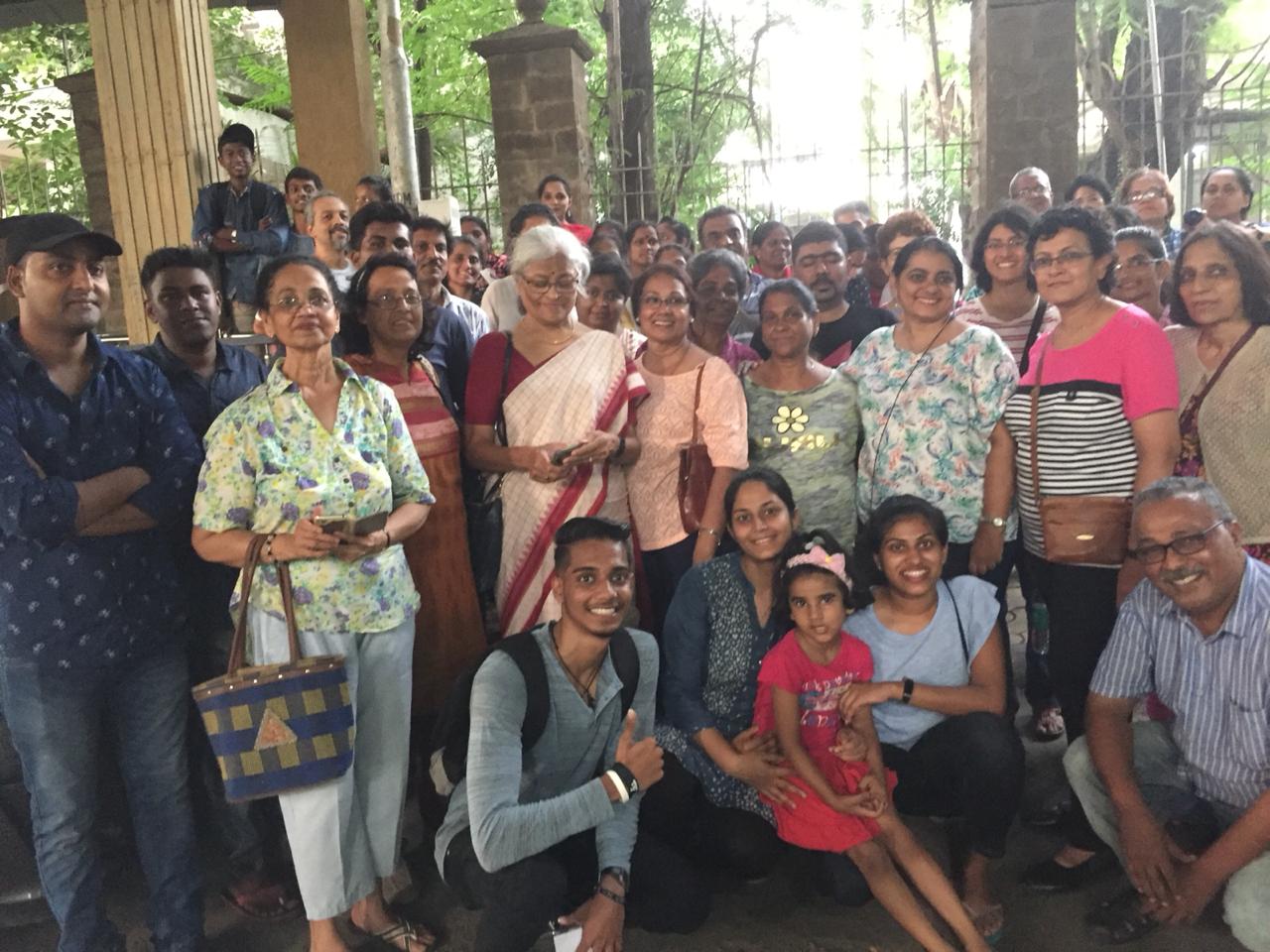 Sunny explained: “We decided to start our battle with an awareness afternoon in support of this non-profit organisation. About 45 members of the Mumbai Focolare community placed themselves at disposal to serve the meals. It was an occasion for us to verify our own shopping methods, and realise that every day we can put something aside to allow these families to have their lunch. It was moving to see how many people were waiting to receive a bit of food. One of the participants said: “I’m so happy to be part of this experience. I shall never forget the expression on the faces of the people queueing up.” Perhaps all of us should see it. Chiara Favotti
Sunny explained: “We decided to start our battle with an awareness afternoon in support of this non-profit organisation. About 45 members of the Mumbai Focolare community placed themselves at disposal to serve the meals. It was an occasion for us to verify our own shopping methods, and realise that every day we can put something aside to allow these families to have their lunch. It was moving to see how many people were waiting to receive a bit of food. One of the participants said: “I’m so happy to be part of this experience. I shall never forget the expression on the faces of the people queueing up.” Perhaps all of us should see it. Chiara Favotti
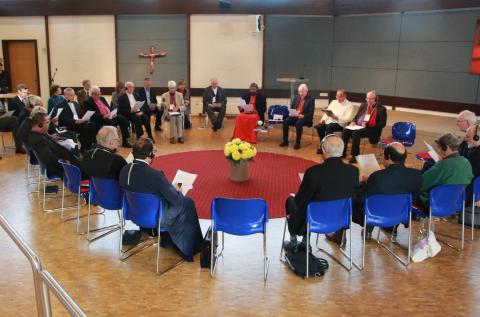
Nov 5, 2018 | Focolare Worldwide
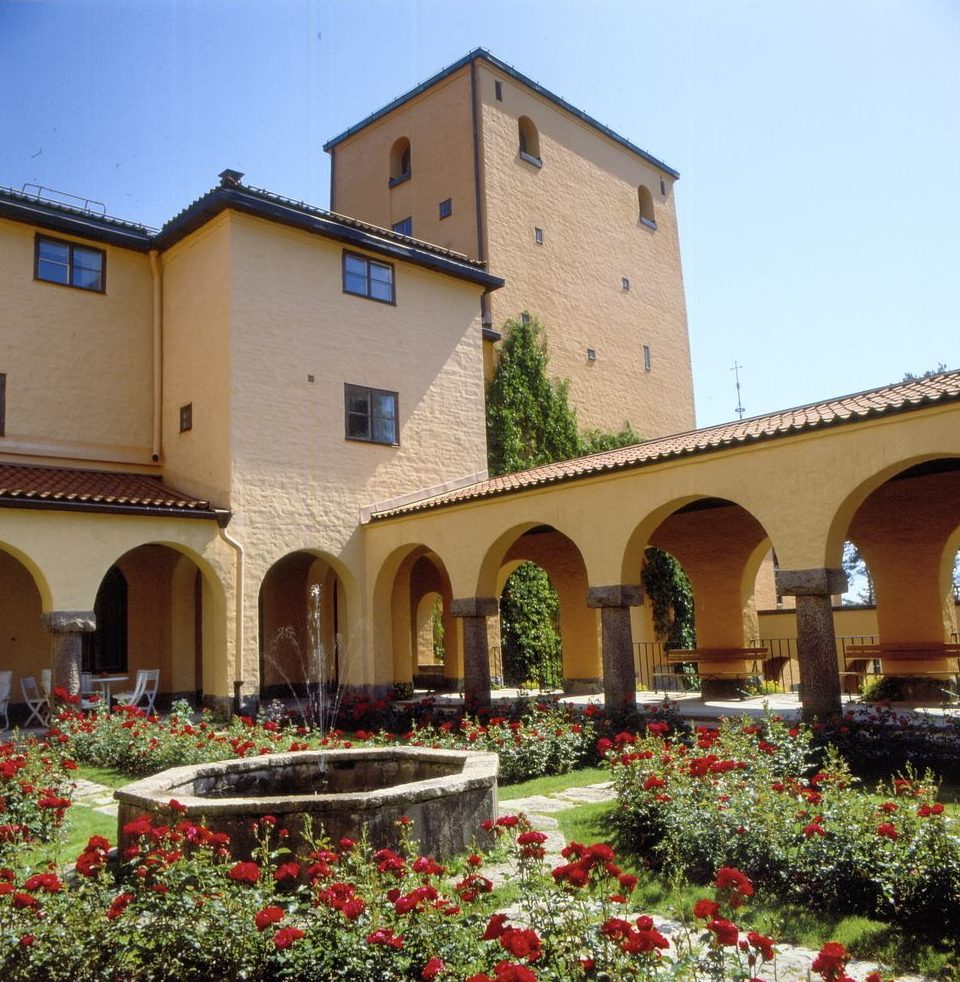 The 40 bishops, who are friends of the Focolari and come from various Christian Churches, have decided to meet in Sweden because of its profound significance in the ecumenial journey. The meeting will be taking place two years after the Lund event, one that has given a new impetus to ecumenical dialogue. In the joint declaration signed by Pope Francis and Bishop Munib Youman, who was then President of the Lutheran World Federation, one reads: “We pledge to witness together to God’s merciful grace, made visible in the crucified and risen Christ. Aware that the way we relate to one another shapes our witness to the Gospel, we commit ourselves to further growth in communion rooted in Baptism, as we seek to remove the remaining obstacles that hinder us from attaining full unity. Christ desires that we be one, so that the world may believe (cf. John 17:21)”. The periodic meetings of these bishops, who also wish to go deeper into the spirituality of unity that stemmed from Chiara Lubich’s charism, aim towards a communion that is a witness to the Gospel. They were held in Jerusalem, Constantinople (Istanbul), London, Augsburg, Katowice and other cities of significant importance in the ecumenical journey.
The 40 bishops, who are friends of the Focolari and come from various Christian Churches, have decided to meet in Sweden because of its profound significance in the ecumenial journey. The meeting will be taking place two years after the Lund event, one that has given a new impetus to ecumenical dialogue. In the joint declaration signed by Pope Francis and Bishop Munib Youman, who was then President of the Lutheran World Federation, one reads: “We pledge to witness together to God’s merciful grace, made visible in the crucified and risen Christ. Aware that the way we relate to one another shapes our witness to the Gospel, we commit ourselves to further growth in communion rooted in Baptism, as we seek to remove the remaining obstacles that hinder us from attaining full unity. Christ desires that we be one, so that the world may believe (cf. John 17:21)”. The periodic meetings of these bishops, who also wish to go deeper into the spirituality of unity that stemmed from Chiara Lubich’s charism, aim towards a communion that is a witness to the Gospel. They were held in Jerusalem, Constantinople (Istanbul), London, Augsburg, Katowice and other cities of significant importance in the ecumenical journey.  The participants attending this 37th meeting belong to 12 Christian Churches and come from 18 different countries; they will reflect on: “The Spirit’s breath of life and today’s world”. Maria Voce, president of the Focolare Movement will also be present and she will speak about “The Holy Spirit, Soul of the Church in the experience and thought of Chiara Lubich”. Other related themes will range: from the ecumenical challenge in different geographical regions to the meaning of reconciliation in today’s culture; from the Church’s renewal to synodality. Space will also be dedicated to the joint commemoration of the Reformation (2017) and its meaning for the Churches today. Stefania Tanesini
The participants attending this 37th meeting belong to 12 Christian Churches and come from 18 different countries; they will reflect on: “The Spirit’s breath of life and today’s world”. Maria Voce, president of the Focolare Movement will also be present and she will speak about “The Holy Spirit, Soul of the Church in the experience and thought of Chiara Lubich”. Other related themes will range: from the ecumenical challenge in different geographical regions to the meaning of reconciliation in today’s culture; from the Church’s renewal to synodality. Space will also be dedicated to the joint commemoration of the Reformation (2017) and its meaning for the Churches today. Stefania Tanesini
Nov 3, 2018 | Non categorizzato
“In Jesus, God simply made himself our brother. He did not only stand beside us, but he entered into us, into our hearts, into our wounds. In doing so he made the wounds of man his own, and thus the wounds that burn in humanity became God’s in this man, Jesus of Nazareth. When he says, ‘I am the way,’ all we need to do is look to the open wound in his side, and there we will find the way. This is certainly not easy; it’s not obvious, either. Yet if we try, if we attempt it, if we risk it, we will realize that he is the way.” (from a homily in 1993) “In Jesus in shows how God, who up to now in the history of his people seemed to have been silent, had not fallen asleep, had not fallen mute. He comes, gathers his poor people and takes them in. He doesn’t do it, however, with lightning action produced by his omnipotence, but in a smaller way, the way of Jesus, the hidden way of service: the way of the cross.” (from a radio interview on September 17, 1978) “Jesus was accused of being a friend to sinners and tax collectors, for having kept ‘bad company.’ His behavior certainly left himself open to misunderstandings. You might say it was a simple criticism of the established order, simple likable eccentricity, or simple protest against the establishment and fixed values. But no: for Jesus, in whom God’s heart beat, he cared for everyone and everything. He didn’t care about those on fringes just in themselves, but rather in that they were part of the whole. “He too is a son of Abraham” (Luke 19:9) is how Jesus himself justified, to the so-called ‘gentlemen’ and those who pretended an external legality, his friendship with Zacchaeus the tax collector.” (from an article in December 1973)
Nov 1, 2018 | Non categorizzato
The saints are great men and women who, having seen their greatness in the Lord, risk for God, as his children, everything that is theirs. They give, demanding nothing. They give their life, their soul, their joy, every earthly bond, every richness. Free and alone, launched into infinity, they wait for Love to bring them into the eternal kingdom; but, already in this life, they feel their hearts fill with love, true love, the only love that satisfies, that consoles, that love which shatters the eyelids of the soul and gives new tears. Ah, no one knows who a saint is! He or she has given and now receives, and an endless flow passes between heaven and earth, joins earth to heaven, and filters from the depths rare ecstasy, celestial sap that does not stop at the saint, but flows over the tired, the mortal, the blind and paralyzed in soul, and breaks through and refreshes, comforts and attracts and saves. If you want to know about love, ask a saint. Chiara Lubich, Essential Writings, New City Press, Hyde Park, NY, 2007, p. 116
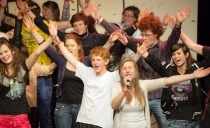
Oct 31, 2018 | Non categorizzato
 Maria Voce Emmaus and Jesús Morán respectively President and Co-President of the Focolare Movement will travel to Belgium for the 60th anniversary of the arrival of the Focolare in that country. Official Focolare website https://www.focolare.org/belgium/news/60-ans-du-mouvement-des-focolari-en-belgique/
Maria Voce Emmaus and Jesús Morán respectively President and Co-President of the Focolare Movement will travel to Belgium for the 60th anniversary of the arrival of the Focolare in that country. Official Focolare website https://www.focolare.org/belgium/news/60-ans-du-mouvement-des-focolari-en-belgique/
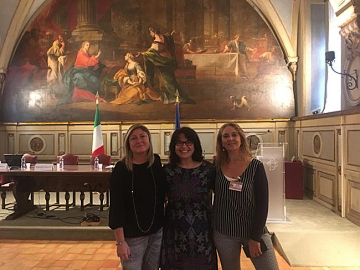
Oct 31, 2018 | Non categorizzato
 It’s called “TST” (tempi senza tensioni, “Time Without Tensions”), a program aimed at balancing work and family life. It was produced by the Il Sentiero di Arianna social cooperative (“Arianna’s way”), which is part of the Economy of Communion, and received first prize in the fourth edition of Family Friendly Businesses that is put on by a forum of family associations in Lazio, Italy. The cooperative, which is part of the Consorzio Tassano Servizi Territoriali network, primarily works in the field of home assistance, education, school services and career support. The TST program produces a series of specific services for employees (dispute resolution, family help, counseling services, working remotely, telecommuting, flexible banking hours, informative actions for management, being a Jack of all trades, and pathways that help employees returning to work after a period of reconciliation). These have shown themselves to be highly effective in creating a positive workplace culture that is based on authentic relationships of collaboration and cooperation. Started in 1996 by nine young women, who for a year pooled the resources that they had earned and reinvested them in training and development, today Il Sentiero di Arianna counts more than 130 members, 85% of whom are women. The tightly knit initial group and the pioneers of the local coop, inspired by the values of the Economy of Communion project that Chiara Lubich launched in 1991, became the foundations upon which the business was developed.
It’s called “TST” (tempi senza tensioni, “Time Without Tensions”), a program aimed at balancing work and family life. It was produced by the Il Sentiero di Arianna social cooperative (“Arianna’s way”), which is part of the Economy of Communion, and received first prize in the fourth edition of Family Friendly Businesses that is put on by a forum of family associations in Lazio, Italy. The cooperative, which is part of the Consorzio Tassano Servizi Territoriali network, primarily works in the field of home assistance, education, school services and career support. The TST program produces a series of specific services for employees (dispute resolution, family help, counseling services, working remotely, telecommuting, flexible banking hours, informative actions for management, being a Jack of all trades, and pathways that help employees returning to work after a period of reconciliation). These have shown themselves to be highly effective in creating a positive workplace culture that is based on authentic relationships of collaboration and cooperation. Started in 1996 by nine young women, who for a year pooled the resources that they had earned and reinvested them in training and development, today Il Sentiero di Arianna counts more than 130 members, 85% of whom are women. The tightly knit initial group and the pioneers of the local coop, inspired by the values of the Economy of Communion project that Chiara Lubich launched in 1991, became the foundations upon which the business was developed.  Since its constitution, the Sentiero di Arianna cooperative has promoted a family friendly business culture, which in turn positively influenced other businesses it is connected to. It is an organization where the news of a pregnancy is always good news, where someone can become a mother and return to work without worry. Yet it is also a company where the women who are not mothers are the innovators, knowing how to fuse positive organizational improvement processes that harmonize work with caring for those closest to them. The needs of people and families are many. “If you go back to the origins of the word ‘economy,’ you find the word ‘house’. Those of us in business cannot feel separate from everyone else. You cannot be a worker and then, when you go home, be a parent. Each person is unique, and as such they have their work experience,” said the firm’s president, Simona Rizzi, as she received the prize on October 9 in the Chamber of Deputies in Rome. Among other things, the prize states: “This is an entity endowed with a vision that is particularly attentive to people. Starting with the needs of its employees, they developed an innovative organizational flexibility that set up tangible support both internally and throughout its territory, weaving a network of social and economic relationships to find appropriate solutions that meet the need of harmonizing work and family life.” “This award is the result of a long journey the cooperative has been on since its origins up to today. It is a journey that has developed through many important experiences these past years,” Rizzi added. “It is the women themselves who have won, with their ability to build a business that is fit for people and to build an economy that is fit for a community.” “Businesses that adopt best practices of reconciliation also demonstrate increases in productivity among other things. The women who work there reach management and high-profile leadership positions sooner,” was a comment from the Minister for Family and Disability, who was interviewed at the awards. Source: www.edc-online.org
Since its constitution, the Sentiero di Arianna cooperative has promoted a family friendly business culture, which in turn positively influenced other businesses it is connected to. It is an organization where the news of a pregnancy is always good news, where someone can become a mother and return to work without worry. Yet it is also a company where the women who are not mothers are the innovators, knowing how to fuse positive organizational improvement processes that harmonize work with caring for those closest to them. The needs of people and families are many. “If you go back to the origins of the word ‘economy,’ you find the word ‘house’. Those of us in business cannot feel separate from everyone else. You cannot be a worker and then, when you go home, be a parent. Each person is unique, and as such they have their work experience,” said the firm’s president, Simona Rizzi, as she received the prize on October 9 in the Chamber of Deputies in Rome. Among other things, the prize states: “This is an entity endowed with a vision that is particularly attentive to people. Starting with the needs of its employees, they developed an innovative organizational flexibility that set up tangible support both internally and throughout its territory, weaving a network of social and economic relationships to find appropriate solutions that meet the need of harmonizing work and family life.” “This award is the result of a long journey the cooperative has been on since its origins up to today. It is a journey that has developed through many important experiences these past years,” Rizzi added. “It is the women themselves who have won, with their ability to build a business that is fit for people and to build an economy that is fit for a community.” “Businesses that adopt best practices of reconciliation also demonstrate increases in productivity among other things. The women who work there reach management and high-profile leadership positions sooner,” was a comment from the Minister for Family and Disability, who was interviewed at the awards. Source: www.edc-online.org
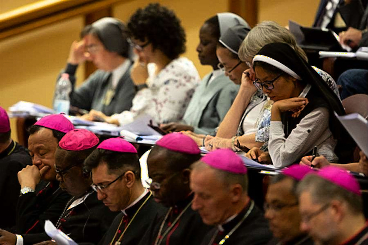
Oct 30, 2018 | Non categorizzato
 “It is often to the youngest that the Lord reveals better solutions.” These are words from Saint Benedict in his “Rule.” These were also the words chosen by Pope Francis when he announced the 15th Ordinary General Assembly of Bishops, on October 3-28 , which has just concluded. Preceded by a Preparatory Document (January 2017), a Questionnaire in several languges and by a Pre-Synodal Reunion (March 2018) with the participation of around three-hundred young people and several thousand others through social media, the Synod was the final step on a long and well organised walk. It was a walk of mutual listening, attentiveness, sharp and open dialogue ‘with’ and ‘about’ the new generations. Sixteen thousand responses arrived from Uganda alone. In line with previous Assemblies, the Synod had a common thread: renewal of the Church and society starting from their very foundations: the family and the youth who guarantee the future generations,” as Cardinal Lorenzo Baldisseri , Secretary General of the Synod of Bishops, explained during his inaugural press conference. “Youth doesn’t last a lifetime,” remarked Archbishop Rino Fisichella, president of the Pontifical Council for the Promotion of the New Evangelization. The period of youth comes to an end at a certain point. But what remains is having lived it intensely. The most important thing is to give meaning to the great gift of life that has been placed in our hands.”
“It is often to the youngest that the Lord reveals better solutions.” These are words from Saint Benedict in his “Rule.” These were also the words chosen by Pope Francis when he announced the 15th Ordinary General Assembly of Bishops, on October 3-28 , which has just concluded. Preceded by a Preparatory Document (January 2017), a Questionnaire in several languges and by a Pre-Synodal Reunion (March 2018) with the participation of around three-hundred young people and several thousand others through social media, the Synod was the final step on a long and well organised walk. It was a walk of mutual listening, attentiveness, sharp and open dialogue ‘with’ and ‘about’ the new generations. Sixteen thousand responses arrived from Uganda alone. In line with previous Assemblies, the Synod had a common thread: renewal of the Church and society starting from their very foundations: the family and the youth who guarantee the future generations,” as Cardinal Lorenzo Baldisseri , Secretary General of the Synod of Bishops, explained during his inaugural press conference. “Youth doesn’t last a lifetime,” remarked Archbishop Rino Fisichella, president of the Pontifical Council for the Promotion of the New Evangelization. The period of youth comes to an end at a certain point. But what remains is having lived it intensely. The most important thing is to give meaning to the great gift of life that has been placed in our hands.”  On Sunday, a solemn celebration and the publication of a Final Document concluded the Assembly. More than 150 bishops attended the Synod, two of whom came for the first time from continental China. There were 40 young people under the age of 30 attending as auditors. They were a significant presence, exuberant and at times noisy, always active on the digital channels with the publication of posts and selfies with the Pope and the other bishops, whom they met informally in the corridors, moments of recreation or in more official settings like the small discussion groups. They were always ready for a conversation or for offering their contribution of positive criticisms and concrete proposals. Without any fear of the high-sounding titles or silver hair, they took to heart the Pope’s invitation to: “cling to the bark of the Church which, even through impestuous storms in the world, continues to offer refuge and hospitality to all.” It’s worth the trouble, he had said, “to place ourselves in a position of listening towards each other.” “A Synod of very particular significance,” affirmed Cardinal Reinhard Marx, Archbishop of Muchen und Freising, president of the German Bishops Conference, during one of the many briefings with journalists, “a place of learning about the youth,” whom the Synod of bishops wanted to know in depth, thanks to the input of the ones they were directly interested in knowing about. The relationship between the virtual world and the real world, immigration, the role of school and universities, parish life and the formation of catechists, friendships and relationships, were just a few of the topics they dealt with. “They also talked about digital pastoral ministry, how the Church can find its place in the world of social communications,” explained Paolo Ruffini, Prefect of the Dicastery for Communication. “We have the same problems,” insisted Bishop Andrew Nkea Fuanya, Bishop of Mamfe, Cameroon, “but we face them from different points of view.” The churches in Cameroon are filled to the brim, but the youth are unhappy because of the many problems that spread across Africa. How are we to help them? We’re all in search of the same solution.” “A Synod on the youth with the youth,’ said Tadeusz Kondrusiewicz, Archbishop of Minsk-Mohilev and president of the Bishops Conference of Bielorussia, “which makes it particularly dynamic, because the young are never static.” “Vibrant was the surprise over the closeness of the topics that were faced, in the challenges of today’s Church even in the diversity of circumstances,” said Pastor Marco Fornerone from the Evangelical Church in Rome, who was attending as one of the 8 fraternal representatives. In the course of the Assembly, on October 6, a special meeting was held between the young people, the Pope and other bishops, against the backdrop of Paul VI Hall, titled “WE FOR – Unique, Supportive, Creative” There were three main topics: the search for identity, relationships and life as service and giving. There were also many life testimonies , studies, work and the difficulty of making decisions for the future. The program was interspersed with music and artistic pieces. In conclusion, at the end of the Synod, there was still one last gift from the Pope to the young auditors: a copy of Docat, a source of the church’s social teaching, Leo XIII’s “Rerum Novarum”, and all the writings of Pope Francis, including the most recent. The handbook has a question and answer format and focuses on the role of the human being in the Church and in the society. Chiara Favotti
On Sunday, a solemn celebration and the publication of a Final Document concluded the Assembly. More than 150 bishops attended the Synod, two of whom came for the first time from continental China. There were 40 young people under the age of 30 attending as auditors. They were a significant presence, exuberant and at times noisy, always active on the digital channels with the publication of posts and selfies with the Pope and the other bishops, whom they met informally in the corridors, moments of recreation or in more official settings like the small discussion groups. They were always ready for a conversation or for offering their contribution of positive criticisms and concrete proposals. Without any fear of the high-sounding titles or silver hair, they took to heart the Pope’s invitation to: “cling to the bark of the Church which, even through impestuous storms in the world, continues to offer refuge and hospitality to all.” It’s worth the trouble, he had said, “to place ourselves in a position of listening towards each other.” “A Synod of very particular significance,” affirmed Cardinal Reinhard Marx, Archbishop of Muchen und Freising, president of the German Bishops Conference, during one of the many briefings with journalists, “a place of learning about the youth,” whom the Synod of bishops wanted to know in depth, thanks to the input of the ones they were directly interested in knowing about. The relationship between the virtual world and the real world, immigration, the role of school and universities, parish life and the formation of catechists, friendships and relationships, were just a few of the topics they dealt with. “They also talked about digital pastoral ministry, how the Church can find its place in the world of social communications,” explained Paolo Ruffini, Prefect of the Dicastery for Communication. “We have the same problems,” insisted Bishop Andrew Nkea Fuanya, Bishop of Mamfe, Cameroon, “but we face them from different points of view.” The churches in Cameroon are filled to the brim, but the youth are unhappy because of the many problems that spread across Africa. How are we to help them? We’re all in search of the same solution.” “A Synod on the youth with the youth,’ said Tadeusz Kondrusiewicz, Archbishop of Minsk-Mohilev and president of the Bishops Conference of Bielorussia, “which makes it particularly dynamic, because the young are never static.” “Vibrant was the surprise over the closeness of the topics that were faced, in the challenges of today’s Church even in the diversity of circumstances,” said Pastor Marco Fornerone from the Evangelical Church in Rome, who was attending as one of the 8 fraternal representatives. In the course of the Assembly, on October 6, a special meeting was held between the young people, the Pope and other bishops, against the backdrop of Paul VI Hall, titled “WE FOR – Unique, Supportive, Creative” There were three main topics: the search for identity, relationships and life as service and giving. There were also many life testimonies , studies, work and the difficulty of making decisions for the future. The program was interspersed with music and artistic pieces. In conclusion, at the end of the Synod, there was still one last gift from the Pope to the young auditors: a copy of Docat, a source of the church’s social teaching, Leo XIII’s “Rerum Novarum”, and all the writings of Pope Francis, including the most recent. The handbook has a question and answer format and focuses on the role of the human being in the Church and in the society. Chiara Favotti
Letter from the Synod Fathers to Young People https://www.facebook.com/vaticannews/videos/298336587473577/
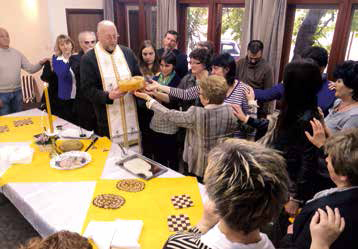
Oct 29, 2018 | Focolare Worldwide
 I am an internist and belong to the Russian-Orthodox church. As a person and believer, I was educated by my parish priest and the spirituality of Chiara Lubich. I was still very young when, through contact with the focolarine in Moscow, I felt the call to follow God in a radical way and I have been living in the focolare house of Belgrade (Serbia) for 7 years now. There is a particular and unique tradition in Serbia: the Slava feast, which the families celebrate on the day of that family’s patron saint; for the Serbs, the Slava is as ancient as Christianity itself. No Christian nation has this type of celebration, except the Orthodox Serbs. For a Serbian family the Slava comes after Easter and Christmas in terms of importance. The Orthodox-Christian missionaries who converted the Serbs to the Holy Orthodox faith, also Christianised their customs. Upon becoming Orthodox Christians, the Serbs accept the saint or saints of the day on which they are baptized. In Serbian culture, the Slava has always been a unique element throughout the history of the Serbian Orthodox people. Since the Serbs find themselves in a geographic region between the East and the West, and between different cultures, the Slava has become a feast identified with one’s own name and existence. It is celebrated by cities and even by military units also through cultural and social organisations. On that day, relatives, friends and acquaintances get together. The house is open to all. Our focolare is composed of Catholic focolarine from various countries and by me. For some time now we have felt the desire to make this beautiful tradition of the Serbian people our very own, and celebrate it together with our brothers and sisters. In the ecumenical spirit of the Focolare, our monk-friend, Fr. Djordje, helped us to choose our patron saint, and he suggested celebrating the holy “mironosice” women (the “women who went to the sepulchre with the herbs and spices”), and to whom the Orthodox Church dedicate an entire week starting from the second Sunday after Easter. So we have celebrated the Slava in the focolare for 4 years now. Many of our Orthodox friends were enthusiastic about our decision and helped us to prepare the things needed for the feast. Every year, for the Sunday of the holy women at the sepulchre, we welcome our friends of various churches, among whom are also our next-door neighbours, and some colleague, labourer or doctor. The highlight – the rite of slicing the Slava bread – is celebrated by our friend, Fr. Djordje, before the icon of the women at the sepulchre. We start with a devout prayer, accompanied by songs, and then, very moved and hand in hand, we pray according to the Slava feast tradition. Giving us the first benediction, Fr. Djordje pointed to the holy women of the sepulchre as models and protectors of the focolare, encouraging us to follow the example of the women, follow Jesus and become “like the salt that transforms society and its surroundings.” The rite is followed by the agape, with various culinary specialties in an atmosphere of joy and communion, as in a family. One of our acquaintances told us that he considered this step “a real enculturation that appreciates and makes the other’s culture one’s own: true Christianity.” Source: NU, new humanity, no. 231, p. 75.
I am an internist and belong to the Russian-Orthodox church. As a person and believer, I was educated by my parish priest and the spirituality of Chiara Lubich. I was still very young when, through contact with the focolarine in Moscow, I felt the call to follow God in a radical way and I have been living in the focolare house of Belgrade (Serbia) for 7 years now. There is a particular and unique tradition in Serbia: the Slava feast, which the families celebrate on the day of that family’s patron saint; for the Serbs, the Slava is as ancient as Christianity itself. No Christian nation has this type of celebration, except the Orthodox Serbs. For a Serbian family the Slava comes after Easter and Christmas in terms of importance. The Orthodox-Christian missionaries who converted the Serbs to the Holy Orthodox faith, also Christianised their customs. Upon becoming Orthodox Christians, the Serbs accept the saint or saints of the day on which they are baptized. In Serbian culture, the Slava has always been a unique element throughout the history of the Serbian Orthodox people. Since the Serbs find themselves in a geographic region between the East and the West, and between different cultures, the Slava has become a feast identified with one’s own name and existence. It is celebrated by cities and even by military units also through cultural and social organisations. On that day, relatives, friends and acquaintances get together. The house is open to all. Our focolare is composed of Catholic focolarine from various countries and by me. For some time now we have felt the desire to make this beautiful tradition of the Serbian people our very own, and celebrate it together with our brothers and sisters. In the ecumenical spirit of the Focolare, our monk-friend, Fr. Djordje, helped us to choose our patron saint, and he suggested celebrating the holy “mironosice” women (the “women who went to the sepulchre with the herbs and spices”), and to whom the Orthodox Church dedicate an entire week starting from the second Sunday after Easter. So we have celebrated the Slava in the focolare for 4 years now. Many of our Orthodox friends were enthusiastic about our decision and helped us to prepare the things needed for the feast. Every year, for the Sunday of the holy women at the sepulchre, we welcome our friends of various churches, among whom are also our next-door neighbours, and some colleague, labourer or doctor. The highlight – the rite of slicing the Slava bread – is celebrated by our friend, Fr. Djordje, before the icon of the women at the sepulchre. We start with a devout prayer, accompanied by songs, and then, very moved and hand in hand, we pray according to the Slava feast tradition. Giving us the first benediction, Fr. Djordje pointed to the holy women of the sepulchre as models and protectors of the focolare, encouraging us to follow the example of the women, follow Jesus and become “like the salt that transforms society and its surroundings.” The rite is followed by the agape, with various culinary specialties in an atmosphere of joy and communion, as in a family. One of our acquaintances told us that he considered this step “a real enculturation that appreciates and makes the other’s culture one’s own: true Christianity.” Source: NU, new humanity, no. 231, p. 75.
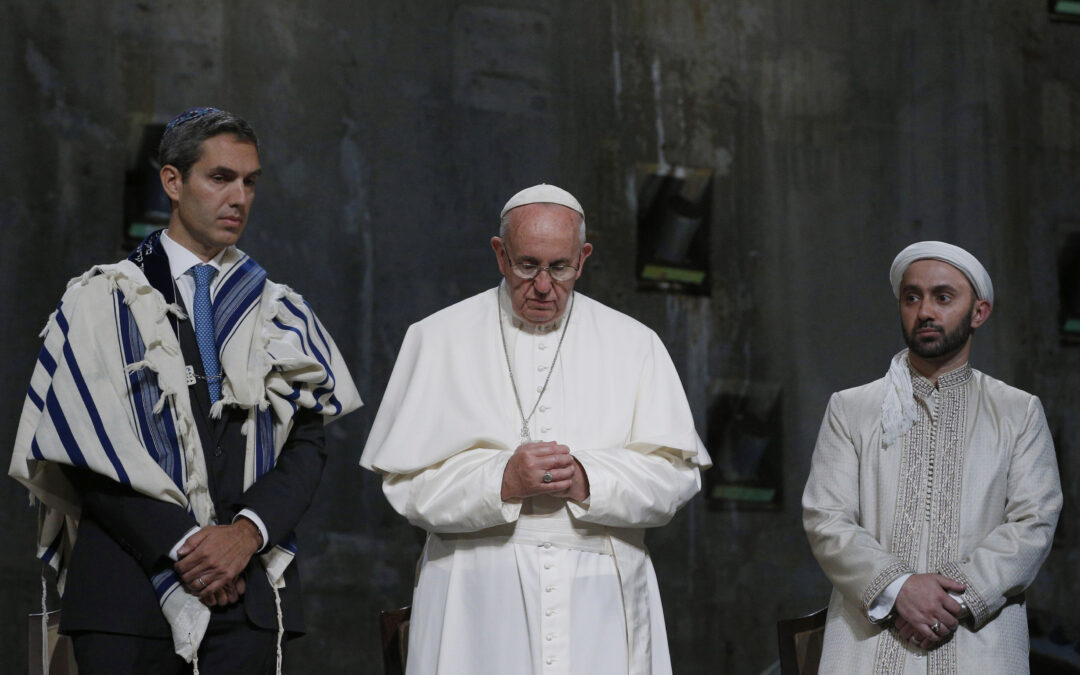
Oct 28, 2018 | Non categorizzato
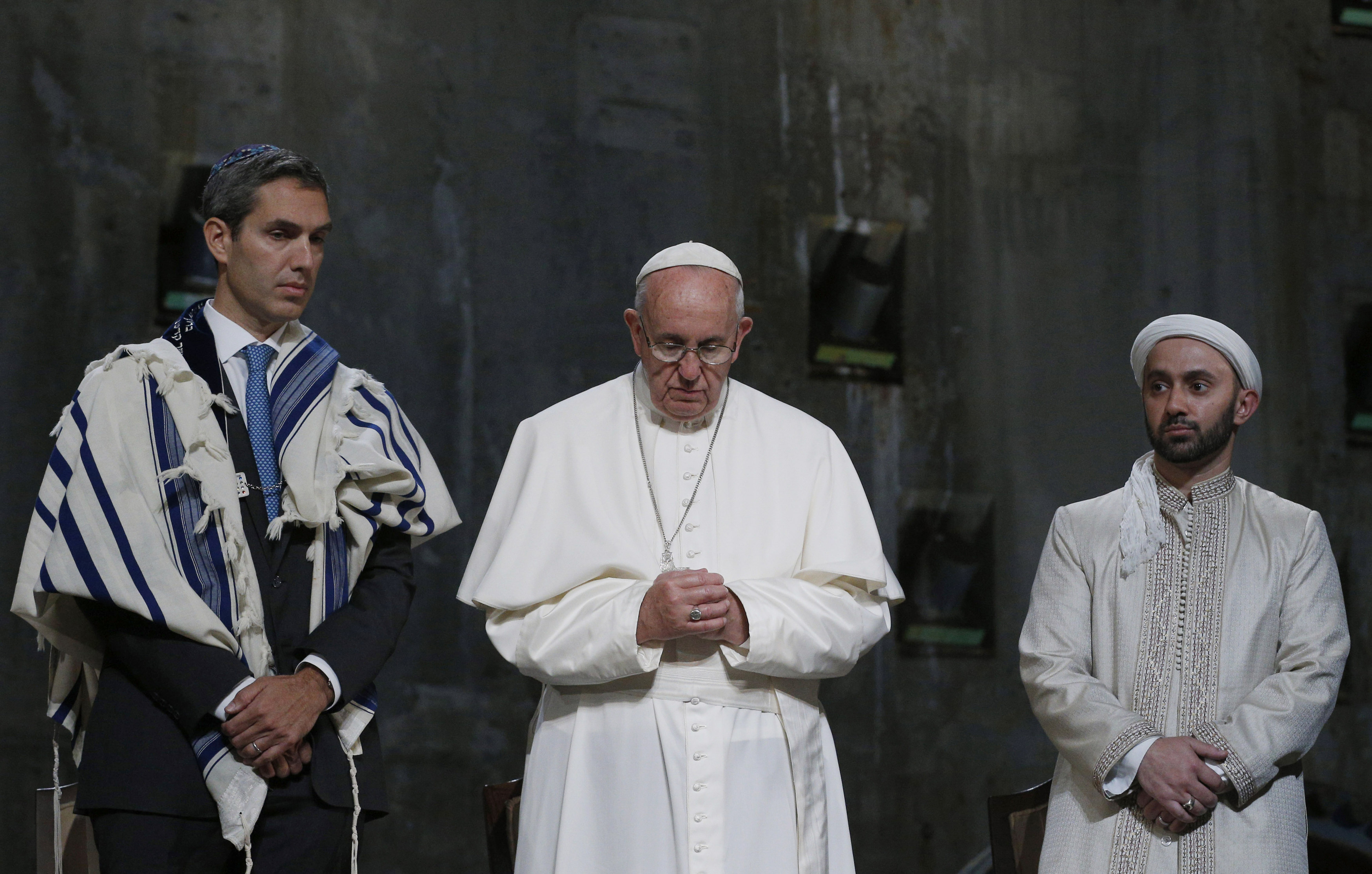 53 years have passed since, Pope Paul VI, 28 October 1965, signed the first historical “Declaration on the Relation of the Church to non-Christian religions,” known as Nostra Aetate (in our time). The Declaration affirms that “The Catholic Church rejects nothing of what is true and holy in these religions. She has a high regard for the manner of life and conduct, the precepts and doctrines, which, although differing in many ways from her own teaching, nevertheless often reflect a ray of that truth which enlightens all men.” But it also underlines that the Church “is duty bound to announce without fail that Christ is the “way, the truth and the life” (Jn 14,6), in him whom God reconciled all things to himself, men find the fullness of their religious life.” The Declaration urges all Christians “to enter with prudence and charity into discussion and collaboration with the members of other religions, while witnessing to their own faith and way of life, and acknowledge, preserve and encourage the spiritual and moral truths found among non-Christians and also their social life and culture.” Read the entire text
53 years have passed since, Pope Paul VI, 28 October 1965, signed the first historical “Declaration on the Relation of the Church to non-Christian religions,” known as Nostra Aetate (in our time). The Declaration affirms that “The Catholic Church rejects nothing of what is true and holy in these religions. She has a high regard for the manner of life and conduct, the precepts and doctrines, which, although differing in many ways from her own teaching, nevertheless often reflect a ray of that truth which enlightens all men.” But it also underlines that the Church “is duty bound to announce without fail that Christ is the “way, the truth and the life” (Jn 14,6), in him whom God reconciled all things to himself, men find the fullness of their religious life.” The Declaration urges all Christians “to enter with prudence and charity into discussion and collaboration with the members of other religions, while witnessing to their own faith and way of life, and acknowledge, preserve and encourage the spiritual and moral truths found among non-Christians and also their social life and culture.” Read the entire text
 Eli always accompanied the founder of the Focolare Movement on important encounters with the great dignitaries of our time: from Pope Paul VI to John Paul II, from Mother Teresa of Calcutta to Vaclav Havel and the Ecumenical Patriarch of Constantinople, Athenagoras I. Her testimony as a direct witness to these events is contained in the book Lo spartito scritto in Cielo. Cinquant’anni con Chiara Lubich (“The Score Written in Heaven. Fifty years with Chiara Lubich” (Città Nuova, 2012). Giulia Eli Folonari was the Director of the Chiara Lubich Centre since its foundation in July 2008, right up until 2014. This institute aims to be a custodian of the thought of Chiara Lubich, to assure its authenticity and to help spread her charism, as well as to preserve the history of the Focolare Movement through meetings, conferences and a dedicated website. The Centre ensures that the rich patrimony of paper-based archives and multimedia documents that the founder of the Opera di Maria left behind is made available to scholars and the public in general.
Eli always accompanied the founder of the Focolare Movement on important encounters with the great dignitaries of our time: from Pope Paul VI to John Paul II, from Mother Teresa of Calcutta to Vaclav Havel and the Ecumenical Patriarch of Constantinople, Athenagoras I. Her testimony as a direct witness to these events is contained in the book Lo spartito scritto in Cielo. Cinquant’anni con Chiara Lubich (“The Score Written in Heaven. Fifty years with Chiara Lubich” (Città Nuova, 2012). Giulia Eli Folonari was the Director of the Chiara Lubich Centre since its foundation in July 2008, right up until 2014. This institute aims to be a custodian of the thought of Chiara Lubich, to assure its authenticity and to help spread her charism, as well as to preserve the history of the Focolare Movement through meetings, conferences and a dedicated website. The Centre ensures that the rich patrimony of paper-based archives and multimedia documents that the founder of the Opera di Maria left behind is made available to scholars and the public in general. 
 During the conference, what points in common and what areas for future development in the legal field did you cover? Pasquale De Rosa –We have in common, above all, the shared commitment to witness to our Christian life in our profession. For example in the lawyer-client relationship and in the various environments a Christian lawyer works: to be authentic witnesses to the “good news” which every Christian carries within. Our work proceeds alongside that of our own Churches. What we have to do, is to collaborate together, starting from what Chiara Lubich called the “dialogue of life”, putting in common our experiences as legal professionals. For example, a pressing concern is that of human rights and how they are under threat in the current world situation. How can Christian lawyers and legal professionals contribute to peace and harmony within their own societies, in today’s climate characterized by divisive ideas and praxis? Elisabetta Scomazzon – Every nation and people has its own order and rules. The Law can actually be an instrument of communion which helps to find solutions to the urgent demands of our planet and to the cry of humanity subjected to injustice, exploitation and war. Christians of different churches finding solutions in the legal field does not need to be an utopian idea, but could be a great opportunity to give hope that unity is possible.
During the conference, what points in common and what areas for future development in the legal field did you cover? Pasquale De Rosa –We have in common, above all, the shared commitment to witness to our Christian life in our profession. For example in the lawyer-client relationship and in the various environments a Christian lawyer works: to be authentic witnesses to the “good news” which every Christian carries within. Our work proceeds alongside that of our own Churches. What we have to do, is to collaborate together, starting from what Chiara Lubich called the “dialogue of life”, putting in common our experiences as legal professionals. For example, a pressing concern is that of human rights and how they are under threat in the current world situation. How can Christian lawyers and legal professionals contribute to peace and harmony within their own societies, in today’s climate characterized by divisive ideas and praxis? Elisabetta Scomazzon – Every nation and people has its own order and rules. The Law can actually be an instrument of communion which helps to find solutions to the urgent demands of our planet and to the cry of humanity subjected to injustice, exploitation and war. Christians of different churches finding solutions in the legal field does not need to be an utopian idea, but could be a great opportunity to give hope that unity is possible. 

 Two meetings about
Two meetings about 



 It felt like living in a divine adventure. At the beginning, Chiara always used to say that she never intended to found a movement: the last thing on her mind was to draw up a schedule or an action plan. So what was it like to live beside her? It was like one long race to catch up with her. With Chiara, there was one surprise after another – all the work of the Spirit whose actions are always unpredictable. I am not going to say that there was a surprise every day every day but they often happened. God led her to discover a new “reality” through circumstances, an act of love or a meeting (…) Every meeting had a meaning. She felt that the people she met were waiting for something and she used to tell us this. “Let’s begin to dialogue with these people, let’s do something for them.” Her ideal was ut omnes unum sint (Jn.17:21), the fulfilment of Jesus’ testament. The whole world, beginning with the people closest to us, was contained in that “may they all be one.” What is your life like now after Chiara’s death?
It felt like living in a divine adventure. At the beginning, Chiara always used to say that she never intended to found a movement: the last thing on her mind was to draw up a schedule or an action plan. So what was it like to live beside her? It was like one long race to catch up with her. With Chiara, there was one surprise after another – all the work of the Spirit whose actions are always unpredictable. I am not going to say that there was a surprise every day every day but they often happened. God led her to discover a new “reality” through circumstances, an act of love or a meeting (…) Every meeting had a meaning. She felt that the people she met were waiting for something and she used to tell us this. “Let’s begin to dialogue with these people, let’s do something for them.” Her ideal was ut omnes unum sint (Jn.17:21), the fulfilment of Jesus’ testament. The whole world, beginning with the people closest to us, was contained in that “may they all be one.” What is your life like now after Chiara’s death? 


 It was a historic event for the ecumenical path: “That same evening, many had gathered not far away in Ottmaring, seat of the ecumenical town of the Focolare. Chiara Lubich was there with other representatives of the movements, like Andrea Riccardi of
It was a historic event for the ecumenical path: “That same evening, many had gathered not far away in Ottmaring, seat of the ecumenical town of the Focolare. Chiara Lubich was there with other representatives of the movements, like Andrea Riccardi of 
 Communities and Associations intervened to recall together another Europe, that of the big hopes and promises that arise from the rich heritage of an ethnic, social and cultural multiplicity, and that tends toward communion and dialogue. The Prague event has thus become an important step in the history of
Communities and Associations intervened to recall together another Europe, that of the big hopes and promises that arise from the rich heritage of an ethnic, social and cultural multiplicity, and that tends toward communion and dialogue. The Prague event has thus become an important step in the history of 





 Just a few miles from El Diamante in the city of Acatzingo, which has suffered a wave of violence in past months, those watching were invited to roll
Just a few miles from El Diamante in the city of Acatzingo, which has suffered a wave of violence in past months, those watching were invited to roll 



 It was a lake so clear you could see the bottom and drink the water with your cupped hands from the canoe. It seemed the perfect world. Yet here and there a plastic bottle was stuck in the bank, held down by low roots. In that extraordinarily beautiful landscape, it was a punch in the eye. Alek’s story is rich with images such as this. He was among the four people who were part of a temporary Focolare at Whati, in
It was a lake so clear you could see the bottom and drink the water with your cupped hands from the canoe. It seemed the perfect world. Yet here and there a plastic bottle was stuck in the bank, held down by low roots. In that extraordinarily beautiful landscape, it was a punch in the eye. Alek’s story is rich with images such as this. He was among the four people who were part of a temporary Focolare at Whati, in  With the youth group, Alek and Fr. Alain organized the cleanup of a stretch of shoreline. “It was just a gesture,” he says, “yet afterwards we heard that one of the residents there brought this to the chief’s attention, and the cleanup has now become a regular activity throughout the year.” This too was a result of the temporary Focolare at Whati. Besides Alek (an Italian who lives in Birmingham, Alabama) and Fr. Alain (a priest from Montreal), the group was made up of Lioba from the Focolare of Vancouver and Ljubica from that of Toronto. The reason for their journey was a request from the bishop of Yellowknife, the capital of the Northwest Territories, to have a few people from the Focolare community come to the area (covering the costs) to give the residents, at least for one month of the year, the chance to come together spiritually and receive some training on Gospel living. At the same time, another group was having a similar experience at the village of Fort Resolution.
With the youth group, Alek and Fr. Alain organized the cleanup of a stretch of shoreline. “It was just a gesture,” he says, “yet afterwards we heard that one of the residents there brought this to the chief’s attention, and the cleanup has now become a regular activity throughout the year.” This too was a result of the temporary Focolare at Whati. Besides Alek (an Italian who lives in Birmingham, Alabama) and Fr. Alain (a priest from Montreal), the group was made up of Lioba from the Focolare of Vancouver and Ljubica from that of Toronto. The reason for their journey was a request from the bishop of Yellowknife, the capital of the Northwest Territories, to have a few people from the Focolare community come to the area (covering the costs) to give the residents, at least for one month of the year, the chance to come together spiritually and receive some training on Gospel living. At the same time, another group was having a similar experience at the village of Fort Resolution. 
 The people of that place are suffering from a difficult transition from tradition to modernity. “In the space of one generation,” Alek explains, “they found themselves entirely deprived of the roots that had been their deepest identity, perhaps for thousands of years. Those of my generation were born and lived in teepees, and speak Tlicho. Their grandchildren no longer speak the traditional language, use smartphones and are taken by consumerism and all its consequences, including alcohol and drugs. “Yet, the community is still driven by a simple, deep faith that is based on reading the Bible and the natural spirituality of its people, who are still sensitive to spiritual things. “For my part, it was a chance to meet face to face with some of these stories. With them I felt at home, perhaps as never before. I was also a way for them to be touched by God.”
The people of that place are suffering from a difficult transition from tradition to modernity. “In the space of one generation,” Alek explains, “they found themselves entirely deprived of the roots that had been their deepest identity, perhaps for thousands of years. Those of my generation were born and lived in teepees, and speak Tlicho. Their grandchildren no longer speak the traditional language, use smartphones and are taken by consumerism and all its consequences, including alcohol and drugs. “Yet, the community is still driven by a simple, deep faith that is based on reading the Bible and the natural spirituality of its people, who are still sensitive to spiritual things. “For my part, it was a chance to meet face to face with some of these stories. With them I felt at home, perhaps as never before. I was also a way for them to be touched by God.”
 Indifference and mistrust are often born from fear and from a lack of knowledge about one another. In order to face the growing tensions of identity that undermine society, there are many very fruitful opportunities for dialogue and spiritual sharing created by religious institutions and associations. This is the case of
Indifference and mistrust are often born from fear and from a lack of knowledge about one another. In order to face the growing tensions of identity that undermine society, there are many very fruitful opportunities for dialogue and spiritual sharing created by religious institutions and associations. This is the case of 
 «Universal brotherhood was also the project of people who were not motivated by religious motives, but simply by the desire to benefit humanity. The French Revolution’s motto: “liberty, equality, fraternity”, summarizes the great political project of modernity, a project which, in part, has been disregarded. While numerous countries have built democratic systems of government and have succeeded in achieving some degree of liberty and equality, the same cannot be said of fraternity which has been proclaimed more than it has been lived. But the one who brought fraternity as the essential gift to humanity was above all Jesus. In revealing the fatherhood of God, He broke down the walls which separate those who are “the same” from those who are “different”, friends from enemies. He loosened all people from the bonds that imprison them, from all forms of slavery and subordination, from every unjust relationship, thus carrying out an authentic existential, cultural and political revolution. (…) The instrument that Jesus offered to us in order to accomplish this universal fraternity was love, a great love, a new love, different from the one we usually know. In fact, He transplanted the way of loving of heaven here on earth. This love requires first of all that we love everyone, therefore, not only relatives and friends. It asks that we love the pleasant and the unpleasant, our fellow-countryman and the stranger, the European and the immigrant, those of our Church and of another, of our religion and of another. Today it asks the countries of Western Europe to love those of Central and Eastern Europe – and vice versa – and it asks everyone to be open to those of other continents. In the vision of its founders, in fact, Europe is a family of sister nations, not closed in itself, but open to a universal mission: Europe wants its unity to contribute, then, to the unity of the human family. This love asks that we love our enemies as well and that we forgive them if they have offended us. After the wars which stained our continent with blood, many Europeans were exemplary in loving their enemies and promoting reconciliation.
«Universal brotherhood was also the project of people who were not motivated by religious motives, but simply by the desire to benefit humanity. The French Revolution’s motto: “liberty, equality, fraternity”, summarizes the great political project of modernity, a project which, in part, has been disregarded. While numerous countries have built democratic systems of government and have succeeded in achieving some degree of liberty and equality, the same cannot be said of fraternity which has been proclaimed more than it has been lived. But the one who brought fraternity as the essential gift to humanity was above all Jesus. In revealing the fatherhood of God, He broke down the walls which separate those who are “the same” from those who are “different”, friends from enemies. He loosened all people from the bonds that imprison them, from all forms of slavery and subordination, from every unjust relationship, thus carrying out an authentic existential, cultural and political revolution. (…) The instrument that Jesus offered to us in order to accomplish this universal fraternity was love, a great love, a new love, different from the one we usually know. In fact, He transplanted the way of loving of heaven here on earth. This love requires first of all that we love everyone, therefore, not only relatives and friends. It asks that we love the pleasant and the unpleasant, our fellow-countryman and the stranger, the European and the immigrant, those of our Church and of another, of our religion and of another. Today it asks the countries of Western Europe to love those of Central and Eastern Europe – and vice versa – and it asks everyone to be open to those of other continents. In the vision of its founders, in fact, Europe is a family of sister nations, not closed in itself, but open to a universal mission: Europe wants its unity to contribute, then, to the unity of the human family. This love asks that we love our enemies as well and that we forgive them if they have offended us. After the wars which stained our continent with blood, many Europeans were exemplary in loving their enemies and promoting reconciliation.  Therefore, the love I am speaking of makes no distinctions and takes into consideration all those we meet in any moment, directly or indirectly: those who are next to us physically, but also those about whom we or others are speaking; those who will receive the work we do day by day, those we come to know about through the newspapers or television…. Because this is the way God our Father loves, making the sun rise on the bad and the good, and causing the rain to fall on the just and the unjust alike (cf Mt 5:45). (…) Furthermore, the love that Jesus brought is not an idealistic, sentimental love, made up of words. It is a concrete love. It needs to be expressed with deeds. And this is possible if we make ourselves all things to all people: sick with those who are sick; joyful with those who are joyful; worried, insecure, hungry, poor with others, feeling in ourselves what they feel and acting accordingly».
Therefore, the love I am speaking of makes no distinctions and takes into consideration all those we meet in any moment, directly or indirectly: those who are next to us physically, but also those about whom we or others are speaking; those who will receive the work we do day by day, those we come to know about through the newspapers or television…. Because this is the way God our Father loves, making the sun rise on the bad and the good, and causing the rain to fall on the just and the unjust alike (cf Mt 5:45). (…) Furthermore, the love that Jesus brought is not an idealistic, sentimental love, made up of words. It is a concrete love. It needs to be expressed with deeds. And this is possible if we make ourselves all things to all people: sick with those who are sick; joyful with those who are joyful; worried, insecure, hungry, poor with others, feeling in ourselves what they feel and acting accordingly». 







 With one of the fastest growing economies, India is a country which is racing toward constant improvement in life expectancy, literacy rates and health conditions. However, of the 1.2 billion inhabitants of the country, the conditions of those living in the poorest regions are still difficult. Despite its status as an economic power, mortal malnutrition persists. Every evening in India, 200 million people try to fall asleep despite the gnawing hunger. And every day, 3,000 children die of hunger. In Mumbai, where thousands of people go for cancer treatments, Sunny of the Focolare community, wrote: “During the treatments, the families sleep on the road or around the hospital, in the lack of all necessities.” This is an alarming situation of poverty, especially if compared with the data related to the growing waste of perfectly whole foodstuffs, thrown away at the end of wedding banquets, rites, and family parties. The country is one of the world’s main producers of foodstuff, but is likewise one in which a good part of these goods are wasted. Among the causes are also the shortage of transport and warehousing systems especially the “cold chain” system: according to estimates in 2017 of the Indian Ministry of Agriculture, the value of the losses connected to foodstuff wastes (not only in terms of farming goods and foodstuffs, but also in the use of water and energy) could range between 8 and 15 billion dollars yearly.
With one of the fastest growing economies, India is a country which is racing toward constant improvement in life expectancy, literacy rates and health conditions. However, of the 1.2 billion inhabitants of the country, the conditions of those living in the poorest regions are still difficult. Despite its status as an economic power, mortal malnutrition persists. Every evening in India, 200 million people try to fall asleep despite the gnawing hunger. And every day, 3,000 children die of hunger. In Mumbai, where thousands of people go for cancer treatments, Sunny of the Focolare community, wrote: “During the treatments, the families sleep on the road or around the hospital, in the lack of all necessities.” This is an alarming situation of poverty, especially if compared with the data related to the growing waste of perfectly whole foodstuffs, thrown away at the end of wedding banquets, rites, and family parties. The country is one of the world’s main producers of foodstuff, but is likewise one in which a good part of these goods are wasted. Among the causes are also the shortage of transport and warehousing systems especially the “cold chain” system: according to estimates in 2017 of the Indian Ministry of Agriculture, the value of the losses connected to foodstuff wastes (not only in terms of farming goods and foodstuffs, but also in the use of water and energy) could range between 8 and 15 billion dollars yearly. 


 The 40 bishops, who are friends of the Focolari and come
The 40 bishops, who are friends of the Focolari and come 

 It’s called “TST” (tempi senza tensioni, “Time Without Tensions”), a program aimed at balancing work and family life. It was produced by the Il Sentiero di Arianna social cooperative (“Arianna’s way”), which is part of the Economy of Communion, and received first prize in the fourth edition of Family Friendly Businesses that is put on by a forum of family associations in Lazio, Italy. The cooperative, which is part of the Consorzio Tassano Servizi Territoriali network, primarily works in the field of home assistance, education, school services and career support. The TST program produces a series of specific services for employees (dispute resolution, family help, counseling services, working remotely, telecommuting, flexible banking hours, informative actions for management, being a Jack of all trades, and pathways that help employees returning to work after a period of reconciliation). These have shown themselves to be highly effective in creating a positive workplace culture that is based on authentic relationships of collaboration and cooperation. Started in 1996 by nine young women, who for a year pooled the resources that they had earned and reinvested them in training and development, today Il Sentiero di Arianna counts more than 130 members, 85% of whom are women. The tightly knit initial group and the pioneers of the local coop, inspired by the values of the Economy of Communion project that
It’s called “TST” (tempi senza tensioni, “Time Without Tensions”), a program aimed at balancing work and family life. It was produced by the Il Sentiero di Arianna social cooperative (“Arianna’s way”), which is part of the Economy of Communion, and received first prize in the fourth edition of Family Friendly Businesses that is put on by a forum of family associations in Lazio, Italy. The cooperative, which is part of the Consorzio Tassano Servizi Territoriali network, primarily works in the field of home assistance, education, school services and career support. The TST program produces a series of specific services for employees (dispute resolution, family help, counseling services, working remotely, telecommuting, flexible banking hours, informative actions for management, being a Jack of all trades, and pathways that help employees returning to work after a period of reconciliation). These have shown themselves to be highly effective in creating a positive workplace culture that is based on authentic relationships of collaboration and cooperation. Started in 1996 by nine young women, who for a year pooled the resources that they had earned and reinvested them in training and development, today Il Sentiero di Arianna counts more than 130 members, 85% of whom are women. The tightly knit initial group and the pioneers of the local coop, inspired by the values of the Economy of Communion project that 
 “It is often to the youngest that the Lord reveals better solutions.” These are words from Saint Benedict in his “Rule.” These were also the words chosen by Pope Francis when he announced the
“It is often to the youngest that the Lord reveals better solutions.” These are words from Saint Benedict in his “Rule.” These were also the words chosen by Pope Francis when he announced the 

 53 years have passed since, Pope Paul VI, 28 October 1965, signed the first historical “Declaration on the Relation of the Church to non-Christian religions,” known as Nostra Aetate (in our time). The Declaration affirms that “The Catholic Church rejects nothing of what is true and holy in these religions. She has a high regard for the manner of life and conduct, the precepts and doctrines, which, although differing in many ways from her own teaching, nevertheless often reflect a ray of that truth which enlightens all men.” But it also underlines that the Church “is duty bound to announce without fail that Christ is the “way, the truth and the life” (Jn 14,6), in him whom God reconciled all things to himself, men find the fullness of their religious life.” The Declaration urges all Christians “to enter with prudence and charity into discussion and collaboration with the members of other religions, while witnessing to their own faith and way of life, and acknowledge, preserve and encourage the spiritual and moral truths found among non-Christians and also their social life and culture.”
53 years have passed since, Pope Paul VI, 28 October 1965, signed the first historical “Declaration on the Relation of the Church to non-Christian religions,” known as Nostra Aetate (in our time). The Declaration affirms that “The Catholic Church rejects nothing of what is true and holy in these religions. She has a high regard for the manner of life and conduct, the precepts and doctrines, which, although differing in many ways from her own teaching, nevertheless often reflect a ray of that truth which enlightens all men.” But it also underlines that the Church “is duty bound to announce without fail that Christ is the “way, the truth and the life” (Jn 14,6), in him whom God reconciled all things to himself, men find the fullness of their religious life.” The Declaration urges all Christians “to enter with prudence and charity into discussion and collaboration with the members of other religions, while witnessing to their own faith and way of life, and acknowledge, preserve and encourage the spiritual and moral truths found among non-Christians and also their social life and culture.”